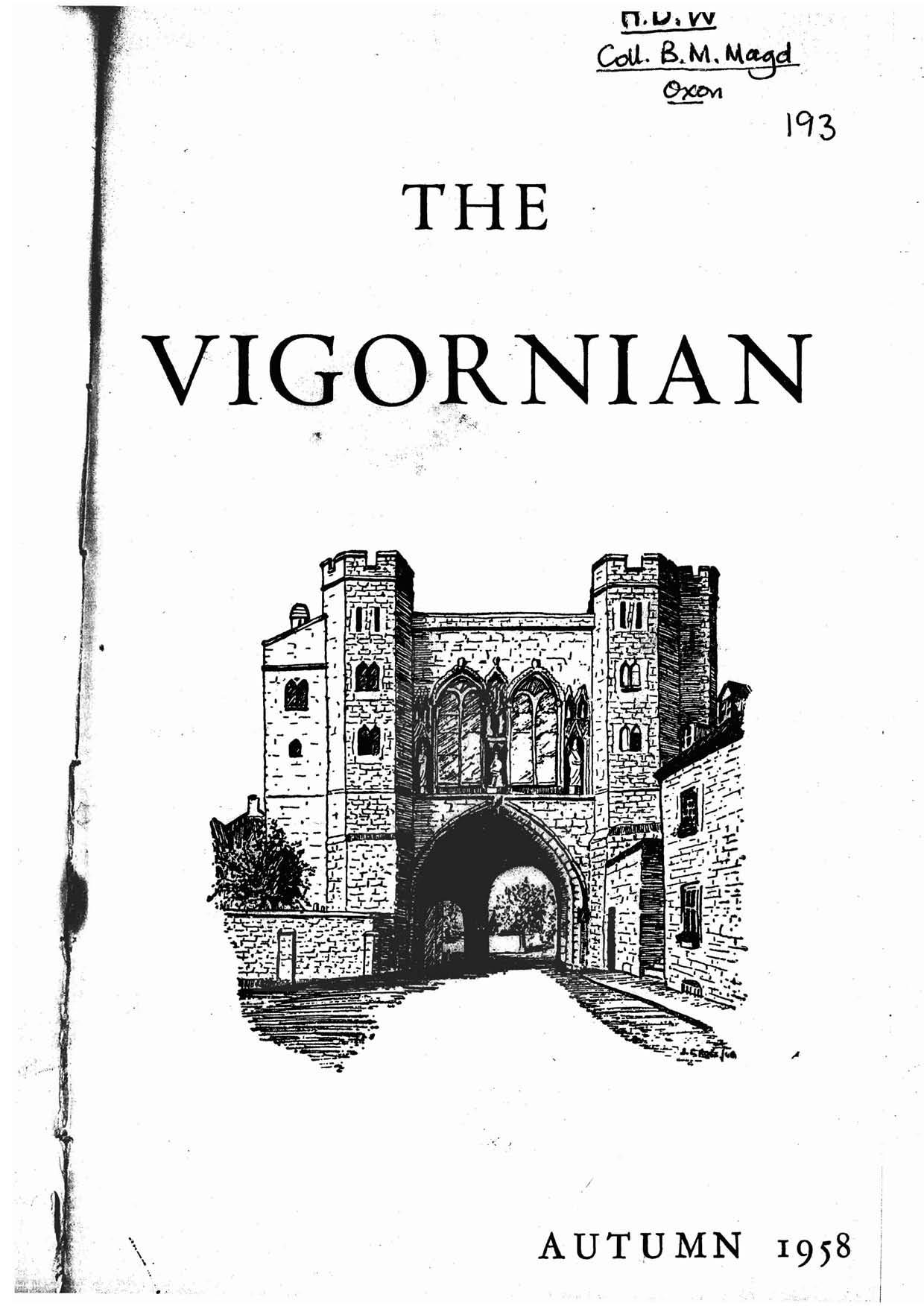

THE VIGORNIAN
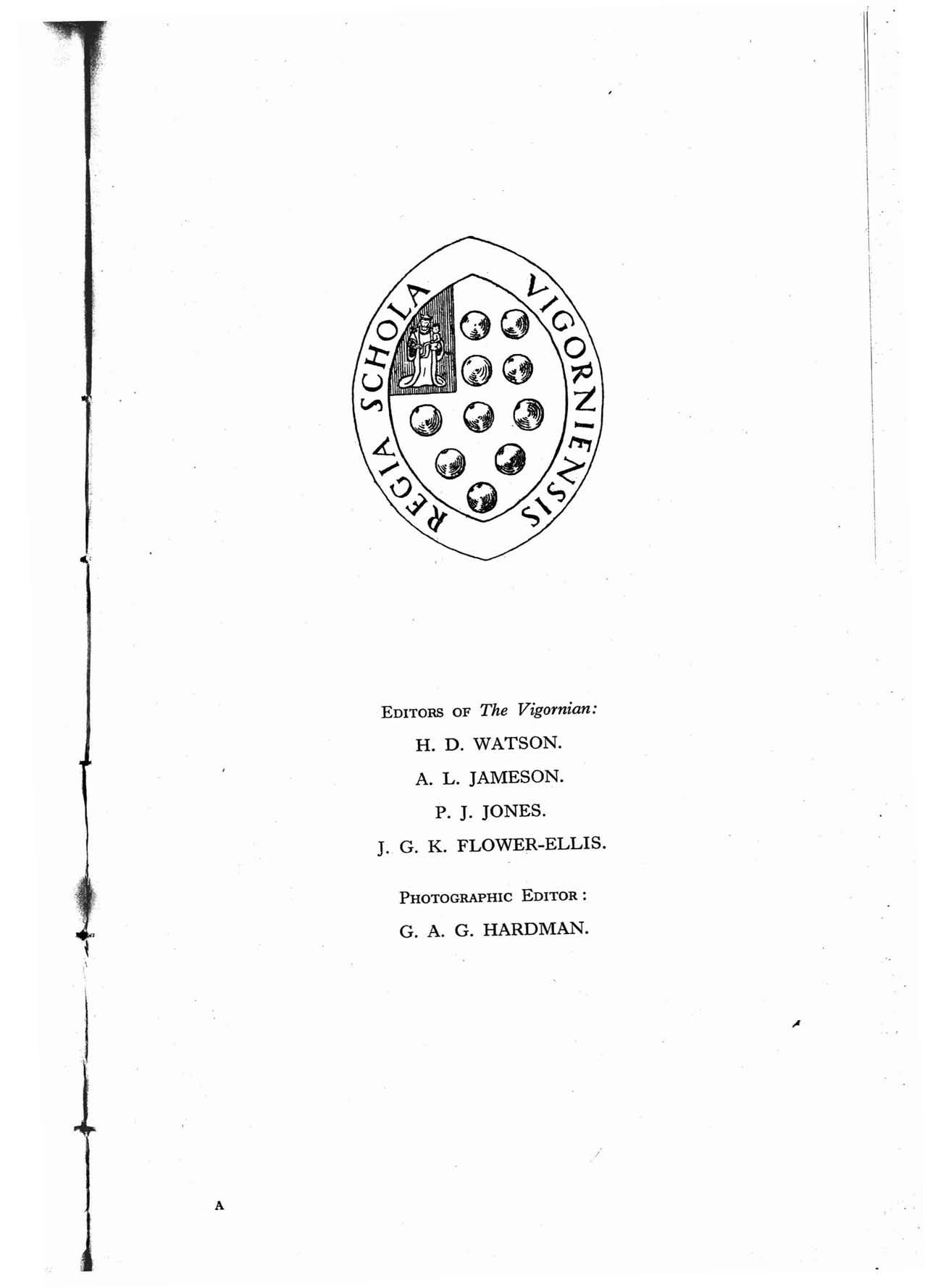
EDITORS OF The Vigornian:
H. D. WATSON.
A. L. JAMESON.
P. J. JONES.
J. G. K. FLOWER-ELLIS.
PHOTOGRAPHIC EDITOR:
G. A. G. HARDMAN.
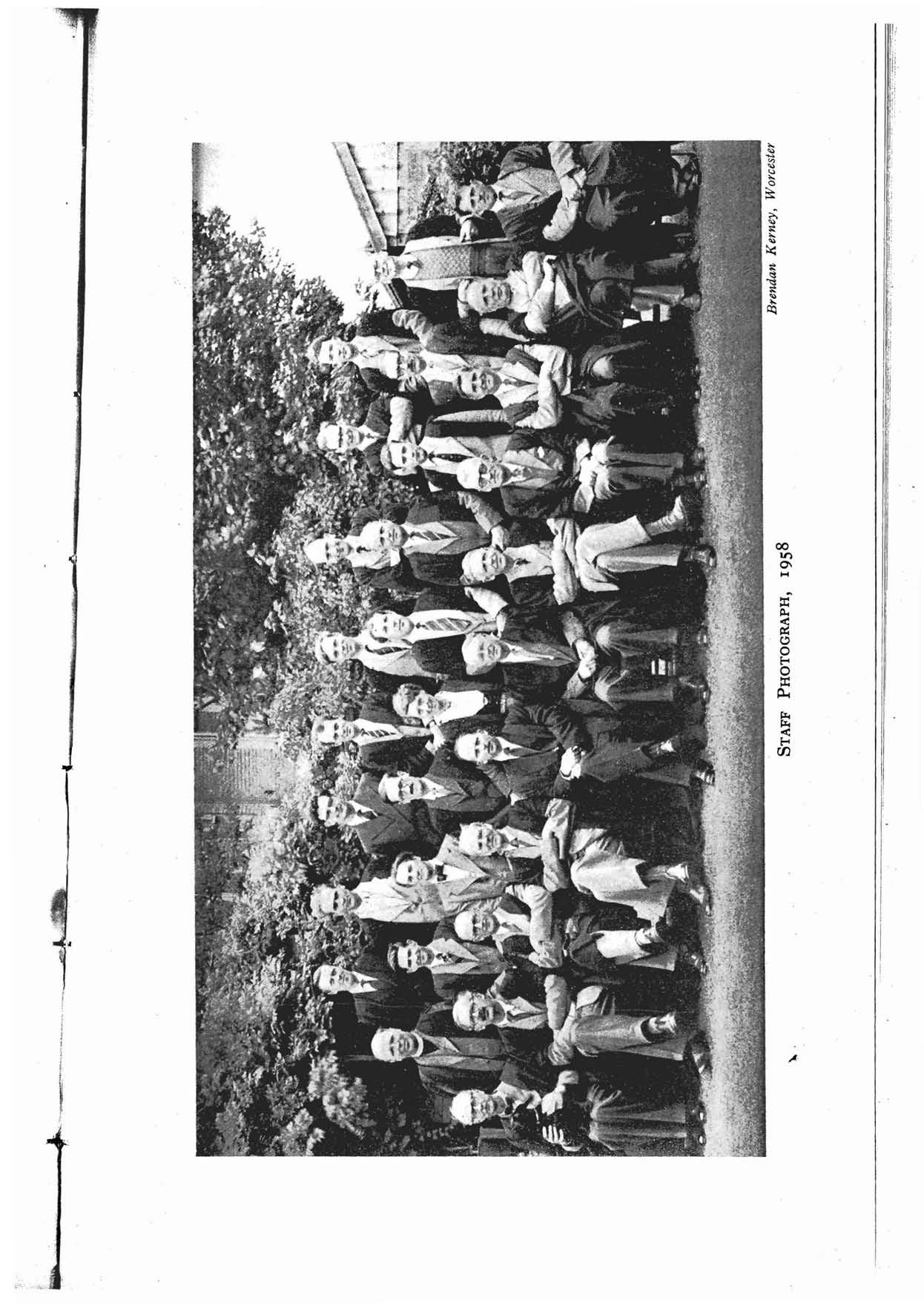
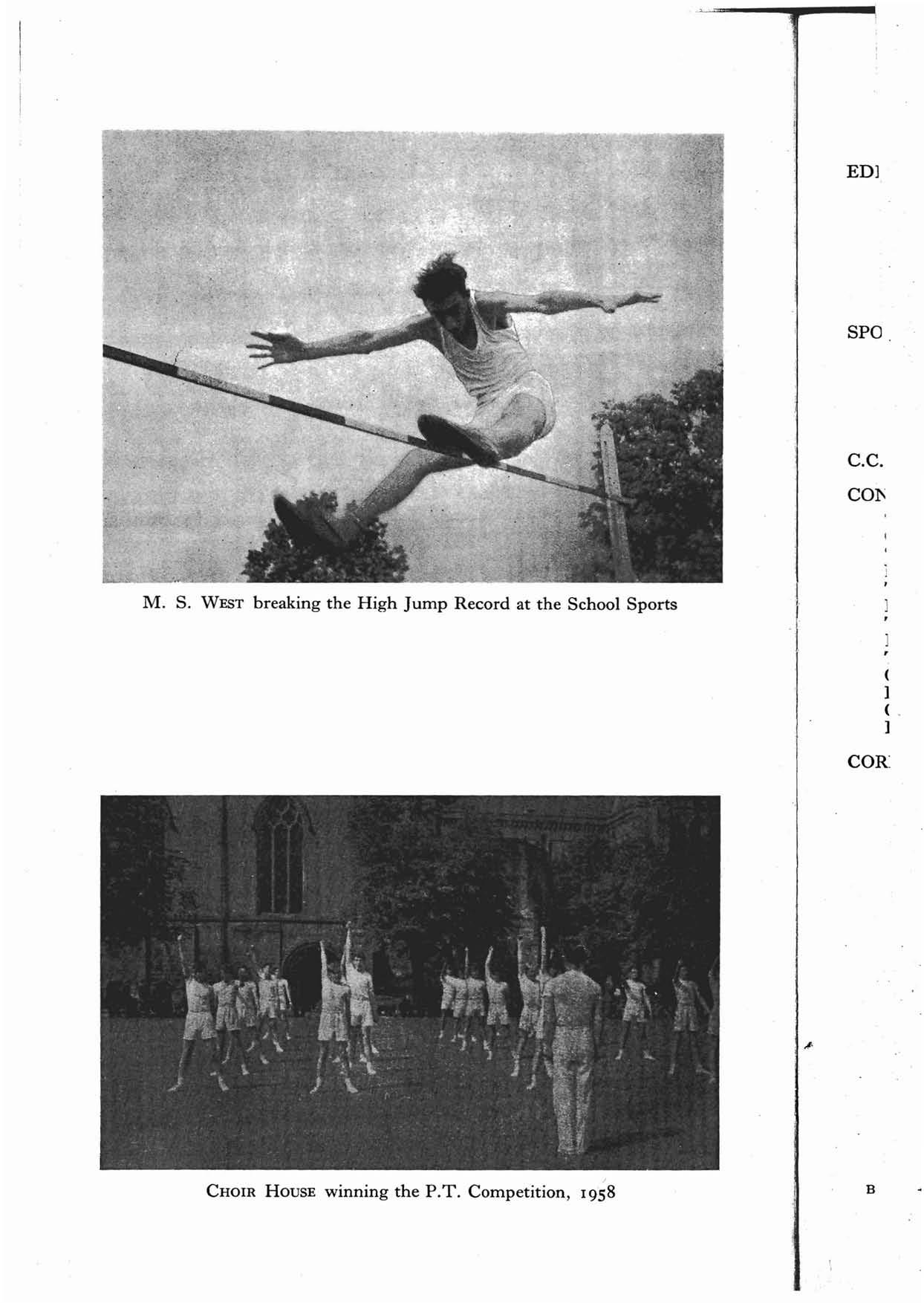
M. S. WEST breaking the High Jump Record at the School Sports
CHOIR HOUSE winning the P.T. Competition, 1958
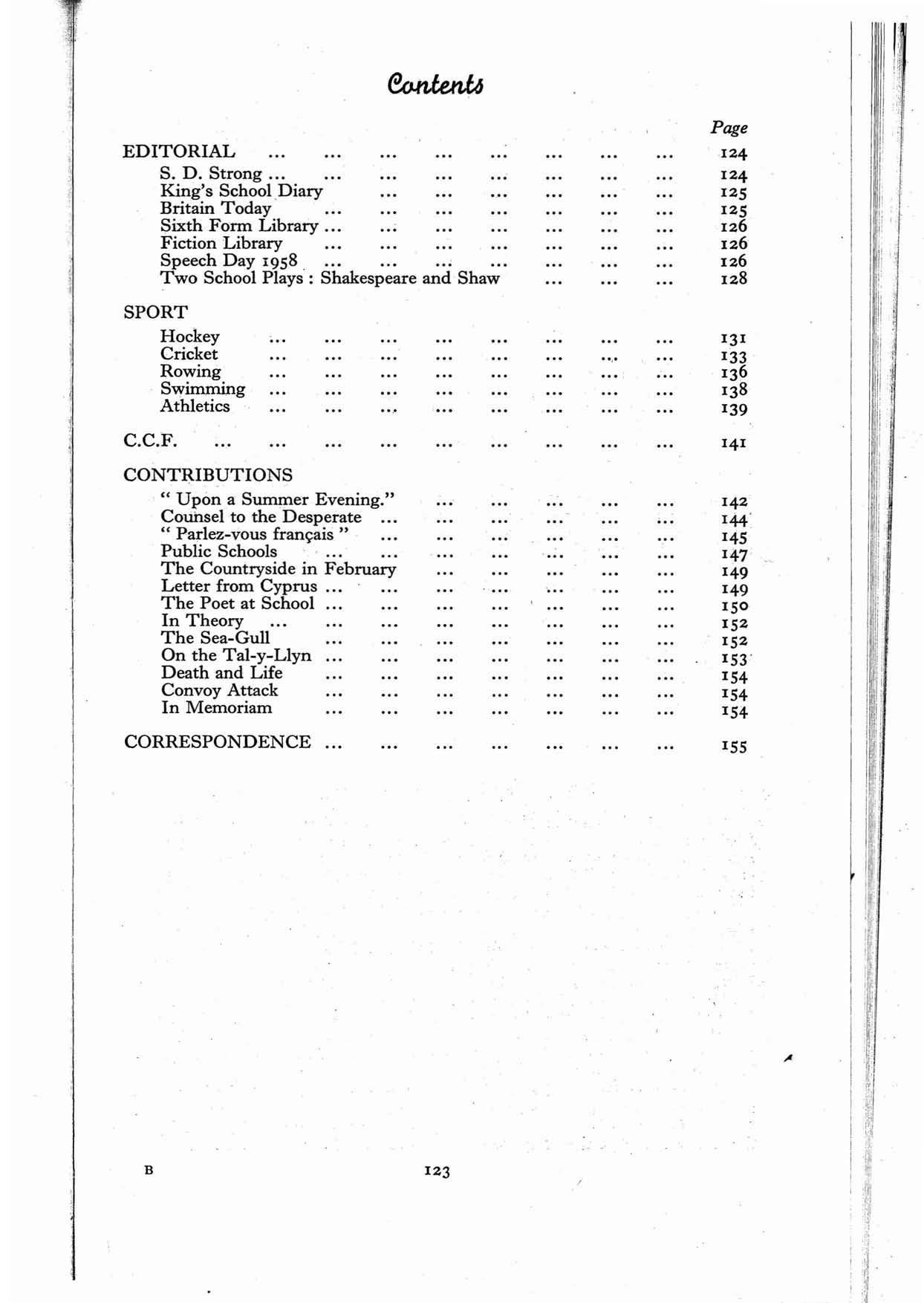
C.C.F.
CONTRIBUTIONS
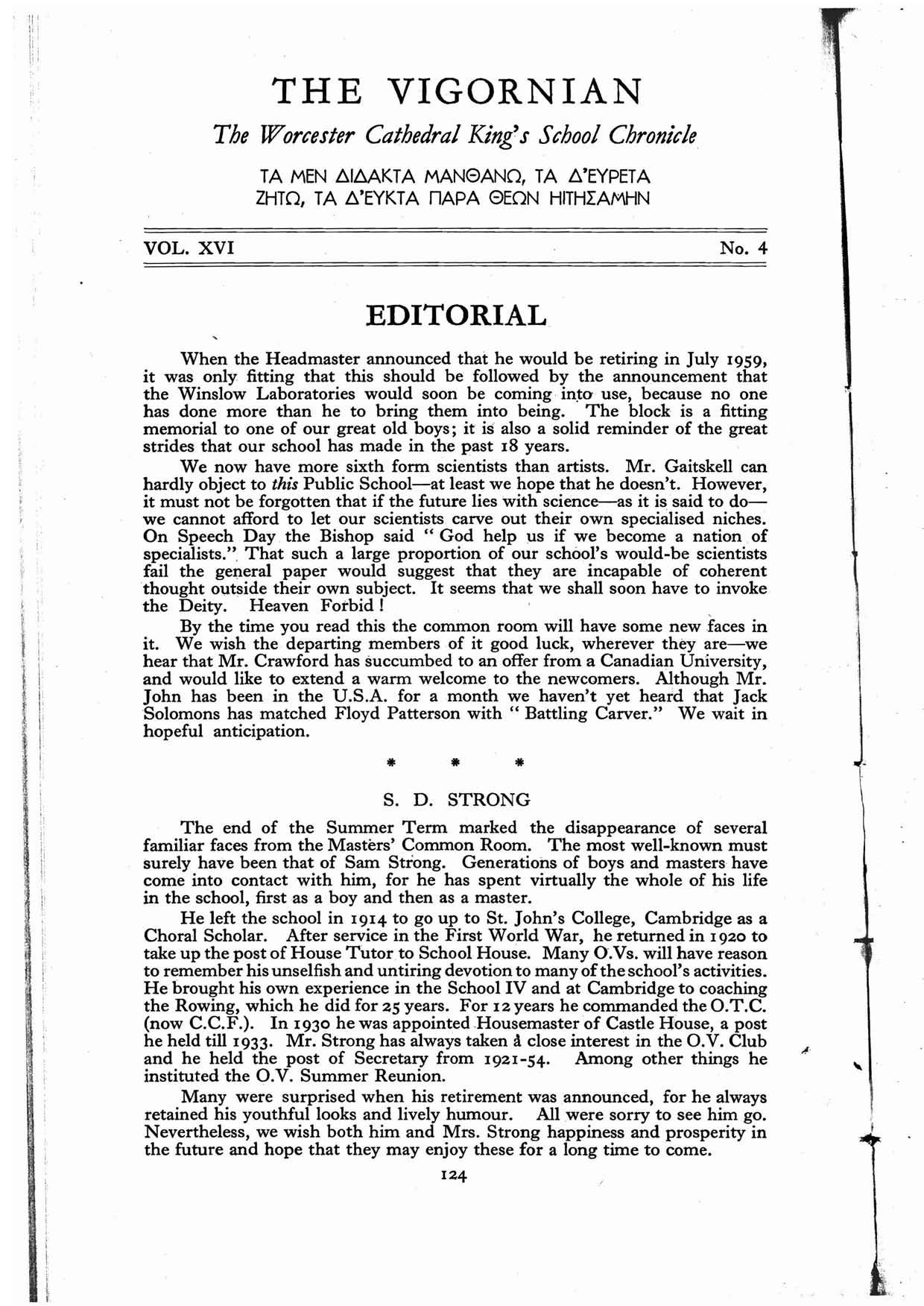
ITHE VIGORNIAN
The Worcester Cathedral King's School Chronicle
TA MEN MANGANO, TA ZHTO, TA nAPA GEON HITHIAMHN
VOL. XVI No. 4
EDITORIAL
When the Headmaster announced that he would be retiring in July 1959, it was only fitting that this should be followed by the announcement that the Winslow Laboratories would soon be coming use, because no one has done more than he to bring them into being. The block is a fitting memorial to one of our great old boys; it is also a solid reminder of the great strides that our school has made in the past 18 years.
We now have more sixth form scientists than artists. Mr. Gaitskell can hardly object to this Public School-at least we hope that he doesn't. However, it must not be forgotten that if the future lies with science-as it is said to dowe cannot afford to let our scientists carve out their own specialised niches. On Speech Day the Bishop said "God help :us if we become a nation of specialists." That such a large proportion of our school's would-be scientists fail the general paper would suggest that they are incapable of coherent thought outside their own subject. It seems that we shall soon have to invoke the Deity. Heaven Fotbid!
By the time you read this the common room will have some new faces in it. We wish the departing members of it good luck, wherever they are-we hear that Mr. Crawford has succumbed to an offer from a Canadian University, and would like to extend a warm welcome to the newcomers. Although Mr. John has been in the U.S.A. for a month we haven't yet heard that Jack Solomons has matched Floyd Patterson with" Battling Carver." We wait in hopeful anticipation.
S. D. STRONG
The end of the Summer Term marked the disappearance of several familiar faces from the Masters' Common Room. The most well-known must surely have been that of Sam Strong. Generations of boys and masters have come into contact with him, for he has spent virtually the whole of his life , in the school, first as a·boy and then as a master.
He left the school in 1914 to go up to St. John's College, Cambridge as a Choral Scholar. After service in the First World War, he returned in 1920 to take up the post of House Tutor to School House. Many O. Vs. will have reason to remember his unselfish and untiring devotion to many of the school's activities. He brought his own experience in the School IV and at Cambridge to coaching the Rowing, which he did for 25 years. For 12 years he commanded the O.T.C. (now C.C.F.). In 1930 he was appointed.Housemaster of Castle House, a post he held till 1933. Mr. Strong has always taken a close interest in the O.V. Club ;f.. and he held the post of Secretary from 1921-54. Among other things he instituted the O.V. Summer Reunion.
Many were surprised when his retirement was announced, for he always retained his youthful looks and lively humour. All were sorry to see him go. Nevertheless, we wish both him and Mrs. Strong happiness and prosperity in the future and hope that they may enjoy these for a long time to come.
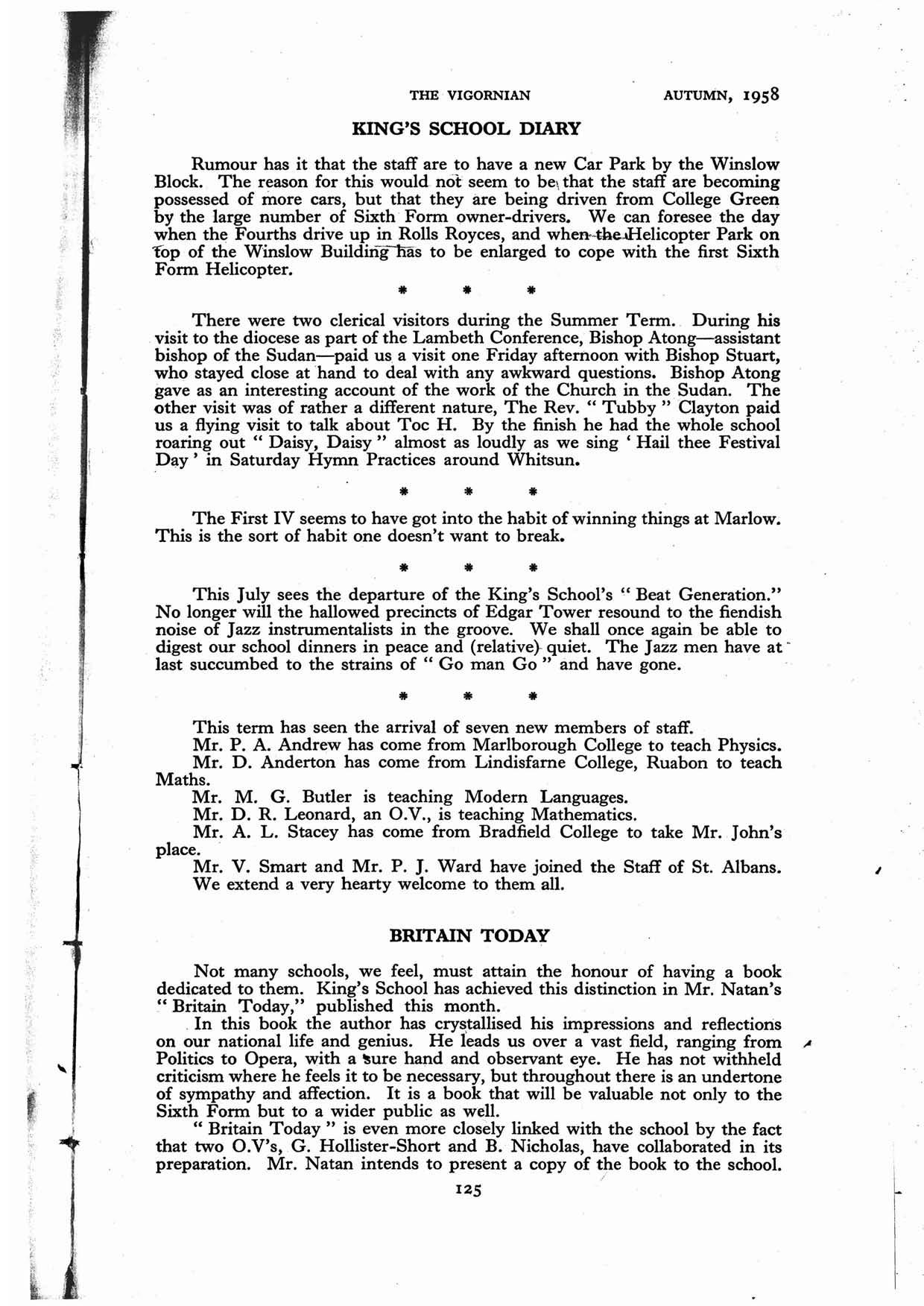
KING'S SCHOOL DIARY
Rumour has it that the staff are to have a new Car Park by the Winslow Block. The reason for this would not seem to bel that the staff are becoming possessed of more cars, but that they are being driven from College Green by the large number of Sixth Form owner-drivers. We can foresee the day when the Fourths drive up in Rolls Royces, and when--t-heilielicopter Park on lop of the Winslow Buildinglias to be enlarged to cope with the first Sixth Form Helicopter.
There were two clerical visitors during the Summer Term. During his visit to the diocese as part of the Lambeth Conference, Bishop Atong-assistant bishop of the Sudan-paid us a visit one Friday afternoon with Bishop Stuart, who stayed close at hand to deal with any awkward questions. Bishop Atong gave as an interesting account of the work of the Church in the. Sudan. The other visit was of rather a different nature, The Rev. " Tubby" Clayton paid us a flying visit to talk about Toe H. By the finish he had the whole school roaring out" Daisy, Daisy" almost as loudly as we sing' Hail thee Festival Day' in Saturday Hymn Practices around Whitsun
The First IV seems to have got into the habit of winning things at This is the sort of habit one doesn't want to break•
This July sees the departure of the King's School's " Beat Generation." No longer will the hallowed precincts of Edgar Tower resound to the fiendish noise of Jazz instrumentalists in the groove. We shall once again be able to digest our school dinners in peace and (relative)- quiet. The Jazz men have at· last succumbed to the strains of " Go man Go" and have gone .
This term has seen the arrival of seven new members of staff.
Mr. P. A. Andrew has come from Marlborough College to teach Physics.
Mr. D. Anderton has come from Lindisfarne College, Ruabon to teach Maths.
Mr. M. G. Butler is teaching Modem Languages.
Mr. D. R. Leonard, an O.V., is teaching Mathematics.
Mr. A. L. Stacey has come from Bradfield College to take Mr. John's place.
Mr. V. Smart and Mr. P. J. Ward have joined the Staff of St. Albans. We extend a very hearty welcome to them all.
BRITAIN TODAY
Not many schools, we feel, must attain the honour of having a book dedicated to them. King's School has achieved this distinction in Mr. Natan's "Britain Today," published this month
. In this book the author has his impressions and reflections on our national life and genius. He leads us over a vast field, ranging from ,A Politics to Opera, with a hand and observant eye. He has not withheld criticism where he feels it to be necessary, but throughout there is an undertone of sympathy and affection. It is a book that will be valuable not only to the Sixth Form but to a wider public as well.
" Britain Today" is even more closely linked with the school by the fact that two O.V's, G. Hollister-Short and B. Nicholas, have collaborated in its preparation. Mr. Natan intends to present a copy of the book to the school.
1958
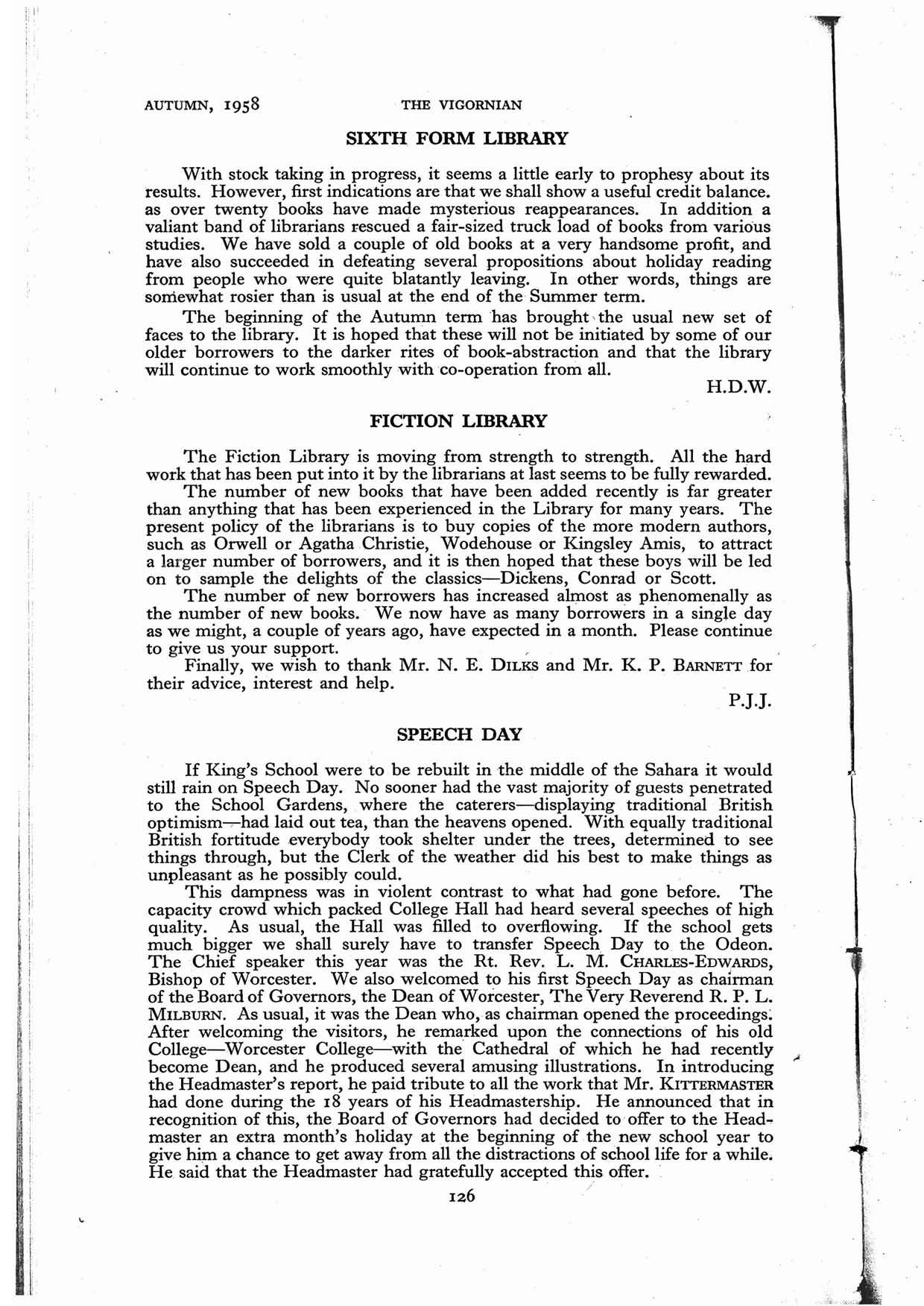
THE VmORNIAN
SIXTH, FORM LIBRARY
With stock taking in progress, it seems a little early to prophesy about its results. However, first indications are that we shall show a useful credit balance. as over twenty books have made mysterious reappearances. In addition a valiant band of librarians rescued a fair-sized truck load of books from various studies. We have sold a couple of old books at a very handsome profit, and have also succeeded in defeating several propositions about holiday reading from people who were quite blatantly leaving. In other words, things are somewhat rosier than is usual at the end of the Summer term.
The beginning of the Autumn term has brought, the usual new set of faces to the library. It is hoped that these will not be initiated by some of our older borrowers to the darker rites of book-abstraction and that the library will continue to work smoothly with co-operation from all. H.D.W.
FICTION LIBRARY
The Fiction Library is moving from strength to strength. All the hard work that has been put into it by the librarians at last seems to be fully rewarded.
The number of new books that have been added recently is far greater than anything that has been experienced in the Library for many years. The present policy of the librarians is to buy copies of the more modern authors, such as Orwell or Agatha Christie, Wodehouse or Kingsley Amis, to attract a larger number of borrowers, and it is then hoped that these boys will be led on to sample the delights of the classics-Dickens, Conrad or Scott.
The number of new borrowers has increased almost as phenomenally as the number of new books. We now have as many borrowers in a single day as we might, a couple of years ago, have expected in a month. Please continue to give us your support.
< Finally, we wish to thank Mr. N. E. DILKS and Mr. K. P. BARNETT Jor their advice, interest and help.
SPEECH DAY
If King's School were to be rebuilt in the middle of the Sahara it would still rain on Speech Day. No sooner had the vast majority of guests penetrated to the School Gardens, where the caterers-displaying traditional British optimism-had laid out tea, than the heavens opened. With equally traditional British fortitude .everybody took shelter under the trees, determined to see things through, but the Clerk of the weather did his best to make things as unpleasant as he possibly could.
This dampness was in violent contrast to what had gone before. The capacity crowd which packed College Hall had heard several speeches of high quality. As usual, the Hall was filled to overflowing. If the school gets much bigger we shall surely have to transfer Speech, Day to. the Odeon. The Chief speaker this year was the Rt. Rev. L. M. CHARLES-EDWARDS, Bishop of Worcester. We also welcomed to his first Speech Day as chairman of the Board of Governors, the Dean of Worcester, The Very Reverend R. P. L. MILBURN. As usual, it was the Dean who,as chairman opened the proceedings: After welcoming the visitors, he remarked upon the connections of his old College-Worcester College-with the Cathedral of which he had recently become Dean, and he produced several amusing illustrations. In introducing the Headmaster's report, he paid tribute to all the work that Mr. KITTERMASTER had done during the 18 years of his Headmastership. He announced that in recognition of this, the Board of Governors had decided to offer to the Head.., master an extra month's holiday at. the beginning of the. new school year to give him a chance to get away from all the distractions of school life for a while. He said that the Headmaster had gratefully accepted this offer.
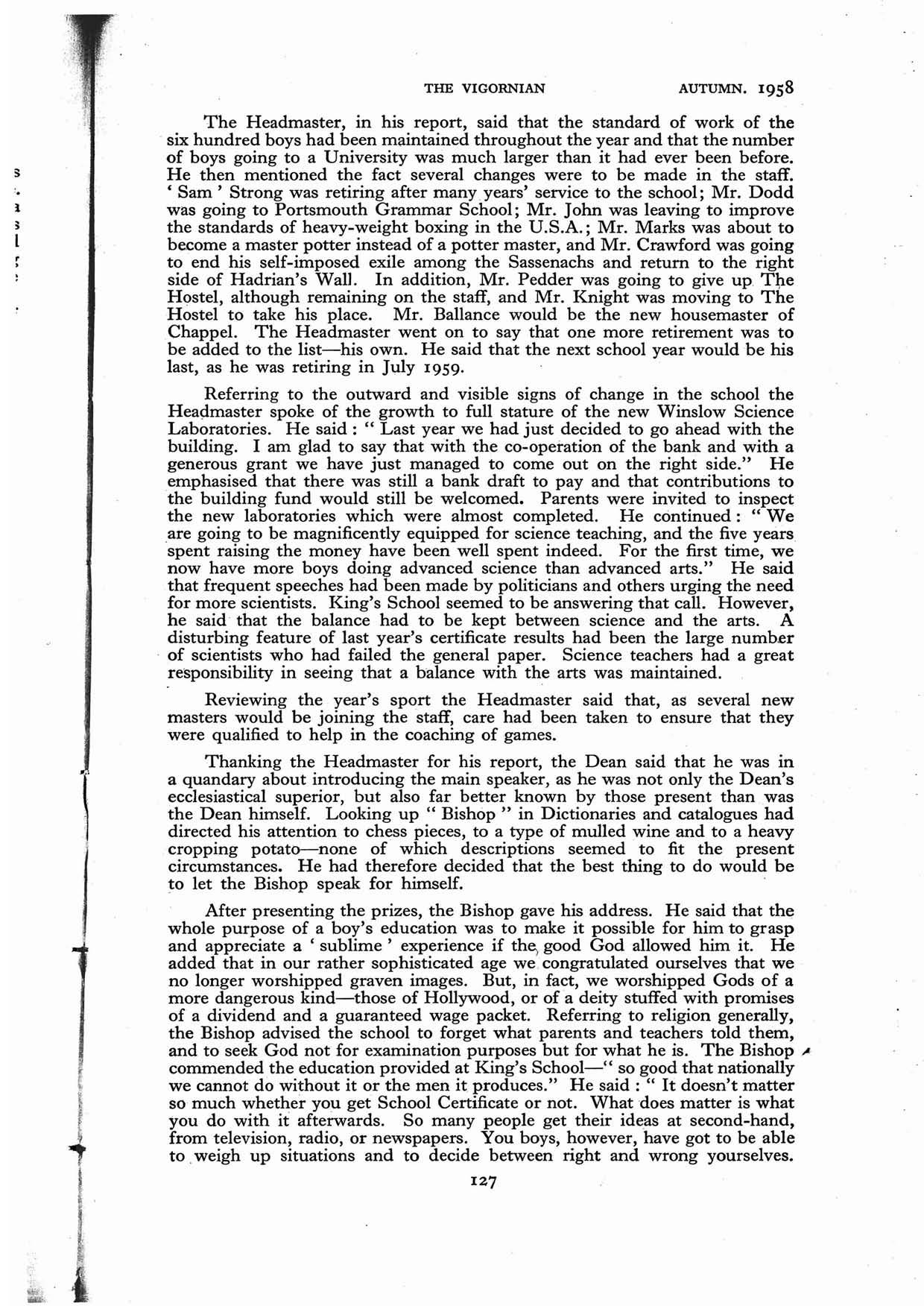
The Headmaster, in his report, said that the standard of work of the six hundred boys had been maintained throughout the year and that the number of boys going to a University was much larger than it had ever been before. He then mentioned the fact several changes were to be made in the staff. , Sam ' Strong was retiring after many years' service to the school; Mr. Dodd was going to Portsmouth Grammar School; Mr. John was leaving to improve the standards of heavy-weight boxing in the U.S.A.; Mr. Marks was about to become a master potter instead of a potter master, and Mr. Crawford was going to end his self-imposed exile among the Sassenachs and return to the right side of Hadrian's Wall. In addition, Mr. Pedder was going to give up Hostel, although remaining on the staff, and Mr. Knight was moving to The Hostel to take his place. Mr. Ballance would be the new housemaster of Chappel. The Headmaster went on to say that one more retirement was to be added to the list-his own. He said that the next school year would be his last, as he was retiring in July 1959.
Referring to the outward and visible signs of change in the school the Hea9,master spoke of the growth to full stature of the new Winslow Science Laboratories. He said: " Last year we had just decided to go ahead with the building. I am glad to say that with the co-operation of the bank and with a generous grant we have just managed to come out on the right side." He emphasised that there was still a bank draft to pay and that contributions to the building fund would still be welcomed. Parents were invited to inspect the new laboratories which were almost completed. He continued: "We are going to be magnificently equipped for science teaching, and the five years spent raising the money have been well spent indeed. For the first time, we now have more boys doing advanced science than advanced arts." He said that frequent speeches had been made by politicians and others urging the need for more scientists. King's School seemed to be answering that call. However, he said that the balance had to be kept between science and the arts. A disturbing feature of last year's certificate results had been the large number of scientists who had failed the general paper. Science teachers had a great responsibility in seeing that a balance with the arts was maintained.
Reviewing the year's sport the Headmaster said that, as several new masters would be joining the staff, care had been taken to ensure that they were qualified to help in the coaching of games.
Thanking the Headmaster for his report, the Dean said that he was in a quandary about introducing the main speaker, as he was not only the Dean's ecclesiastical superior, but also far better known by those present than was the Dean himself. Looking up " Bishop " in Dictionaries and catalogues had directed his attention to chess pieces, to a type of mulled wine and to a heavy cropping potatb-none of which descriptions seemed to fit the present circumstances. He had therefore decided that the best thing to do would be let the Bishop speak for himself.
After presenting the prizes, the Bishop gave his address. He said that the whole purpose of a boy's education was to make it possible for him to grasp and appreciate a ' sublime' experience if the; good God allowed him it. He added that in our rather sophisticated age we. congratulated ourselves that we no longer worshipped graven images. But, in fact, we worshipped Gods of a more dangerous kind-those of Hollywood, or of a deity stuffed with promises of a dividend and a guaranteed wage packet. Referring to religion generally, the Bishop advised the school to forget what parents and teachers told them, and to seek God not for examination purposes but for what he is. The Bishop commendedthe education provided at King's School-" so good that nationally we cannot do without it or the men it produces." He said: " It doesn't matter so much whether you get School Certificate or not. What does matter is what you do with it afterwards. So many people get their ideas at second-hand, from television, radio, or newspapers. You boys, however, have got to be able to '. weigh up situations and to decide between right and wrong yourselves.
127
AUTUMN,
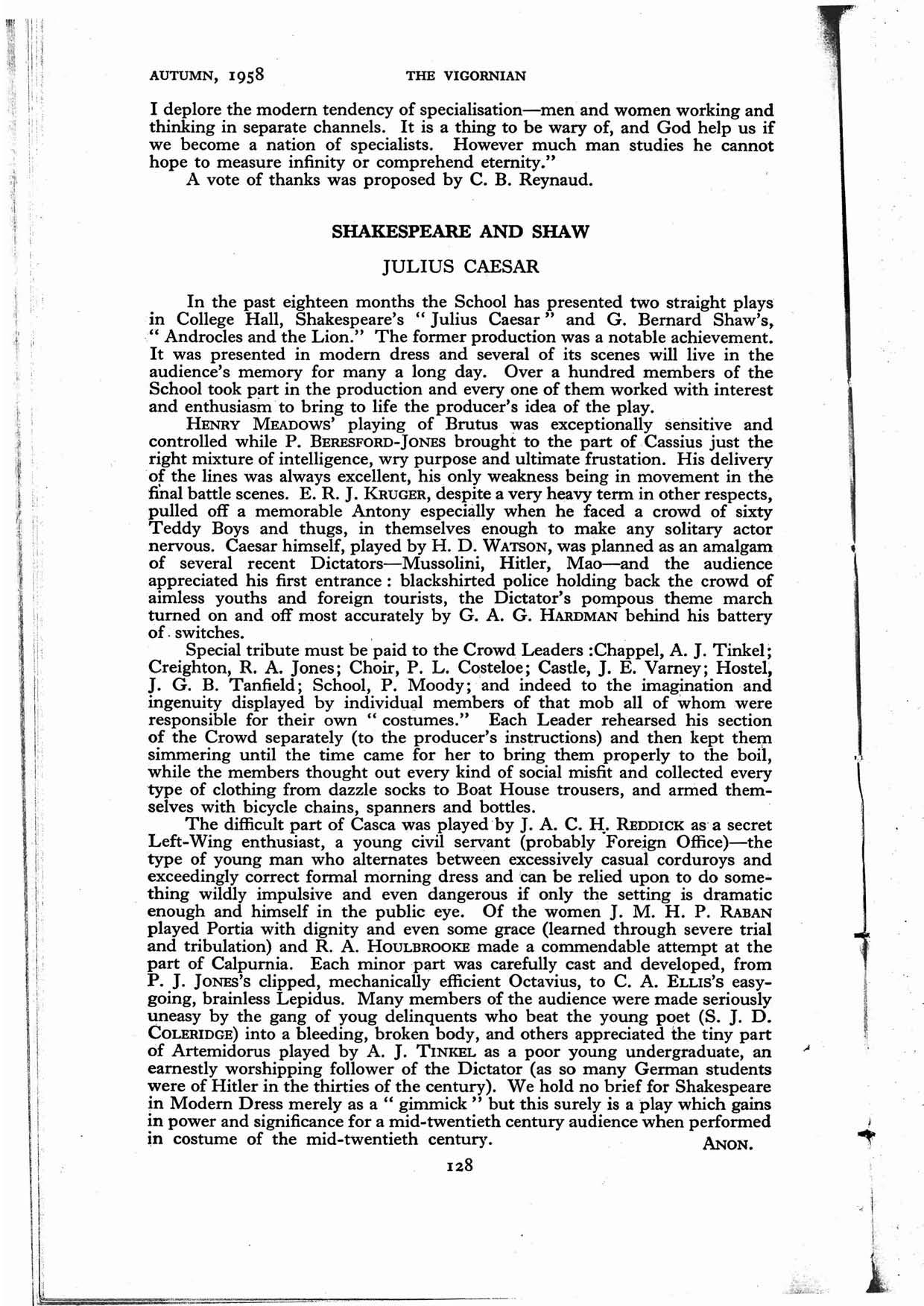
THE VIGORNIAN
I deplore the modern tendency of specialisation-men and women working and thinking in separate channels. It is a thing to be wary of, and God help us if we become a nation of specialists. However much man studies he cannot hope to measure infinity or comprehend eternity."
A vote of thanks was proposed by C. B. Reynaud.
SHAKESPEARE AND SHAW
JULIUS CAESAR
In the past eighteen months the School has presented two straight plays in College Hall, Shakespeare's "Julius Caesar" and G. Bernard Shaw's, " Androcles and the Lion." The former production was a notable achievement. It was presented in modern dress and several of its scenes will live in the audience's memory for many a long day. Over a hundred members of the School took part in the production and every one of them worked with interest and enthusiasm to bring to life the producer's idea of the play.
HENRY MEADOWS' playing of Brutus was exceptionally sensitive and controlled while P. BERESFORD-J ONES brought to the part of. Cassius just the right mixture of intelligence, wry purpose and ultimate frustation. His delivery of the lines was always excellent, his only weakness being in movement in the final battle scenes. E. R. J. KRUGER, despite a very heavy term in other respects, pulled off a memorable Antony especially when he faced a crowd of sixty Teddy Boys and thugs, in themselves enough to make any solitary actor nervous. Caesar himself, played by H. D. WATSON, was planned as an amalgam of several recent Dictators-Mussolini, Hitler, Mao-and the audience appreciated his first entrance: blackshirted police holding back the crowd of aimless youths and foreign tourists, the Dictator's pompous theme march turned on and off most accurately by G. A. G. HARDMAN behind his battery of. switches.
, Special tribute must be paid to the Crowd Leaders :Chappel, A. J. Tinkel; Creighton, R. A. Jones; Choir, P. L. CO,steloe; Castle, J. E. Vamey; Hostel, J. G. B. Tanfield; School, P. Moody; and indeed to the imagination and ingenuity displayed by members of that mob all of whom were responsible for their own" costumes." Each Leader rehearsed his section of the Crowd separately (to the producer's instructions) and then kept ther:n simmering until the time came for her to bring them properly to the boil, while the members thought out every kind of social misfit and collected every type of clothing from dazzle socks to Boat House trousers, and armed themselves with bicycle chains, spanners and bottles.
The difficult part of Casca was played by J. A. C. l{. REDDICK as a secret Left-Wing enthusiast, a young civil servant (probably Office)-the type of young man who alternates between excessively casual corduroys and exceedingly correct formal morning dress and ;can be relied upon to do some'" thing wildly impulsive and even dangerous if only the setting is dramatic enough and himself in the public eye. Of the women J. M. H. P. RABAN played Portia with dignity and even some grace (learned through severe trial and tribulation) and R. A. HOULBROOKE made a commendable attempt at the part of Calpurnia. Each minor part was carefully cast and developed, from P. J. JONES'S clipped, mechanically efficient Octavius, to C. A. ELLIS'S easygoing, brainless Lepidus. Many members of the audience were made seriously uneasy by the gang of youg delinquents who beat the young poet (S. J. D. COLERIDGE) into a bleeding, broken body, and others appreciated the tiny part of Artemidorus played by A. J. TINKEL as a poor young undergraduate, an earnestly worshipping follower of the Dictator (as. so many German students were of Hitler in the thirties of the century). We hold no brief for Shakespeare in Modem Dress merely as a " gimmick " but this surely is a play which gains in power and significance for a mid· twentieth century audience when performed in costume of the mid-twentieth century. ANON.
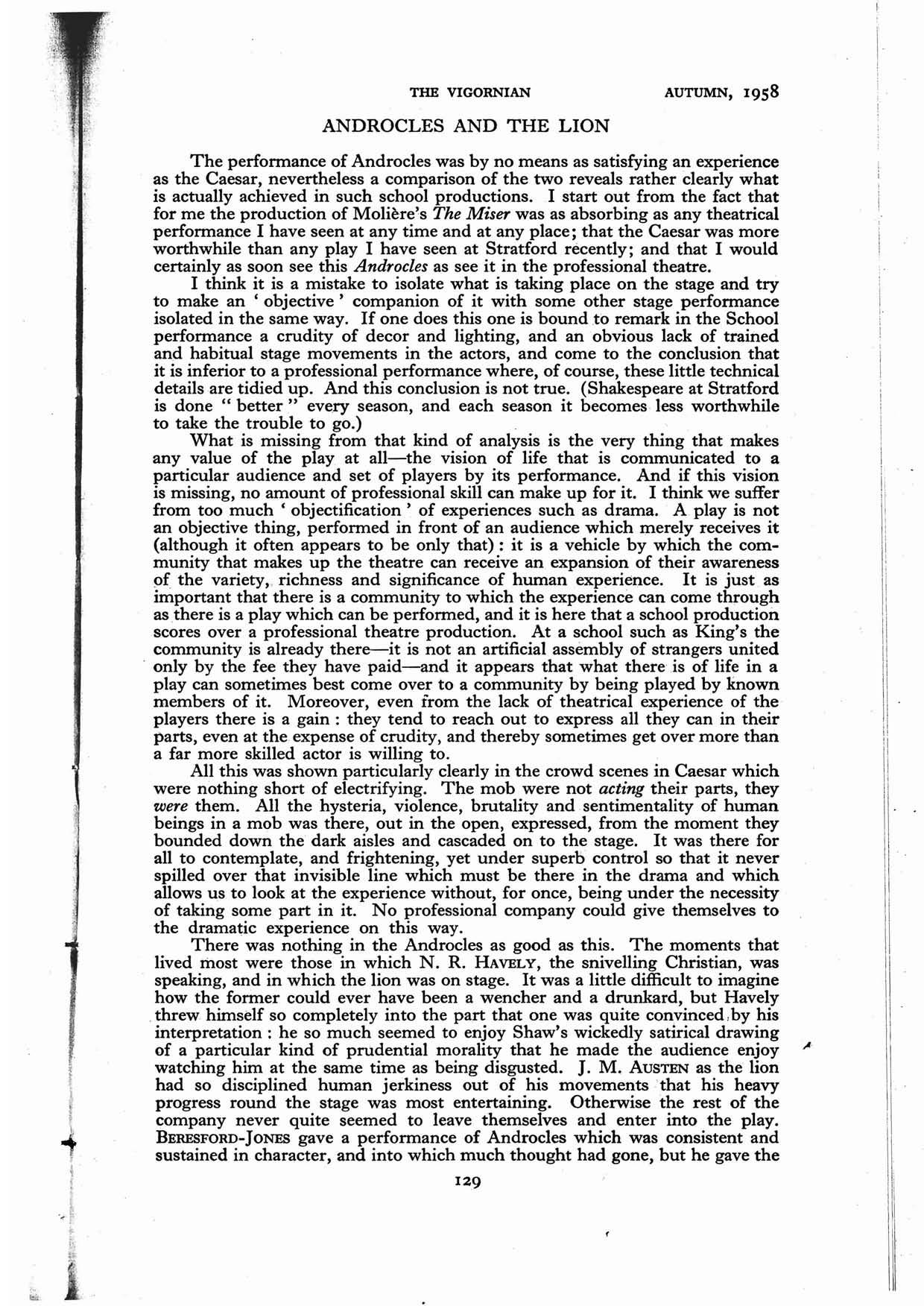
ANDROCLES AND THE LION
The perfonnance of Androcles was by no means as satisfying an experience as the Caesar, nevertheless a comparison of the two reveals rather clearly what is actually achieved in such school productions. J start out from the fact that for me the production of Moliere's The Miser was as absorbing as any theatrical perfonnance I have seen at any time and at any place; that the Caesar was more worthwhile than any play I have seen at Stratford recently; and that I would certainly as soon see this Androcles as see it in the professional theatre.
I think it is a mistake to isolate what is taking place on the stage and try to make an ' objective' companion of it with some other stage perfonnance isolated in the same way. If one does this one is bound to remark in the School perfonnance a crudity of decor and lighting, and an obvious lack of trained and habitual stage movements in the actors, and come to the conclusion that it is inferior to a professional perfonnance where, of course, these little technical details are tidied up. And this conclusion is not true. (Shakespeare at Stratford is done" better" every season, and each season it becomes less worthwhile to take the trouble to go.)
What is missing from that kind of analysis is the very thing that makes any value of the play at all-the vision of life that is communicated to a particular audience and set of players by its perfonnance. And if this vision is missing, no amount of professional skill can make up for it. I think we suffer from too much ' objectification ' of experiences such as drama. A play is not an objective thing, perfonned in front of an audience which merely receives it (although it often appears to be only that) : it is a vehicle by which the community that makes up the theatre can receive an expansion of their awareness pf the variety", richness and significance of human experience. It is just as important that there is a community to which the experience can come through as there is a play which can be perfonned, and it is here that a school production scores over a professional theatre production. At a school such as King's the community is already there-it is not an artificial assembly of strangers united , only by the fee they have paid-and it appears that what there is of life in a play can sometimes best come over to a community by being played by known members of it. Moreover, even from the lack of theatrical experience of the players there is a gain : they tend to reach out to express all they can in their parts, even at the expense of crudity, and thereby sometimes get over more than a far more skilled actor is willing to.
All this was shown particularly clearly in the crowd scenes in Caesar which were nothing short of electrifying. The mob were not acting their parts, they were them. All the hysteria, violence, brutality and sentimentality of human beings in a mob was there, out in the open, expressed, from the moment they bounded down the dark aisles and cascaded on to the stage. It was there for all to contemplate, and frightening, yet under superb control so that it never spilled over that invisible line which must be there in the drama and which allows us to look at the experience without, for once, being under the necessity of taking some part in it. No professional company could give themselves to the dramatic experience on this way.
There was nothing in the Androcles as good as this. The moments that lived most were those in which N. R. HAVELY, the snivelling Christian, was speaking, and in which the lion was on stage. It was a little difficult to imagine how the fonner could ever have been a wencher and a drunkard, but Havely ,threw himself so completely into the part that one was quite convinced,by his interpretation : he so much seemed to enjoy Shaw's wickedly satirical drawing of a particular kind of prudential morality that he made the audience enjoy watching him at the same time as being disgusted. J. M. AusTEN as the lion
had so disciplined human jerkiness out of his movements 'that his heavy progress round the stage was most entertaining. Otherwise the rest of the company never quite seemed to leave themselves and enter into the play.
BERESFORD-JONES gave a perfonnance of Androdes which was consistent and sustained in character, and into which much thought had gone, but he gave the
1958
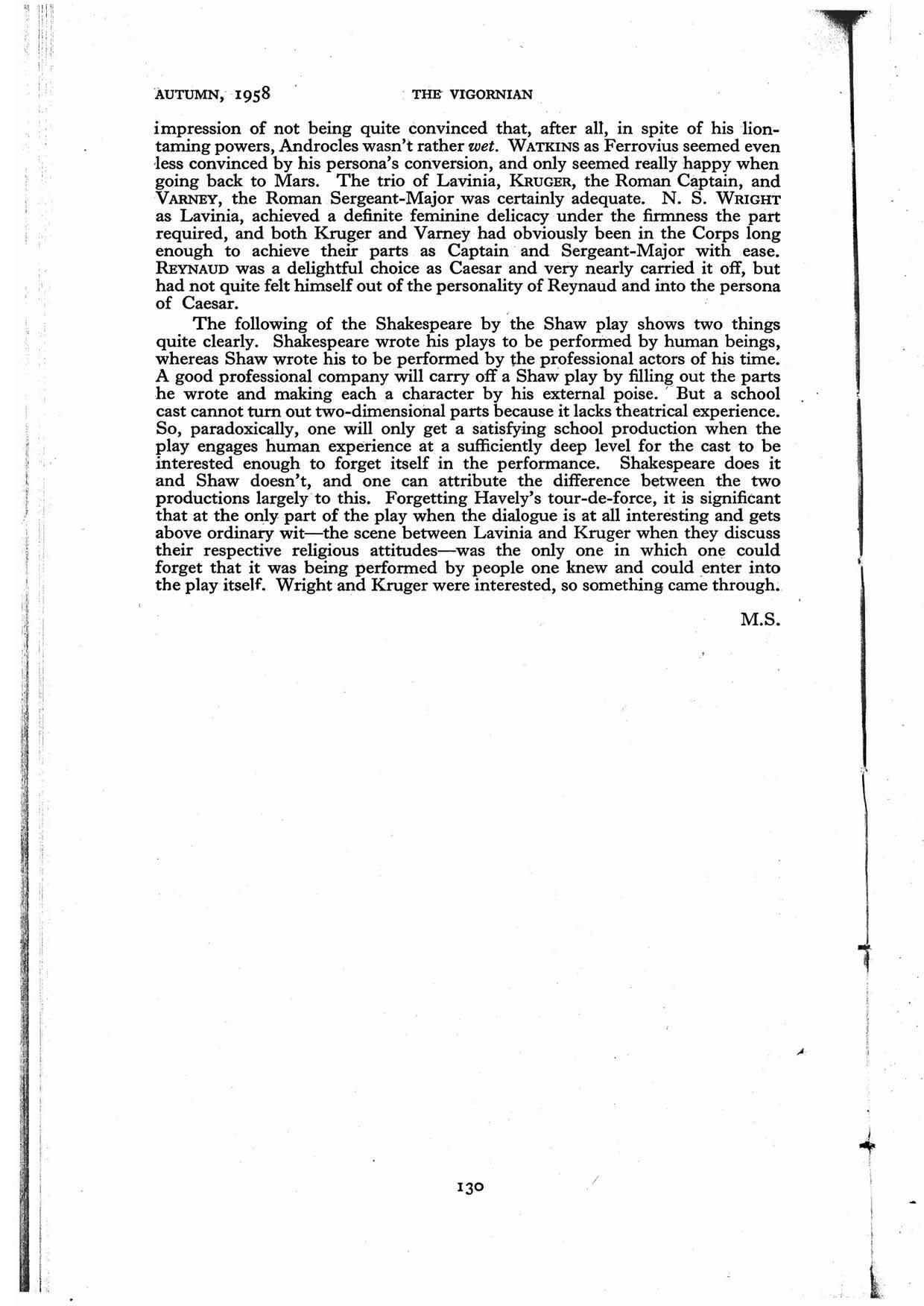
THE VIGORNIAN
impression of not being quite convinced that, after all, in spite of his liontaming powers, Androcles wasn't rather wet. WATKINS as Ferrovius seemed even less convinced by his persona's conversion, and only seemed really happy when going back to Mars. The trio of Lavinia, !{RUGER, the Roman Captain, and VARNEY, the Roman Sergeant-Major was certainly adequate. N. S. WRIGHT as Lavinia, achieved a definite feminine delicacy· under the firmness· the part required, and both Kruger and Varney had obviously been in the Corps long enough to achieve their parts as Captain· and Sergeant-Major with ease. REYNAUD was a delightful choice as Caesar and very nearly carried it off, but had not quite felt himself out of the personality of Reynaud and into the persona of Caesar.
The following of the Shakespeare by .the Shaw play shows two things quite clearly. Shakespeare wrote his plays to be performed by human beings, whereas Shaw wrote his to be performed by the professional actors of his time. A good professional company will carry· off a Shaw play by filling out the parts he wrote and making each a character by his external poise. ,. But a school cast cannot turn out two-dimensional parts because it lacks theatrical experience. So, paradoxically, one will only get a satisfying school production when the play engages human experience at a sufficiently deep level for the cast to be
interested enough to forget itself in the performance. Shakespeare does it and Shaw doesn't, and one can attribute the difference between the two
productions largely to this. Forgetting Havely's tour-de-force, it is significant that at the only part of the play when the dialogue is at all interesting and gets
above ordinary wit-the scene between Lavinia and Kruger when they discuss their respective religious attitudes-was the only one in which could forget that it was being performed by people one knew and could ,enter into the play itself. Wrightand Kruger were interested, so something came
M.S.
HOCKEY
SPRING TERM
FIRST XI RESULTS
v. Hanley Castle
v. Hartlebury
v. Solihull
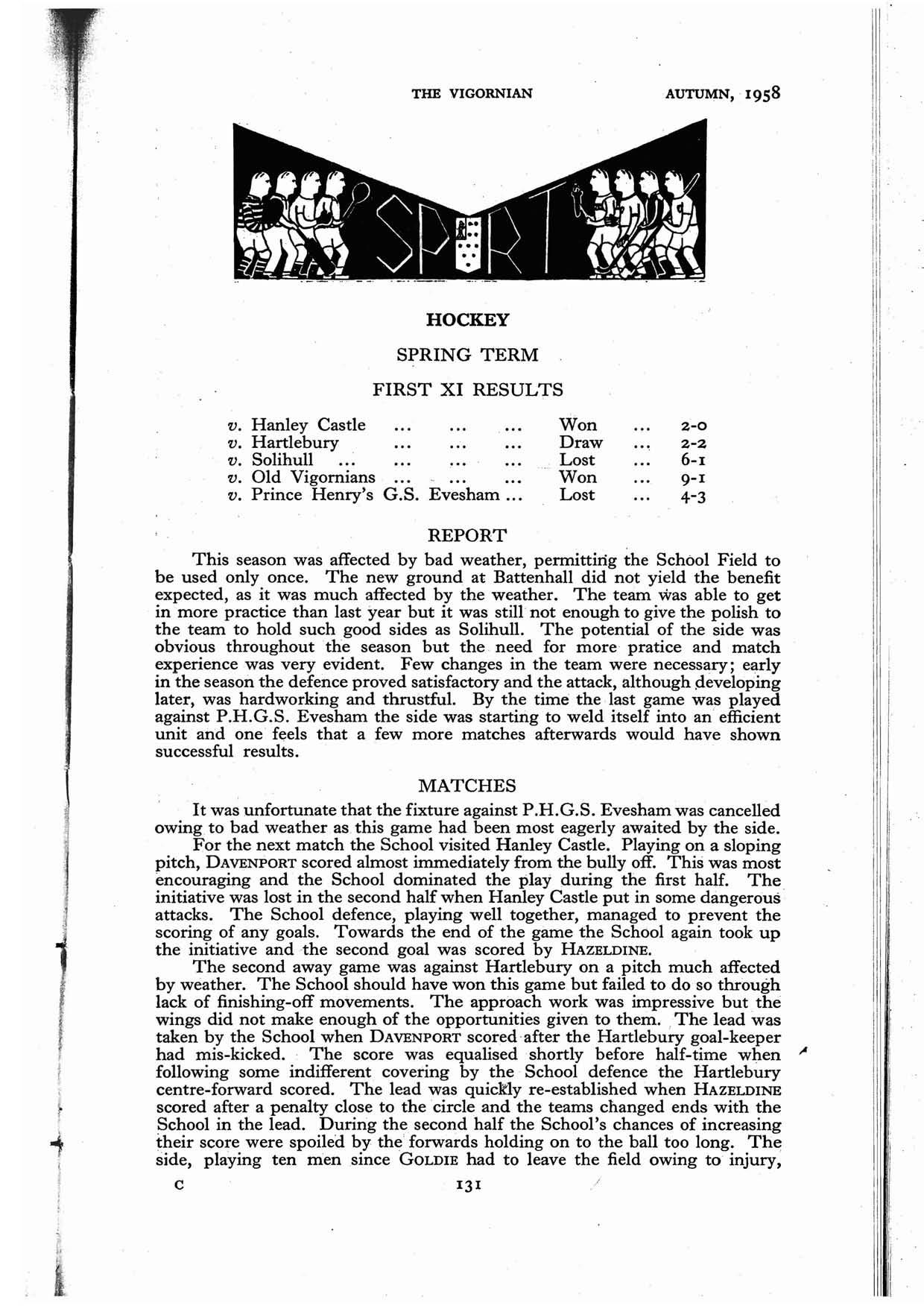
2-0
2-2
6-1 ....
v. Old Vigomians 9- 1
v. Prince Henry's G.S. Evesham ...
REPORT
4-3
This season was affected by bad weather, permitting the School Field to be used only once. The new ground at Battenhall did not yield the benefit expected, as it was much affected by the weather. The team was able to get in more practice than last year but it was still not enough to give the polish to the team to hold such good sides as Solihull. The potential of the side was obvious throughout the season but the. need for more pratice and match experience was very evident. Few changes in the team were necessary; early in the season the defence proved satisfactory and the attack, although later, was hardworking and thrustful. By the time the last game was played against P.H.G.S. Evesham the side was starting to weld itself into an efficient unit and one· feels that a few more matches afterwards would have shown successful results.·
MATCHES
It was unfortunate that the fixture against P.H.G.S. Evesham was cancelled owing to bad weather as this game had been most eagerly awaited by the side. For the next match the School visited Hanley Castle. Playing on a sloping pitch, DAVENPORT scored almost immediately from the bully off. This was most encouraging and the School dominated the play during the first half. The initiative was lost in the second half when Hariley Castle put in some dangerous· attacks. The School defence, playing well together, managed to prevent the scoring of any goals. Towards the end of the game the School again took up the initiative and the second goal was scored by HAZELDINE.
The second away game was against Hartlebury on a pitch much affected by weather. The School should have won this game but failed to do so through lack of finishing-off movements. The approach work was impressive but the wings did not make enough of the opportunities given to them. ,The lead was taken by the School when DAVENPORT scored after the Hartlebury goal-keeper
had mis-kicked. The score was equalised shortly before half-time when following some indifferent coveting by the School defence the Hartlebury centre-forward scored. The lead was quickly re-established when HAZELDINE scored after a penalty close to the circle and the teams changed ends with the School in the lead. During the second half the School's chances of increasing their score were spoiled by the forwards holding on to the ball too long. The side, playing ten men since GOLDIE had to leave the field owing to injury,
1958
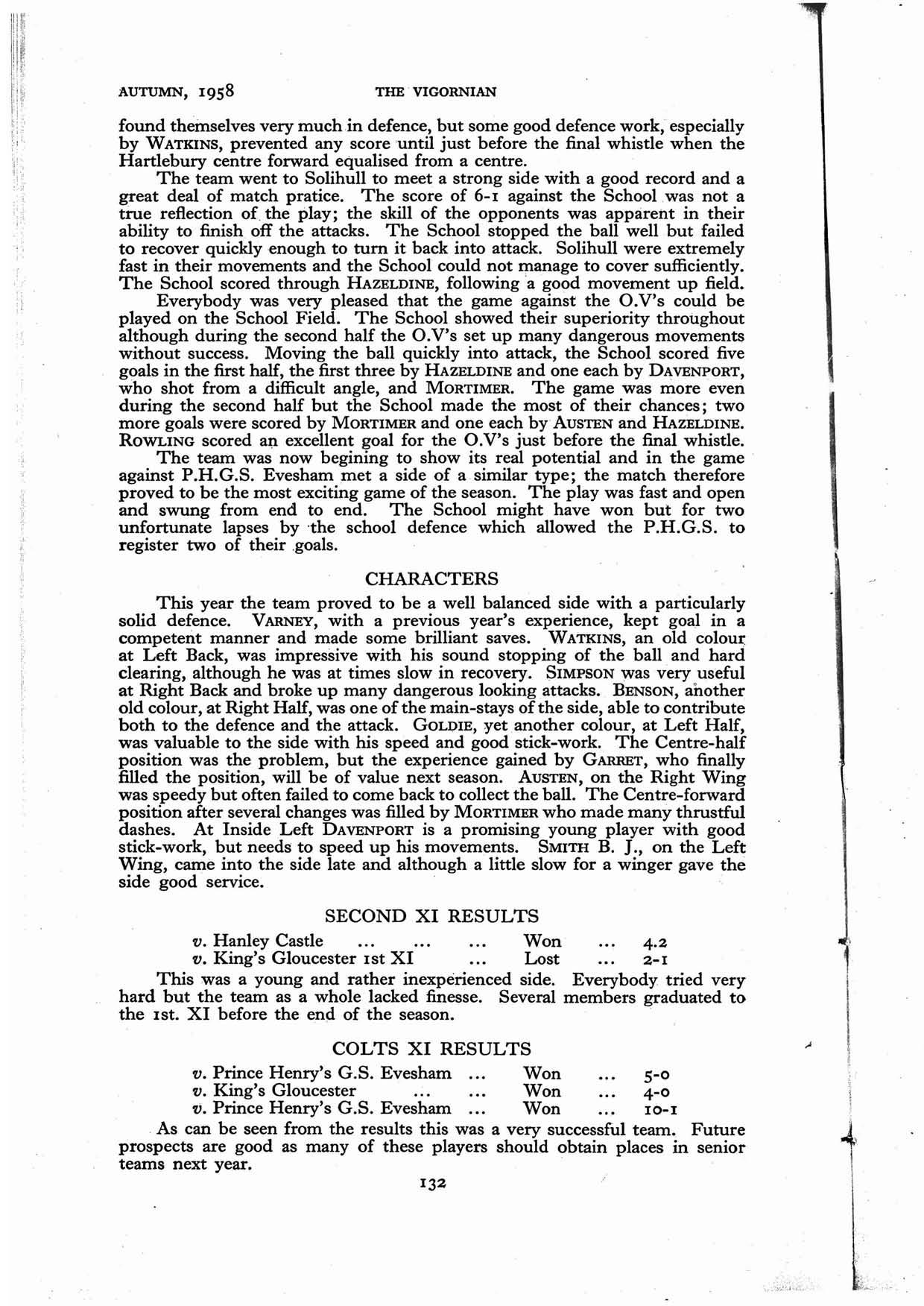
THE'VIGORNIAN
found themselves very much in defence, but some good defence work, especially by WATKINS, prevented any score 'until just before the final whistle when the Hartlebury centre forward equalised from a centre.
The team went to Solihull to meet a strong side with a good record and a great deal of match pratice. The score of 6-1 against the School was not a true reflection of the play; the skill of the opponents was apparent in their ability to finish off the attacks. The School stopped the ball well but failed to recover quickly enough to turn it back into attack. Solihull were extremely fast in their movements and the School could not manage to cover sufficiently. The School scored through HAZELDINE, following a good movement up field.
Everybody was very pleased that the game against the O.V's could be played on the School Field. The School showed their superiority throughout although during the second half the O.V's set up many dangerous movement$ without success. Moving the ball quickly into attack, the School scored five goals in the first half, the first three by HAZELDINE and one each by DAVENPORT, who shot from a difficult angle, and MORTIMER. The game was more even during the second half but the School made the most of their chances; two more goals were scored by MORTIMER and one each by AUSTEN and HAZELDINE. ROWLING scored an excellent goal for the O.V's just before the final whistle. The team was now begining to show its real potential and in the game against P.H.G.S. Evesham met a side of a similar type; the match therefore proved to be the most exciting game of the season. The play was fast and open and swung from end to end. The School might have won but for two unfortunate lapses by ,the school defence which allowed the P.H.G.S. to register two of their ,goals.
CHARACTERS
This year the team proved to be a well balanced side with a particularly solid defence. VARNEY, with a previous year's experience, kept goal in a competent manner and made some brilliant saves. WATKINS, an old colour. at Left Back, was impressive with his sound stopping of the ball and hard clearing, although he was at times slow in recovery. SIMPSON was very useful at Right Back and broke up many dangerous looking attacks. BENSON, another old colour, at Right Half, was one of the main-stays of the side, able to contribute both to the defence and the attack. GOLD1E, yet another colour, at Left Half, was valuable to the side with his speed and good stick-work. The Centre-half position was the problem, but the experience gained by GARRET, who finally filled the position, will be of value next season. AusTEN, on the Right Wing was speedy but often failed to come back to collect the ball. The Centre-forward position after several changes was filled by MORTIMER who made many thrustful dashes. At Inside Left DAVENPORT is a promising young player with good stick-work, but needs to speed up his movements. SMITH B. J., on the Left Wing, came into the side late and although a little slow for a winger gave the side good service.
SECOND XI RESULTS
v. Hanley Castle
v. King's Gloucester 1st XI
Won 4.2
Lost 2-1
This was a young and rather inexperienced side. Everybody tried very hard but the team as a whole lacked finesse. Several members graduated to the 1st. XI before the en4 of the season. '
COLTS XI RESULTS
v. Prince Henry's G.S. Evesham Won 5-0
v. King's Gloucester Won 4-0
v. Prince Henry's G.S. Evesham Won 10-1
, As can be seen from the results this was a very successful team. Future prospects are good as many of these players should obtain places in senior teams next year. '
THE VIGORNIAN AUTUMN, 1958
HOUSE COMPETITIONS
In the house competitions Castle House beat Choir House in the final after extra time 2- I.
AWARDS
, The following were re-awarded Colours.
P. J. BENSON. J. WATKINS. , P. G. GOLDIE.
The following were awarded Colours.
J. E. VARNEY. A. SIMPSON.
B. H. M. DAVENPORT.
J. M. AUSTEN.
R. MORTIMER.
W. P. GARRETT.
RI. SMITH.
CRICKET
1ST. 'XI RESULTS
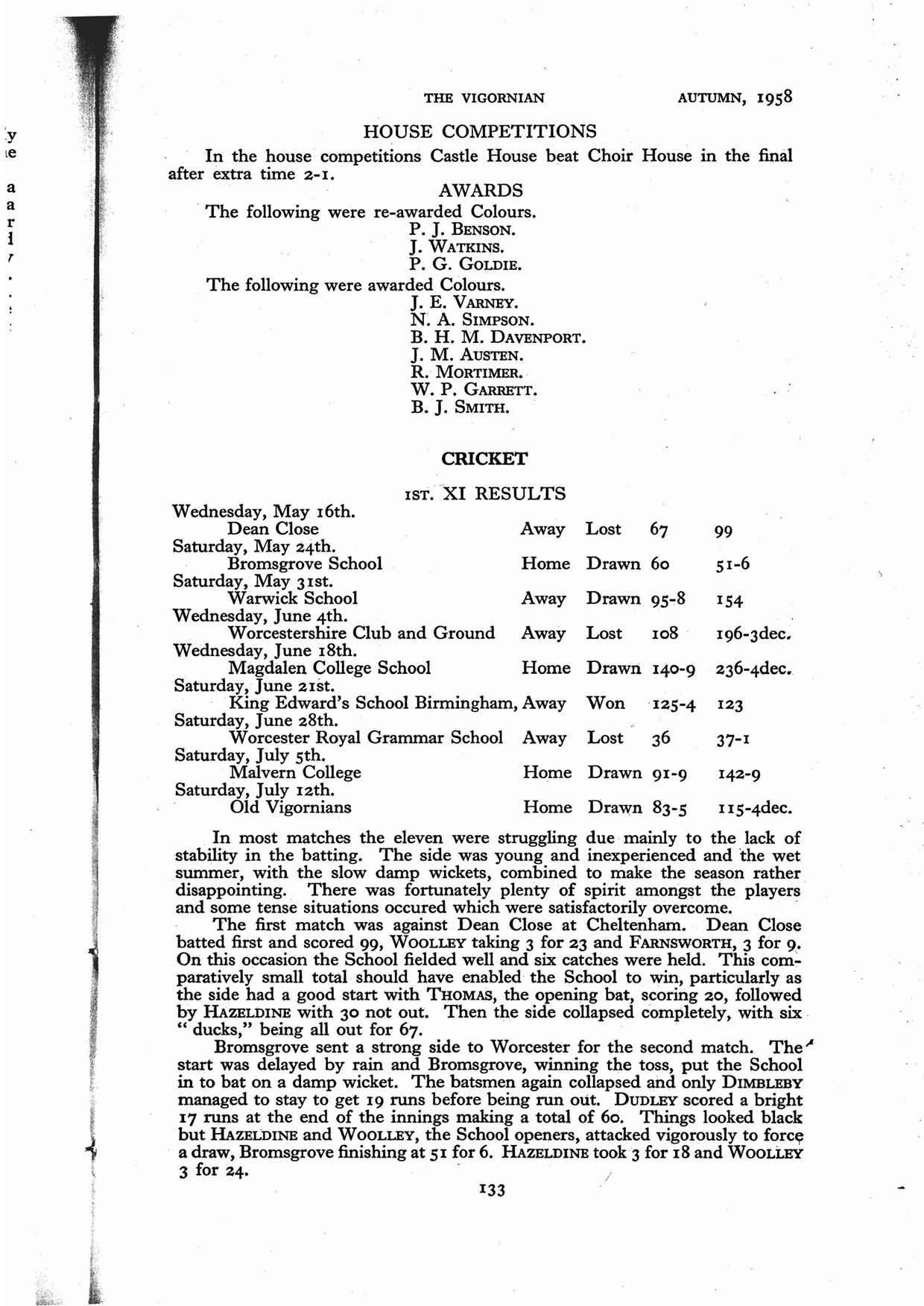
Wednesday, May 16th.
Dean Close Away Lost 67 99 Saturday, May 24th.
Bromsgrove School Home Drawn 60 51-6
Saturday, May 31st.
Warwick School Away Drawn 154 Wednesday, June 4th.
Worcestershire Club and Ground Away Lost 108 196-3dec. Wednesday, June 18th.
Magdalen College School Home Drawn 140-9 236-4dec. Saturday, June 21St.
King Edward's School Birmingham, Away Won '125-4 123 Saturday, June 28th.
Worcester Royal Grammar School Away Lost 36 37-1
Saturday, July 5th.
Malvern College Home Drawn 91-9 142-9 Saturday, July 12th.
Old Vigornians
Home Drawn 83-5 II5-4dec.
In most matches the eleven were struggling due mainly to the lack of stability in the batting. The side was young and inexperienced and the wet summer, with the slow damp wickets, combined to make the rather disappointing. There was fortunately plenty of spirit the players and some tense situations occured which were satisfactorily overcome. " , The first match was against Dean Close at Cheltenham. Dean Close batted first and scored 99, WOOLLEY taking 3 for 23 and F ARNSWORTH, 3 for 9. On this occasion the School fielded well and six catches were held. This paratively small total should have enabled' the School to win, particularly as the side had a good start with THOMAS, the opening bat, scoring 20, followed by HAZELDINE with 30 not out. Then the side collapsed completely, with six " ducks," being all out for 67. '
Bromsgrove sent a strong side to Worcester for the second match. The'" start was delayed by rain and Bromsgrove, winning the toss, put the School in to bat on a damp wicket. The batsmen again collapsed ahd only DIMBLEBY managed to stay to get 19 runs before being run olit. ,DuDLEY scored a bright 17 runs at the end of the innings making a total of 60. Things looked black but HAZELDINE and WOOLLEY, the School openers, attacked vigorously to
a draw, Bromsgrove finishing at 51 for 6. HAZELDINE took3 for 18 and WOOLLEY ! \, 3 for 24. ' / 133
AUTUMN, 1958
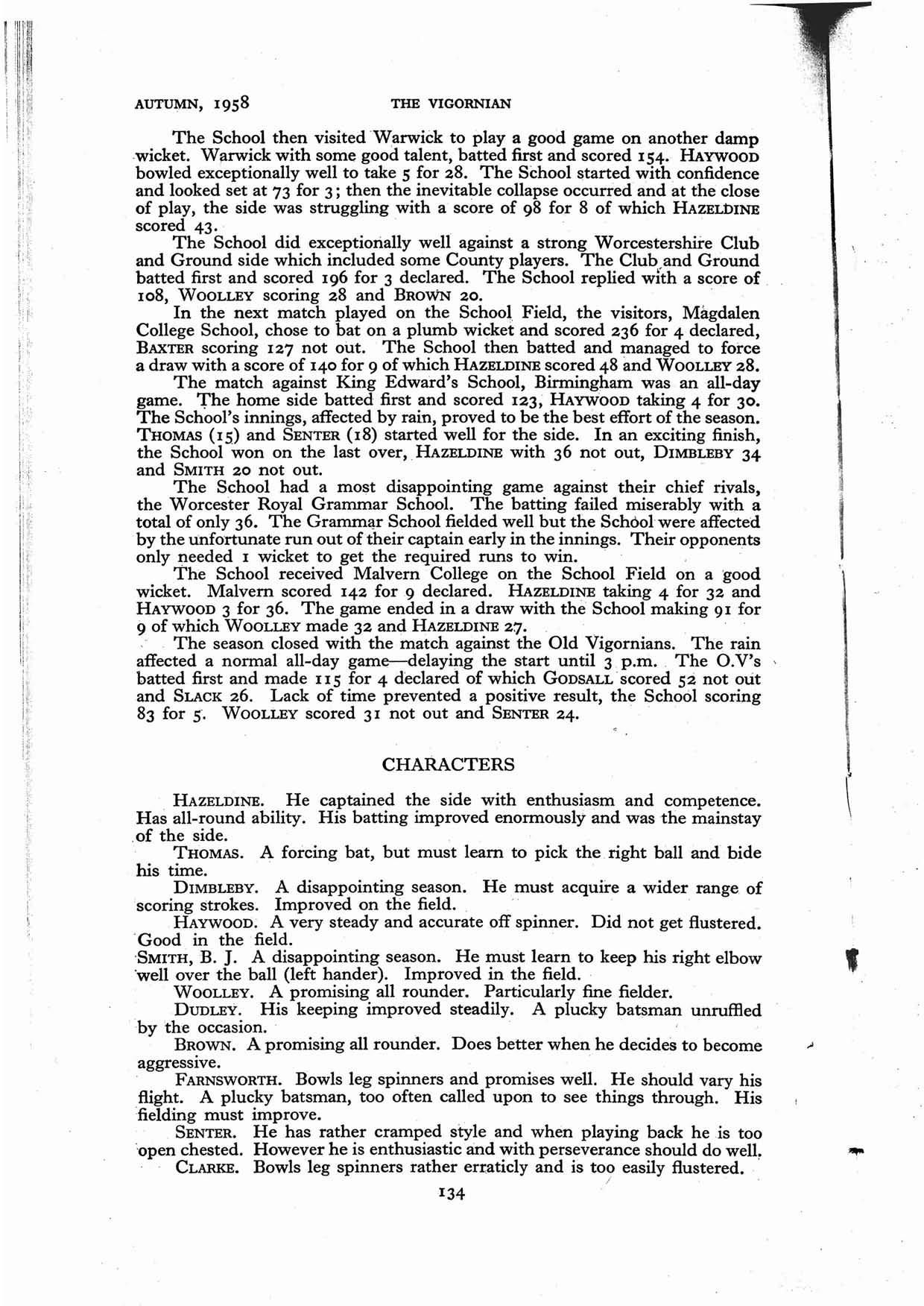
THE VIGORNIAN
The School then visited Warwick to play a good game on another damp wicket. Warwick with some good talent, batted first and scored 154. HAYWOOD bowled exceptionally well to take 5 for 28. The School started with confidence and looked set at 73 for 3; then the inevitable collapse occurred and at the close of play, the side was struggling with a score of 98 for 8 of which HAZELDINE scored 43. ,
The School did exceptionally well against a strong Worcestershire Club and Ground side which included some County players. The Club,and Ground batted first and scored 196 for 3 declared. The School replied with a score of 108, WOOLLEY scoring 28 and BROWN 20. ,-
In the next match played on the School Field, the visitors, Magdalen College School, chose to bat on a plumb wicket and scored 236 for 4 declared, BAXTER scoring 127 not out. The School then batted and managed to force a draw with a score of 140 for 9 of which HAZELDINE scored 48 and WOOLLEY 28.
The match against King Edward's School, Birmingham was an all-day game. The home side batted first and scored 123, HAYWOOD taking 4 for 30. The School's innings, affected by rain, proved to be the best effort of the season. THOMAS (15) and SENTER (18) started well for the side. In an exciting finish, the School won on the last over, HAZELDINE with 36 not out, DIMBLEBY 34 and SMITH 20 not out. >
The School had a most disappointing game against their chief rivals, the Worcester Royal Grammar School. The batting failed miserably with a total of only 36. The School fielded well but the Schoolwere affected by the unfortunate run out oftheir captain early in the innings. Their opponents only needed I wicket to get the required runs to win.
The School received Malvern College on the School Field on a good wicket. Malvern scored 142 for 9 declared. HAzELDINE taking 4 for 32 and HAYWooD 3 for 36. The game ended in a draw with the School making 91 for 9 of which WOOLLEY made 32 and HAZELDINE 27. _
The season closed with the match against the Old Vigornians. The rain affected a normal all-day game-delaying the start until 3 p.m. , The O.V's ' batted first and made II 5 for 4 declared of which GODSALL' scored 52 not out and SLACK 26. Lack of time prevented a positive resUlt, the School scoring 83 for 5. WOOLLEY scored 31 not out and SENTER 24.
CHARACTERS
HAZELDINE. He captained the side with enthusiasm and competence. Has all-round ability. His batting improved enormously and was the mainstay ,of the side.
THOMAS. A forcing bat, but must learn to pick the, right ball and bide his time.
DIMBLEBY. A disappointing season. He must acquire a wider range of scoring strokes. Improved on the field.
HAYWOOD. A very steady and accurate off spinner. Did not get flustered. -Good in the field.
-SMITH, B. J. A disappointing season. He must learn to keep his right elbow 'well over the ball (left hander). Improved in the field.
WOOLLEY. A promising all rounder. Particularly fine fielder.
DUDLEY. His keeping improved steadily. A plucky batsman unruffled by the occasion. , BR.OWN. A promising all rounder. Does better when he decides to become aggressIve. , FARNSWORTH. Bowls leg spinners and promises well. He should vary his flight. A plucky batsman, too often called upon to see things through. His fielding must improve.
SENTER. He has rather cramped style and when playing back he is too 'open chested. However he is enthusiastic and with perseverance should do CLARKE. Bowls leg spinners rather en:aticly and is too easily flustered. ' /
2ND XI
Won 2 Drawn 2
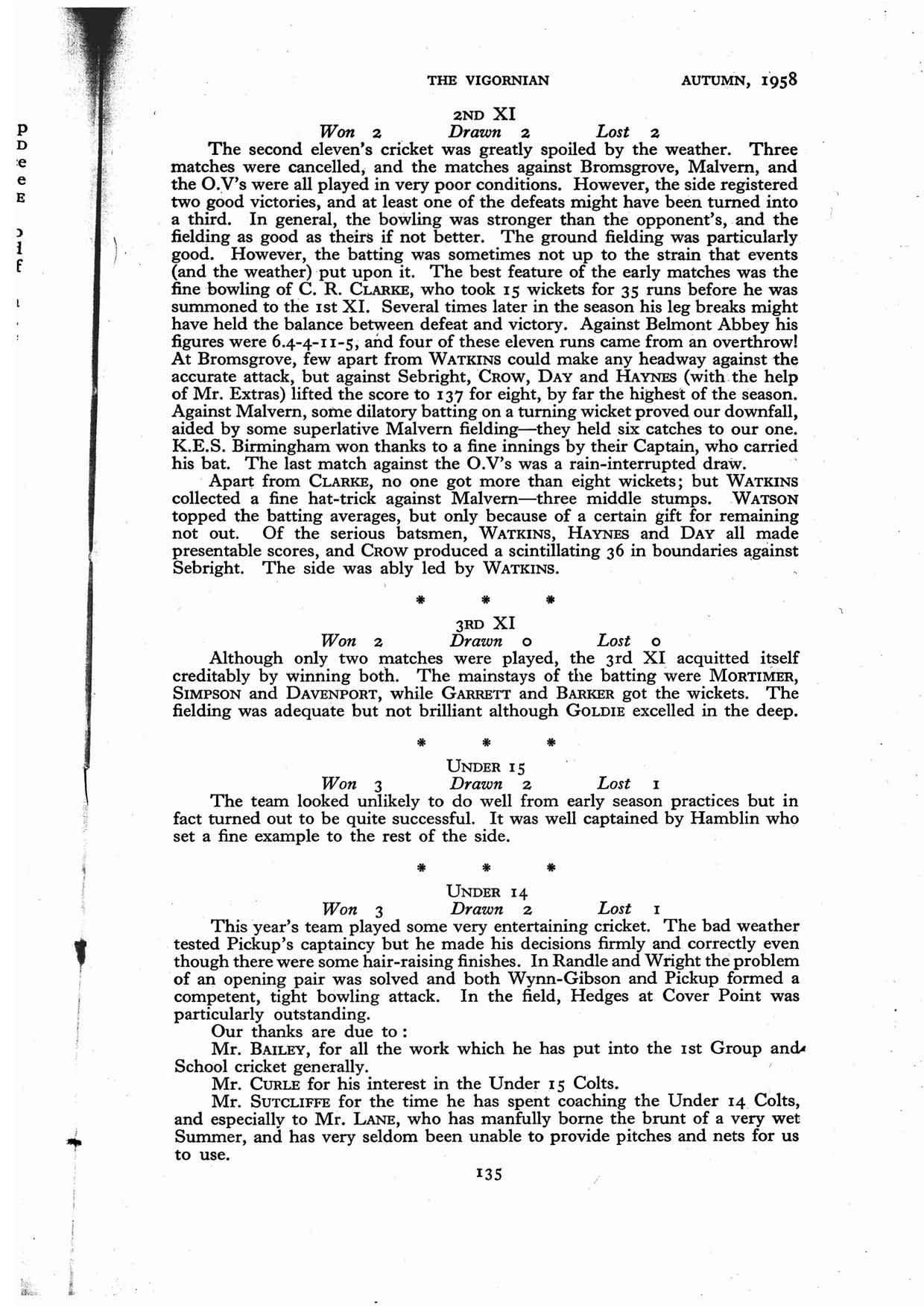
Lost 2
The second eleven's cricket was greatly spoiled by the weather. Three
matches were cancelled, and the matches against Bromsgrove, Malvern, and
the G.V's were all played in very poor conditions. However, the side registered
two good victories, and at least one of the defeats might have been turned into a third. In general, the bowling was stronger than the opponent's, and the
fielding as good as theirs if not better. The ground fielding was particularly
good. However, the batting was sometimes not up to the strain that events
(and the weather) put upon it. The best feature of the early matches was the fine bowling of C. R. CLARKE, who took 15 wickets for 35 runs before he was summoned to the 1st XI. Several times later in the season his leg breaks might have held the balance between defeat and victory. Against Belmont Abbey his figures were 6.4-4-II-5' and four of these eleven runs came from im overthrow! At Bromsgrove, few apart from WATKINS could make any headway against accurate attack, but against Sebright,CROW, DAY and HAYNES (with. the help of Mr. Extras) lifted the score to 137 for eight, by far the highest of the season. Against Malvern, some dilatory batting on a turning wicket proved our downfall, aided by some superlative Malvern fielding-they held six catches to our one. K.E.S. Birmingham won thanks to a fine innings by their Captain, who carried his bat. The last match against the O.V's was a rain-interrupted draw. '
Apart from CLARKE, no one got more than eight wickets; but W ATKINS collected a fine hat-trick against Malvern-three middle stumps. WATSON topped the batting averages, but only because of a certain gift for remaining not out. Of the serious batsmen, WATKINS, HAYNES and DAY all made presentable scores, and CROW produced a scintillating 36 in boundaries Sebright. The side was ably led by WATKINS.
3RD XI
Won 2 Drawn 0 Lost 0
Although only two matches were played, the 3rd XI acquitted itself creditably by winning both. The mainstays of the batting were MORTIMER, SIMPSON and DAVENPORT, while GARRETT and BARKER got the wickets. The fielding was adequate but not brilliant although GOLDIE excelled in the deep.
UNDER 15
Won 3 Drawn 2 Lost 1
The team looked unlikely to do well from early season practices but in fact turned out to be quite successful. It was well captained by Hamblin who set a fine example to the rest of the side.
UNDER 14
Won 3 Drawn 2 Lost 1
,This year's team played some very entertaining cricket. The bad weather tested Pickup's captaincy but he made his decisions firmly and correctly even though there were some hair-raising finishes. In Randle and Wright the problem of an opening pair was solved and both Wynn-Gibson and Pickup formed a ! competent, tight bowling attack. In the field, Hedges at Cover Point was particularly outstanding.
Our thanks are due to:
Mr. BAILEY, for all the work which he has put into the 1st Group and,. School cricket generally.
Mr. CURLE for his interest in the Under 15 Colts.
Mr. SUTCLIFFE for the time he has spent coaching the Under 14 Colts, and especially to Mr. LANE, who has manfully borne the brunt of a very wet Summer, and has very seldom been unable to provide pitches and nets for us to use.
THE VIGORNIAN
ROWING 1958
RESULTS dF FIXTURES
1ST VIII: ROWED I LOST I
COLTS VIII: ROWED I LoST I
1ST IV: ROWED 17 WON 12 LOST 4 DREW I
Trophies: Worcester Regatta-.Brittlebank Trophy; Stourport Regatta-The Town Plate; Shrewsbury Regatta-The Minsterley Cup; Marlow Regatta-Public Schools' Challenge Cup.
2ND IV: ROWED 10 WON 2 LOST. 7 DREW I
3RD IV: ROWED II WON7 LOST 4
4TH IV: ROWED 9 WON 6 LOST 3
5TH IV: ROWED 3 WON 3 LoST 0
6TH IV: ROWED I WON I LOST 0
COLOURS AWARDED
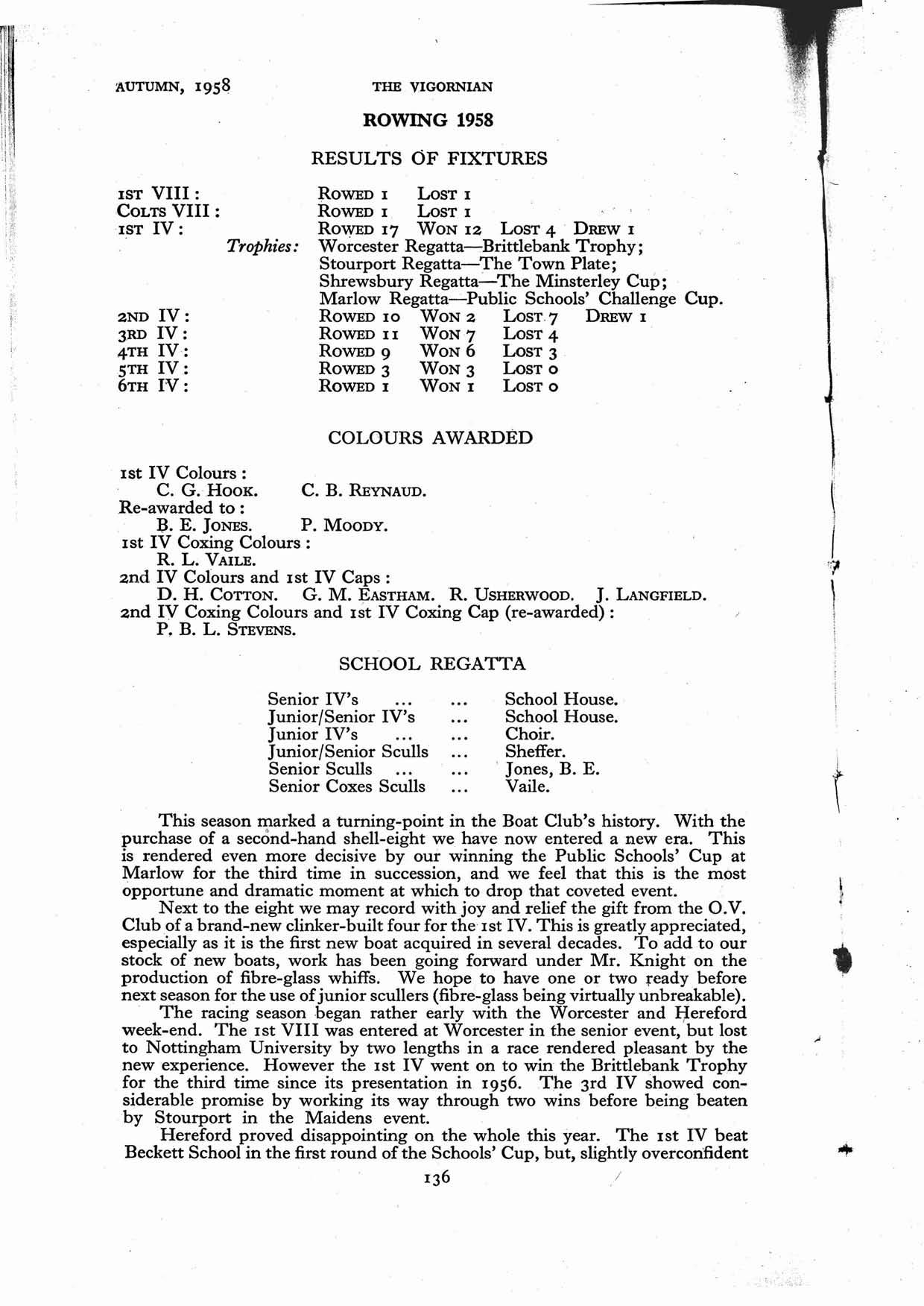
1St IV Colours:
C. G.HOOK. C. B. REYNAUD. Re-awarded to : :a. E. JONES. P. MOODY. 1st IV Coxing Colours:
R. L. VAILE. 2nd IV Colours and I st IV Caps:
D. H. COTTON. G. M. EASTHAM. R. USHERWOOD. J. LANGFIELD. 2nd IV Coxing Colours and 1st IV Coxing Cap (re-awarded): p. B. L. STEVENS.
SCHOOL REGATTA
Senior IV's School House.
Junior/Senior IV's School House. Junior IV's Choir.
Junior/Senior Sculls Sheffer. Senior Sculls , Jones, B. E. Senior Coxes Sculls Vaile.
This season marked a turning-point in the Boat Club's history. With the purchase of a second-hand shell-eight we have now entered a new era. This is rendered even more decisive by our winning the Public Schools' Cup at Marlow for the third time in succession, and we feel that this is the most opportune and dramatic moment at which to drop that coveted event. '
Next to the eight we may record with joy and relief the gift from the a.v. Club of a brand-new clinker-built four for the 1st IV. This is greatly appreciated, especially as it is the first new boat acquired in several decades. To add to our stock of new boats, work has been going forward under Mr. Knight on the production of fibre-glass whiffs. We hope to have one or two ready before next season for the use of junior scullers (fibre-glass being virtually unbreakable).
The racing season began rather early with the Worcester and f;Iereford week-end. The 1st VIII was entered at Worcester in the senior event, but lost to Nottingham University by two lengths in a race rendered pleasant by the new experience. However the 1st IV went on to win the Brittlebank Trophy for the third time since its presentation in 1956. The 3rd IV showed con siderable promise by working its way through two wins before being beaten by Stourport in the Maidens event.
Hereford proved disappointing on the whole this year. The 1st IV beat Beckett School in the first round of the Schools' Cup, but, slightly overconfident 13 6 /
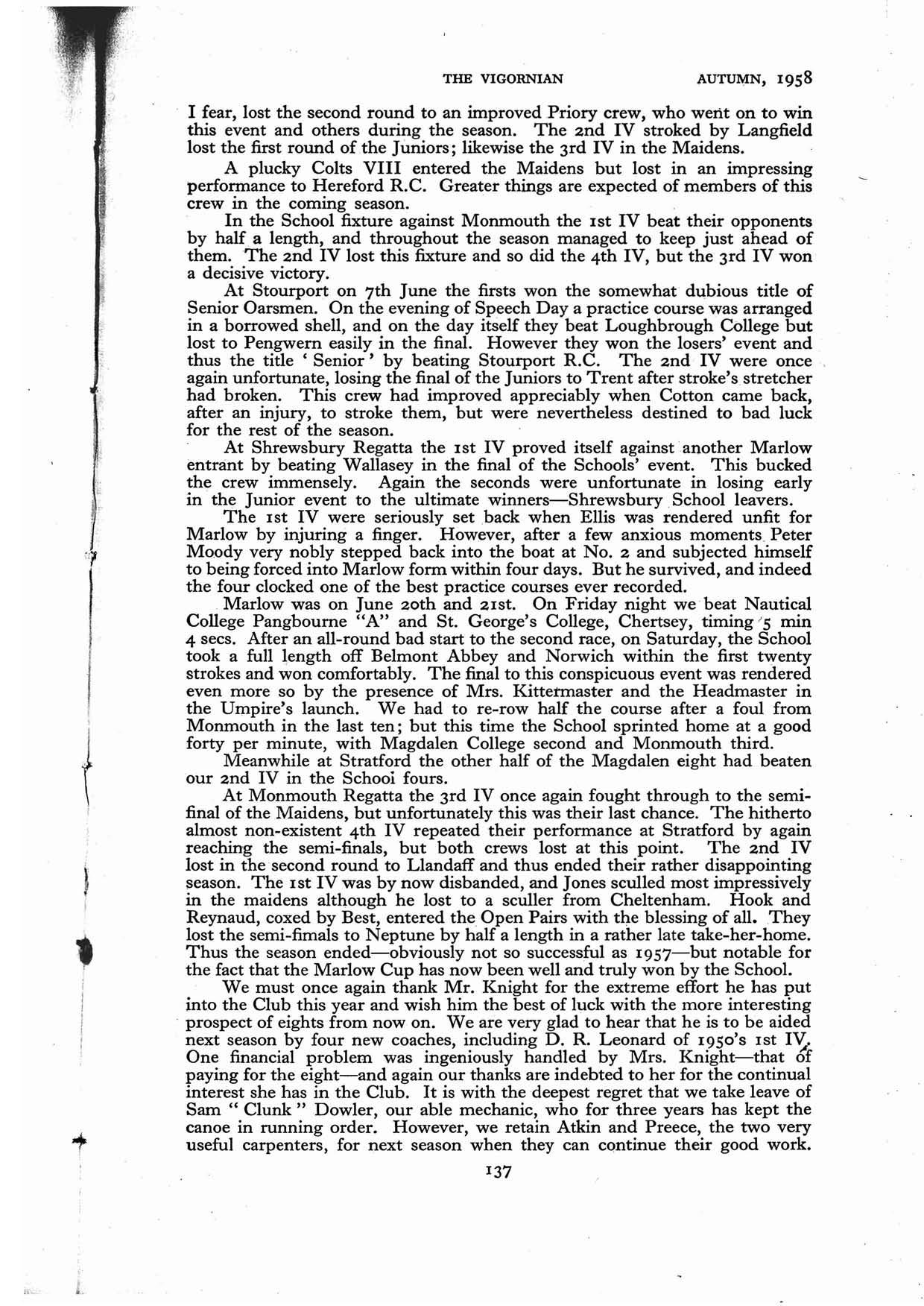
I fear, lost the second round to an improved Priory crew, who went on to win this event and others during the season. The 2nd IV stroked by Langfield lost the first round of the Juniors; likewise the 3rd IV in the Maidens.
A plucky Colts VIII entered the Maidens but lost in an impressing performance to Hereford R.C. Greater things are expected of members of this crew in the coming season.
In the School fixture against Monmouth the 1st IV beat their opponents by half a length, and throughout the season managed to keep just ahead of them. The 2nd IV lost this fixture and so did the 4th IV, but the 3rd IV won a decisive victory.
At Stourport on 7th June the firsts won the somewhat dubious title of Senior Oarsmen. On the evening of Speech Day a practice course was arranged in a borrowed shell, and on the day itself they beat Loughbrough College but lost to Pengwern easily in the final. However they won the losers' event and thus the title' Senior' by beating Stourport R.C. The 2nd IV were once again unfortunate, losing the final of the Juniors to Trent after stroke's stretcher had broken. This crew had improved appreciably when Cotton came back, after an injury, to stroke them, but were nevertheless destined to bad luck for the rest of the season.
At Shrewsbury Regatta the 1st IV proved itself against another Marlow entrant by beating Wallasey in the final of the Schools' event. This bucked the crew immensely. Again the seconds were unfortunate in losing early in the Junior event to the ultimate winners-Shrewsbury School leavers.
The 1st IV were seriously set back when Ellis was rendered unfit for Marlow by injuring a finger. However, after a few anxious moments. Peter Moody very nobly stepped back into the boat at No. 2 and subjected himself to being forced into Marlow form within four days. But he survived, and indeed the four clocked one of the best practice courses ever recorded.
Marlow was on June 20th and 21st. On Friday night we beat Nautical College Pangboume "A" and St. George's College, Chertsey, timing /5 min 4 secs. After an all-round bad start to the second race, on Saturday, the School took a full off Belmont Abbey and Norwich within the first twenty strokes and won comfortably. The final to this conspicuous event was rendered even more so by the presence of Mrs. Kittetmaster and the Headmaster in the Umpire's launch. We had to re-row half the course after a foul from Monmouth in the last ten; but this time the School sprinted home at a good forty per minute, with Magdalen College second and Monmouth third. Meanwhile at Stratford the other half of the Magdalen eight had beaten our 2nd IV in the Schooi fours.
At Monmouth Regatta the 3rd IV once again fought through to the semifinal of the Maidens, but unfortunately this was their last chance. The hitherto almost non-existent 4th IV repeated their performance at Stratford by again reaching the semi-finals, but both crews lost at this point. The 2nd IV lost in the'second round to Llandaff and thus ended their rather disappointing season. The 1st IV was by now disbanded, and Jones sculled most impressively in the maidens although he lost to a sculler from Cheltenham. Hook and Reynaud, coxed by Best, entered the Open Pairs with the blessing of all. They lost the semi-fimals to Neptune by half a length in a rather late take-her-home. Thus the season ended-obviously not so successful as I957-but notable for the fact that the Marlow Cup has now been well and truly won by the School.
We must once again thank Mr. Knight for the extreme effort he has put into the Club this year and wish him the best of luck with the more interesting prospect of eights from now on. We are very glad to hear that he is to be aided next season by four new coaches, including D. R. Leonard of 1950'S 1st IV. One financial problem was ingeniously handled by Mrs. Knight-that tf paying for the eight-and again our thanks are indebted to her for the continual interest she has in the Club. It is with the deepest regret that we take leave of Sam " Clunk" Dowler, our able mechanic, who for three years has kept the canoe in running order. However, we retain Atkin and Preece, the two very useful carpenters, for next season when they can continue their good work.
137
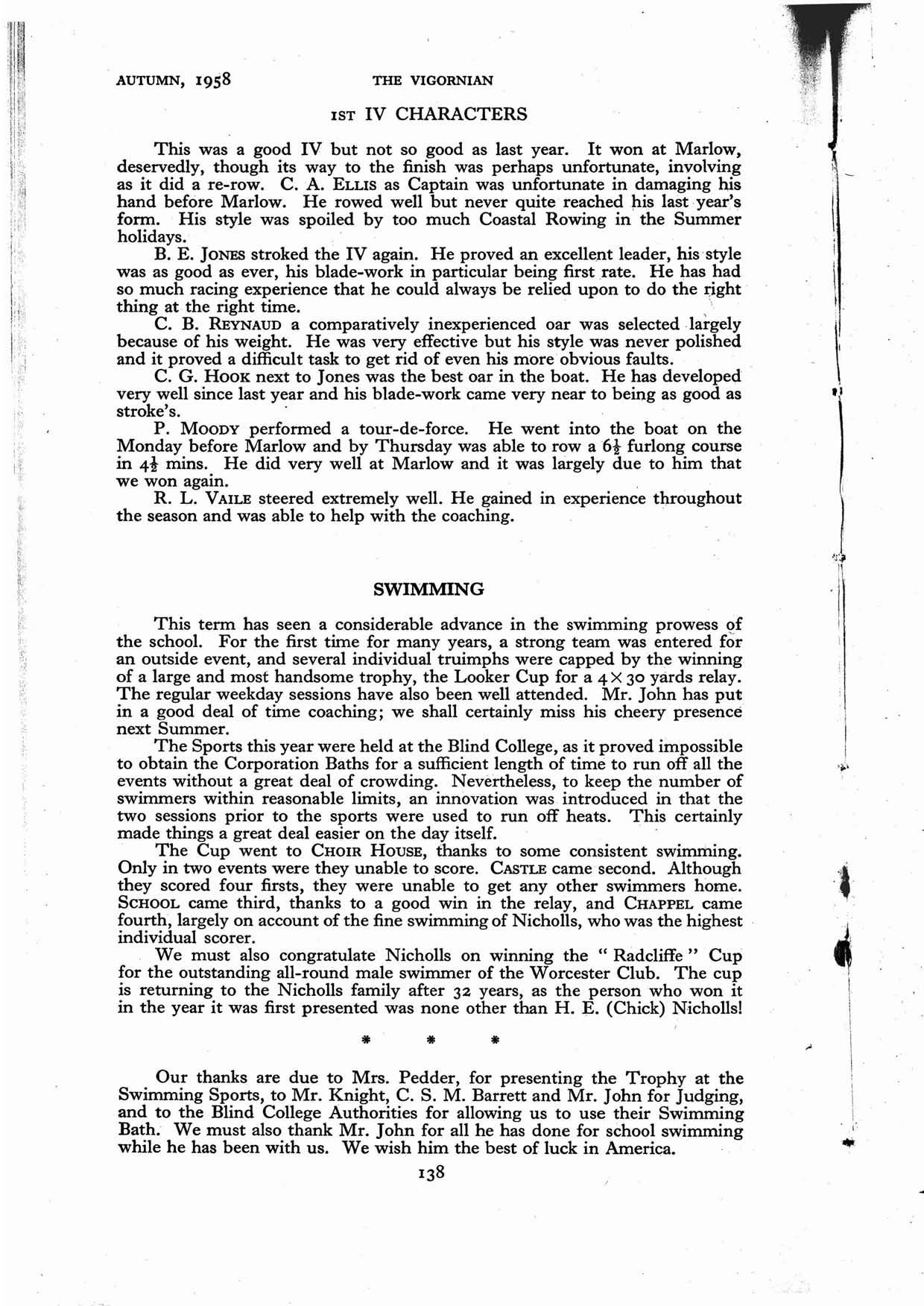
1ST IV CHARACTERS
This was a good IV but not so good as last year. It won at Marlow, deservedly, though its way to the finish was perhaps unfortunate, involving as it did a re-row. C. A. ELLIs as Captain was unfortunate in damaging his hand before Marlow. He rowed well but never quite reached pis last year's fonn. His style was spoiled by too much Coastal Rowing in the Summer
holidays.
B. E. JONES stroked the IV again. He proved an excellent leader, his style was as good as ever, his blade-work in particular being first rate. He has had
so much racing experience that he could always be relied upon to do the tight
thing at the right time. ,"
C. B. REYNAUD a comparatively inexperienced oar was selected .largely because of his weight. He was very effective but his style was never polished and it proved a difficult task to get rid of even his more obvious faults.
C. G. HOOK next to J ones was the best oar in the boat. He has developed very well since last year and his blade-work came very near to being as good as stroke's.
P. MOODY perfonned a tour-de-force. He went into the boat on the Monday before Marlow and by Thursday was able to row a6t furlong course in 41- mins He did very well at Marlow and it was largely due to him that we won agam. ,
R. L. VAILE steered extremely well. He gained in experience throughout the season and was able to help with the coaching.
SWIMMING
This tenn has seen a considerable advance in the swimming prowess Qf
the school. For the first time for many years, a strong team was entered for an outside event, and several individual truimphs were capped by the winning of a large and most handsome trophy, the Looker Cup for a 4 X 30 yards relay.
The regular weekday sessions have also been well attended. Mr. John has put
in a good deal of time coaching; we shall certainly miss his cheery presence
next Summer.
The Sports this year were held at the Blind College, as it proved impossible
to obtain the Corporation Baths for a sufficient length of time to run off all the
events without a great deal of crowding. Nevertheless, to keep the number of swimmers within reasonable limits, an innovation was introduced in that the two sessions prior to the sports were used to run off heats. This certainly made things a great deal easier on the day itself. .
The Cup went to CHOIR HOUSE, thanks to some consistent swimming. Only in two events were they unable to score. CASTLE came second. Although
they scored four firsts, they were unable to get any other swimmers home. SCHOOL came third, thanks to a good win in the relay, and CHAPPEL came fourth, largely on account of the fine swimming of Nicholls, who was the highest individual scorer.
We must also congratulate Nicholls on winning the" Radcliffe" Cup
for the outstanding all-round male swimmer of the Worcester Club. The cup
is returning to the Nicholls family after 32 years, as the person who won it in the year it was first presented was none other than H. E. (Chick) Nicholls!
Our thanks are due to Mrs. Pedder, for presenting the Trophy at the Swimming Sports, to Mr. Knight, C. S. M. Barrett and Mr. John for Judging, and to the Blind College Authorities for allowing us to use their Swimming Bath. We must also thank Mr. John for all he has done for school swimming while he has been with us. We wish him the best of luck in America. . 13 8
Senior Breast Stroke
Junior Back Stroke
Underwater
Senior Free Style
Junior BreastStroke
Plunge
Senior Back Stroke
Junior Freestyle
Diving
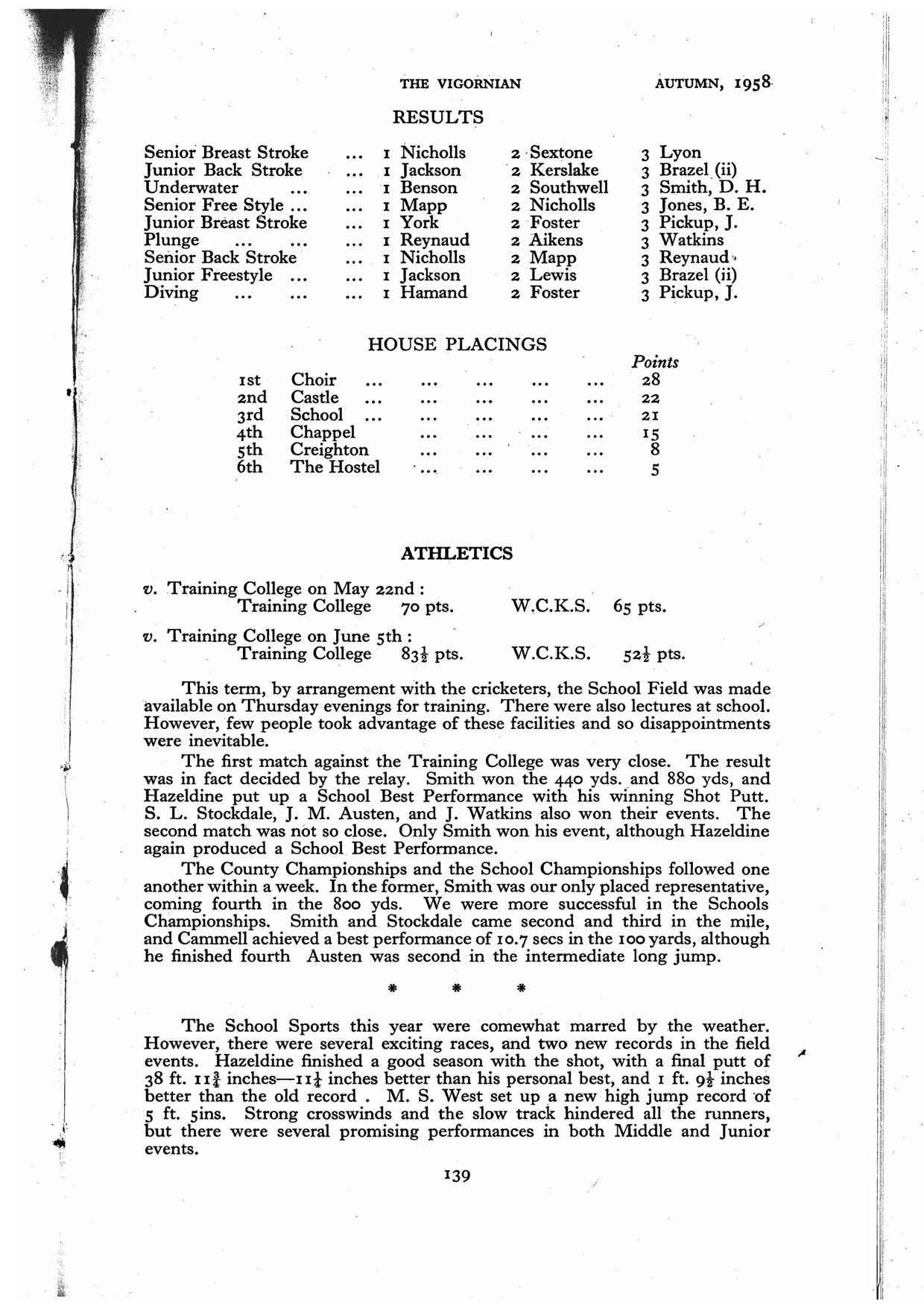
THE VIGORNIAN RESULTS
I Nicholls 2 -Sextone
I Jackson 2 Kerslake
I Benson 2 Southwell
I Mapp 2 Nicholls
I York 2 Foster
I Reynaud 2 Aikens
I Nicholls 2 Mapp
I Jackson 2 Lewis
I Hamand 2 Foster
HOUSE PLACINGS
1st Choir 2nd Castle 3 r d School
4th Chappel
5th Creighton, 6th The Hostel
ATlll.,ETICS
v. Training College on May 22nd : Training College 70 pts. W,C.K.S. 65 pts.
v. Training College on June 5th:
Training College 83! pts. W.C.K.S. 52! pts.
This term, by arrangement with the cricketers, the School Field was made
available on Thursday evenings for training. There were also lectures at school.
However, few people took advantage of these facilities and so disappointments were inevitable.
The first match against the Training College was very close. The result
was in fact decided by the relay. Smith won the 440 yds and 880 yds, and
Hazeldine put up a School Best Performance with his winning Shot Putt.
S. L. Stockdale, J. M. Austen, and J. Watkinsalso won their events. The
second match was not so close. Only Smith won his event, although Hazeldine
again produced a School Best Performance.
The County Championships and the School Championships followed one
another within a week. In the former, Smith was our only placed representative,
coming fourth in the 800 yds. We were more successful in the Schools
Championships. Smith and Stockdale came second and third in the mile,
and Cammell achieved a best performance of 10.7 secs inthe 100 yards, although
he finished fourth Austen was second in the intermediate long jump.
The School Sports this year were comewhat marred by the weather. However, there were several exciting races, and two new records in the field
events. Hazeldine finished a good season with the shot, with a final putt of
38 ft. III inches-Ill inches better than his personal best, and I ft. 9! inches
better than the old record. M. S. West set up a new high jump record 'of
5 ft. sins. Strong crosswinds and the slow track hindered all the runners,
several promising performances in both Middle and Junior
but there were events. AUTUMN, I9SS. 3 Lyon 3 Brazel. (ii) 3 Smith, D. H. 3 Jones,B. E. 3 Pickup, J. 3 Watkins 3 3 Brazel (ii) 3 Pickup, J.
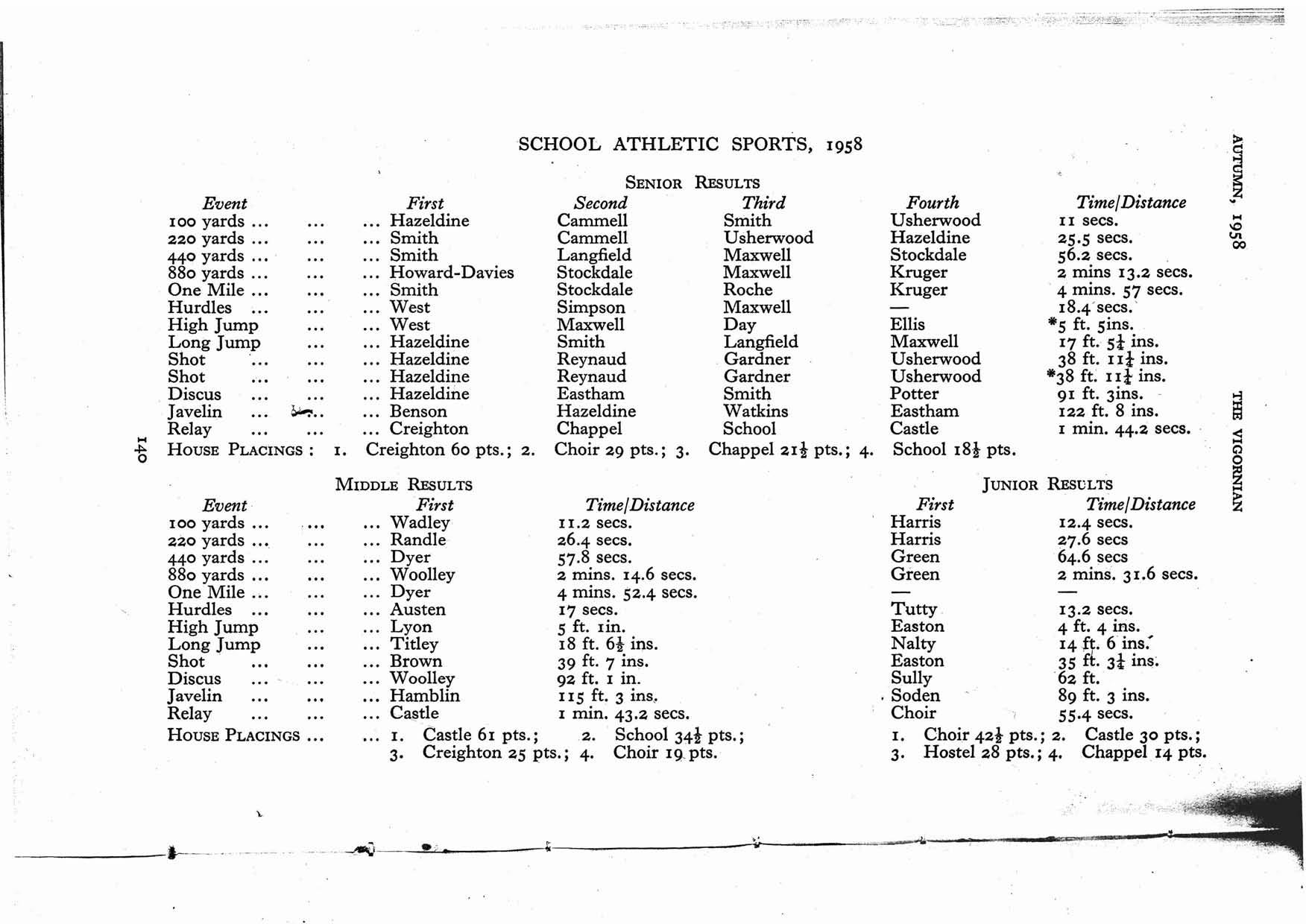
SCHOOL ATHLETIC SPORTS, 1958
ATHLETICS AWARDS
COLOURS
were re-awarded to : R. J. HAZELDINE. , were awarded to: M. S. WEST, G. C. S. SMiTH, S. B. CAMMELL, J. M. AUSTEN.
We would like to express our gratitude to.Mrs. Kittermaster for presenting
the trophies, and to those members of the staff who helped with the judging.
Mr. Vivian, Mr. Natan, and Mr. John all helped with coaching during the
term, and we must thank them too. Above all, we must thank Mr. Lane,
for the hard work he has put into the track for us, and Mr. Cash for his invaluable
interest and guidance through the term, and for much time and patience
spent in arranging the sports.
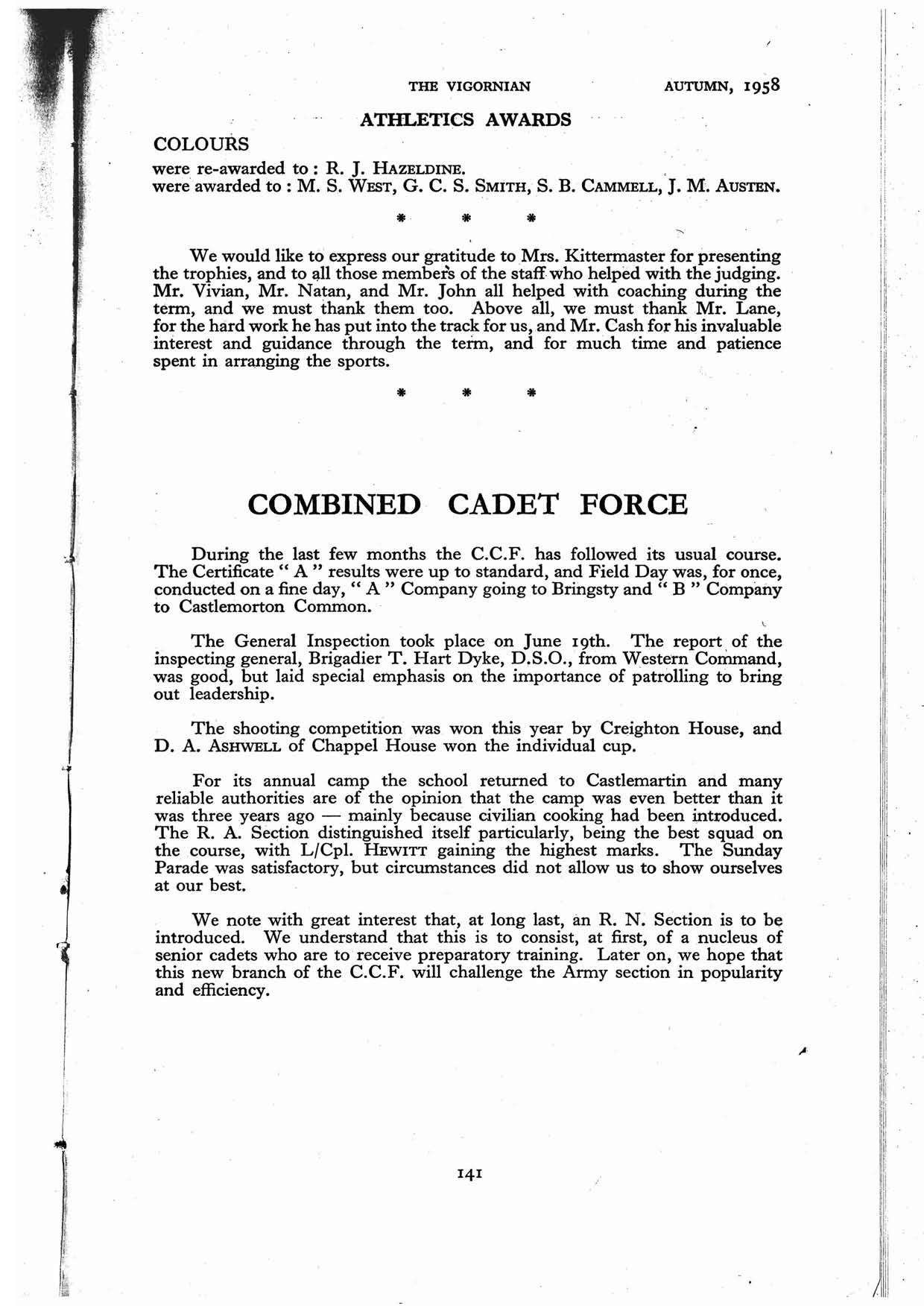
COMBINED CADET FORCE
During the last few months the C.C.F. has followed its usual course.
The Certificate" A" results were up to standard, and Field Day was, for once,
conducted on a fine day, " A " Company going to Bringsty and " B " Company
to Castlemorton Common.
The General Inspection took place on June 19th. The report, of the inspecting general, Brigadier T. Hart Dyke, D.S.G., from Western Command,
was good, but laid special emphasis on the importance of patrolling to bring out leadership.
The shooting competition was won this year by Creighton House, and
D. A. ASHWELL of Chappel House won the individual cup.
For its annual camp the school returned to Castlemartin and many reliable authorities are of the opinion that the camp was even better than it
was three years ago - mainly because civilian cooking had been introduced. The R. A. Section distinguished itself particularly, being the best squad on
the course, with L/Cpl. HEwITT gaining the highest marks. The Sunday Parade was satisfactory, but circumstances did not allow us to show ourselves
at our best.
We note with great interest that, at long last, an R. N. Section is to be
introduced. We understand that this is to consist, at first, of a nucleus of senior cadets who are to receive preparatory training. Later on, we hope that
this new branch of the C.C.F. will challenge the Army section in popularity
and efficiency.
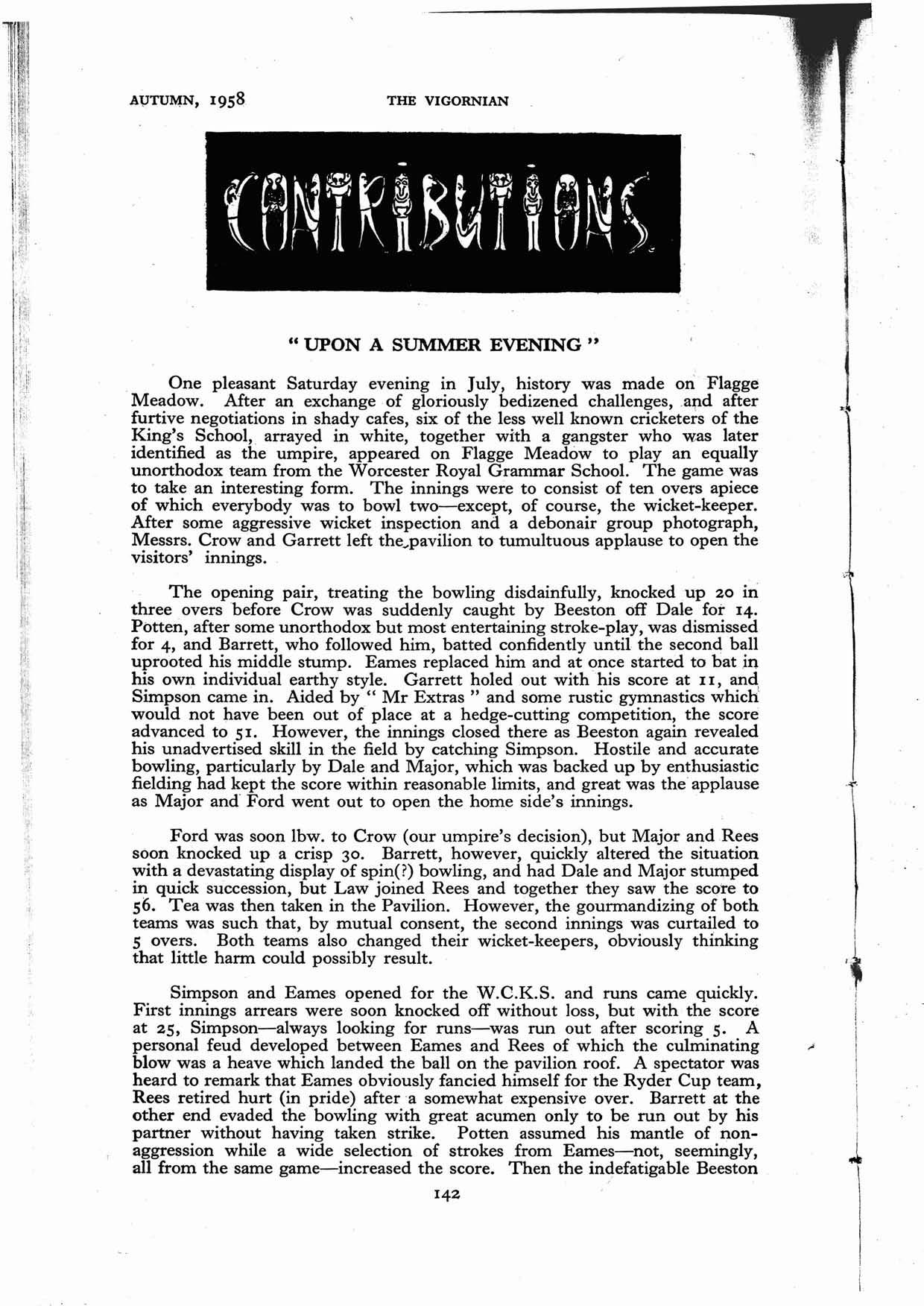
cc UPON A SUMMER EVENING"
One pleasant Saturday evening in July, history was made on Flagge Meadow. After an exchange of gloriously bedizened after furtive negotiations in shady cafes, six of the less well known cricketers of the King's School, arrayed in white, together with a gangster who was later identified as the umpire, appeared on Flagge Meadow to play an equally unorthodox team from the Worcester Royal Grammar School. The game was to take an interesting form. The innings were to consist of ten overS apiece of which everybody was to bowl two-except, of course, the wicket-keeper. After some aggressive wicket inspection and a debonair group photograph, Messrs. Crow and Garrett left the...pavilion to tumultuous applause to open the visitors' innings.
The opening pair, treating the bowling disdainfully, knocked up 20 in three oversbefore Crow was suddenly caught by Beeston off Dale fot 14. Potten, after some unorthodox but most entertaining stroke-play, was dismissed for 4, and Barrett, who followed him, batted confidently until the second ball uprooted his middle stump. Eames replaced him and at once started to bat in his own individual earthy style. Garrett holed out with his score at 11, and Simpson came in. Aided by" Mr Extras " and some rustic gymnastics whicht would not have been out of place at a hedge-cutting competition, the score advanced to 51. However, the innings closed there as Beeston again revealed his unadvertised skill in the field by catching Simpson. Hostile and accurate bowling, particularly by Dale and Major, which was backed up by enthusiastic fielding had kept the score within reasonable limits, and great was the applause as Major and Ford went out to open the home side's innings.
Ford was soon lbw. to Crow (our umpire's decision), but Major and Rees SOon knocked up a crisp 30. Barrett, however, quickly altered the situation with a devastating display of spine?) bowling, and had Dale and Major stumped in quick succession, but Law joined Rees and together they saw the sCQte to 56. Tea was then taken in the Pavilion. However, the gourmandizing of both teams was such that, by mutual consent, the second innings was curtailed to 5 overs. Both teams also changed their wicket-keepers, obviously thinking that little harm could possibly result.
Simpson and Eames opened for the W.e.K.S. and runs came quickly. First innings arrears were soon knocked off without loss, but with the score at 25, Simpson-always looking for runs-was run out after scoring 5. A personal feud developed between Eames and Rees of which the culminating blow was a heave which landed the ball on the pavilion roof. A spectator was heard to remark that Eames obviously fancied himself for the Ryder Cup team, Rees retired hurt (in pride) after a somewhat expensive over. Barrett at the other end evaded the bowling with great acumen only to be run out by his partner without having taken strike. Potten assumed his mantle of non
aggression while a wide selection of strokes from Eames-not, seemingly, all from the same game-increased the score. Then the indefatigable Beeston
struck again, by €levedy bowling a ball which bounced, before it reached the batsman. This totally unexpected manoevure found Eames without a ready answer. Garrett looked set for a century, but the innings close,d with his score at o.
Needing 36 to win, Law and Beeston opened for the Grammar School, but both were cleverly.reIIloved by Umpire Baldwin. Rees and Dale then brought their side safely home, despite tire,less efforts in th.e field. Potten woke from deep slum,ber at mid-off to pocket a surprisingly difficult catch.
Thus ended a match with a moral, the moral that cricket should set out to .entertain, and we hope to see far more of this kind. Our thanks are due to the Headmaster of the Grammar School and Mrs. Brown both for making the happy event possible and for their generosity in providing the, tea. C.H.E.
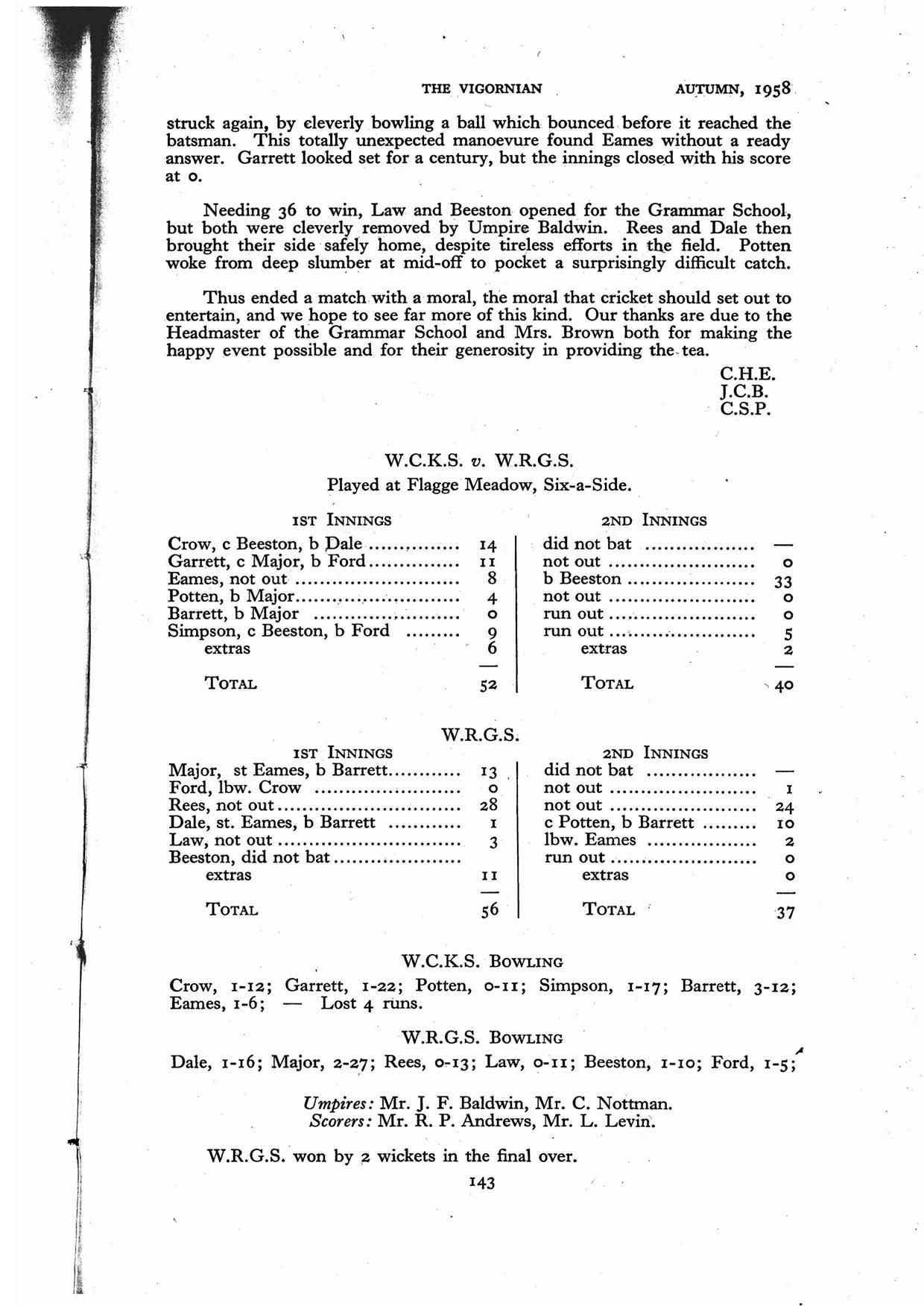
W.C.K.S. v. W.R.G.S.
Played at Flagge Meadow, Six-a-Side.
W.C.K.S. BOWLING
Crow, 1-12; Garrett, 1-22; Potten, 0-11; Simpson, 1-17; Barrett, 3-12; Eames, 1-6; Lost 4 rtms;
W.R.G.S. BOWLING
Dale, 1-16; Major, 2-2.7; Rees, 0,.13; Law, 0-11; Beeston, 1-10; Ford, 1-5;
Umpires: Mr. J. F. Baldwin, Mr. C. Nottman. Scorers: Mr. R. P. Andrews, Mr. L. Levin'.
W.R.G.S. won bY2 wickets in the final over.
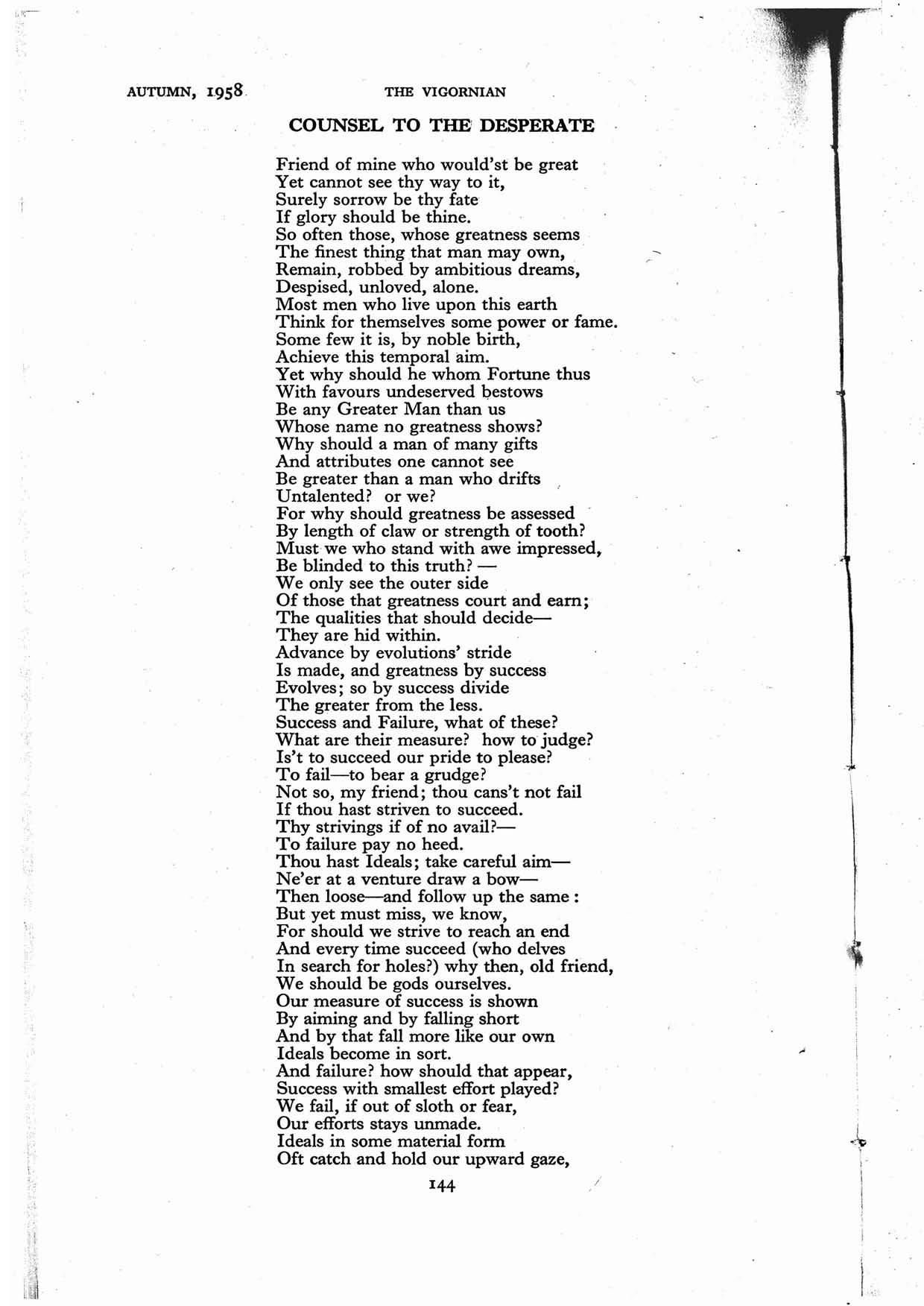
COUNSEL TO THE DESPERATE
Friend of mine who would'st be great Yet cannot see thy way to it, Surely sorrow be thy fate If glory should be thine.
So often those, whose greatness seems The finest thing that man may own, ' Remain, robbed by ambitious dreams, Despised, unloved, alone.
Most men who live upon this earth Think for themselves some power or fame. Some few it is, by noble birth, Achieve this temporal aim.
Yet why should he whom Fortune thus With favours undeserved bestows Be any Greater Man than 'us Whose name no greatness shows? Why should a man of many gifts And attributes one cannot see Be greater than a man who drifts Untalented? or we?
For why should greatness be assessed By length of claw or strength of tooth? Must we who stand with awe impressed, , Be blinded to this truth?We only see the outer side Of those that greatness court and earn; The qualities that should decideThey are hid within.
Advance by evolutions' stride Is made, and greatness by success Evolves; so by success divide The greater from the less.
Success and Failure, what of these? What are their measure? how to judge? Is't to succeed our pride to please? To fail-to bear a grudge?
Not so, my friend; thou cans't not fail If thou hast striven to succeed. Thy strivings if of no avail?To failure pay no heed. Thou hast Ideals; take careful aimNe' er at a venture draw a bowThen loose-and follow up the same: But yet must miss, we know, For should we strive to reach an end And every time succeed (who delves In search for holes?) why then, old friend, We should be gods ourselves.
Our measure of success is shown By aiming and by falling short And by that fall more like our own Ideals become in sort. And failure? how should that appear, Success with smallest effort played? We fail, if out of sloth or fear, ' Our efforts stays unmade. Ideals in some material form
Oft catch and hold our upward gaze,
Then, soul arid body, swept by storm Of inspiration's blaze
Would'st have us make this form our own,. To have, to hold, release no more, !.-" And having taken, having known Th' Ideal becomes a sore. And yet to seem to fail would lead To darkest depths of desperation, Needlessly the soul would bleedPain without negation
E'en so, my friend, do not lose heart, Such needless wounds soft Tune soon heak "Then shalt be greater than thou art, Brought close to thine Ideals. I know that these Ideals are high And thine apparent failure then Would seem, when thou'rt moved to try, Much worse than other men. Be not deceived, it is not soWhen aiming high great is the stress, By falling short thou faU'st not low And great is thy success. Friend of mine who would'st be great Yet cannot see thy way to it, Let not sorrow be thy fate, For greatness shaH be thine.
"PARLEZ-VOUS FRANCAls "
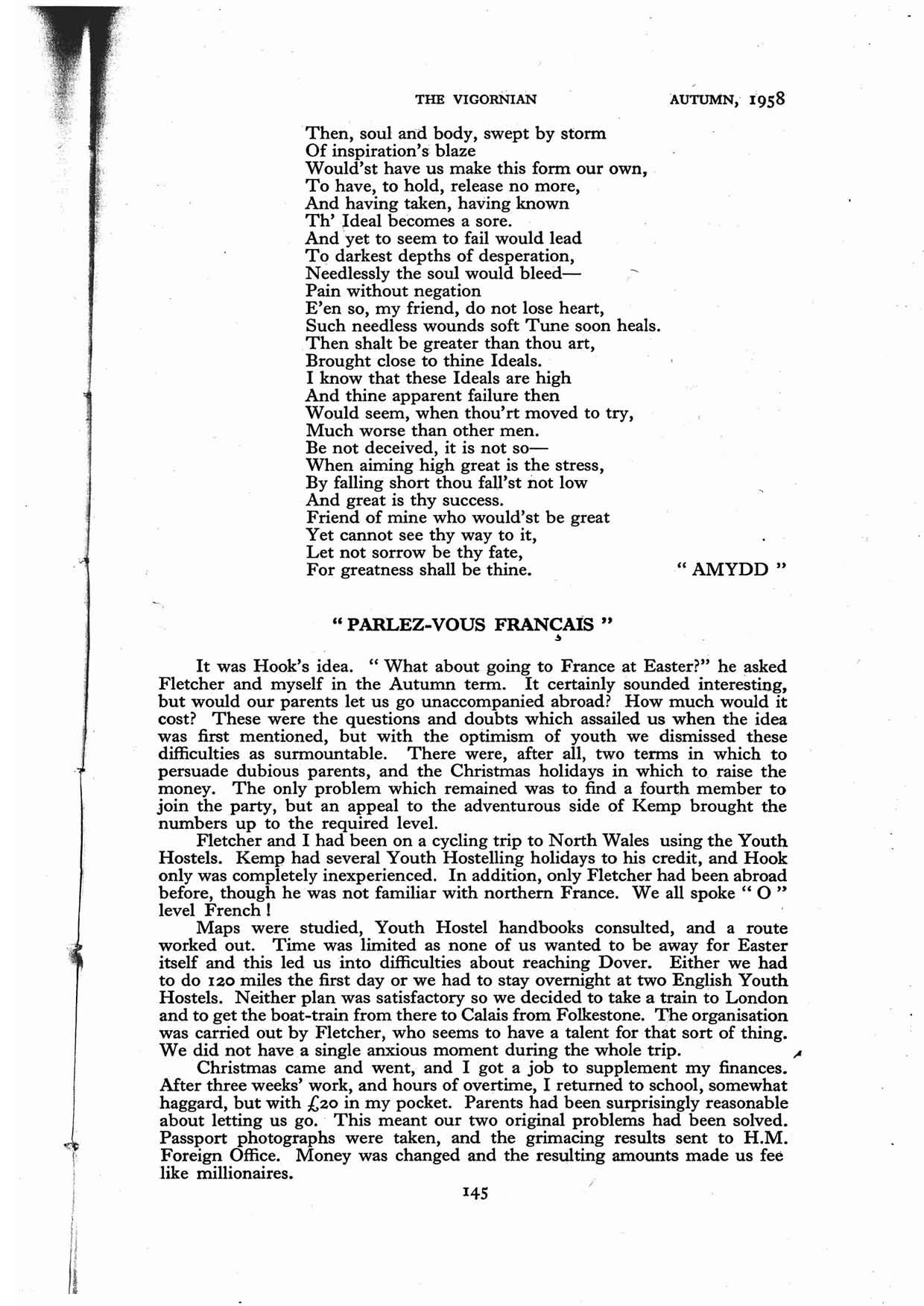
" AMYDD "
It was Hook's idea. "What about going to France at Easter?" he asked Fletcher and myself in the Autumn term. It certainly sounded interesting, but would our parents let us go unaccompanied abroad? How much would it cost? These were the questions and doubts which assailed us when the idea was first mentioned, but with the optimism of youth we dismissed these difficulties as surmountable. There were, after an, two terms in which to persuade dubious parents, and the Christmas holidays in which to raise the money. The only problem which remained was to find a fourth member to join the party, but an appeal to the adventurous side of Kemp brought the numbers up to the required leveL
Fletcher and I had been on a cycling trip to North Wales using the Youth Hostels. Kemp had several Youth Hostelling holidays to his credit, and Hook only was completely inexperienced. In addition, only Fletcher had been abroad before, though he was not familiar with northern France. We an spoke " 0 " level French I
Maps were studied, Youth Hostel handbooks consulted, and a route worked out. Time was limited as none of us wanted to be away for Easter itself and this led us into difficulties about reaching Dover. Either we had to do 120 miles the first day or we had to stay overnight at two English Youth Hostels. Neither plan was satisfactory so we decided to take a train to London and to get the boat-train from there to Calais from Folkestone. The organisation was carried out by Fletcher, who seems to have a talent for that sort of thing. We did not havea single anxious moment during the whole trip. ,IChristmas came and went, and I got a job to supplement my finances. Mter three weeks' work, and hours of overtime, I returned to school, somewhat haggard, but with £20 in my pocket. Parents had been surprisingly reasonable about letting us go. This meant our two original problems had been solved. Passport photographs were taken, and the grimacing results sent to H.M. (, ) Foreign Office. Money was changed and the resulting amounts made us fee like millionaires. !
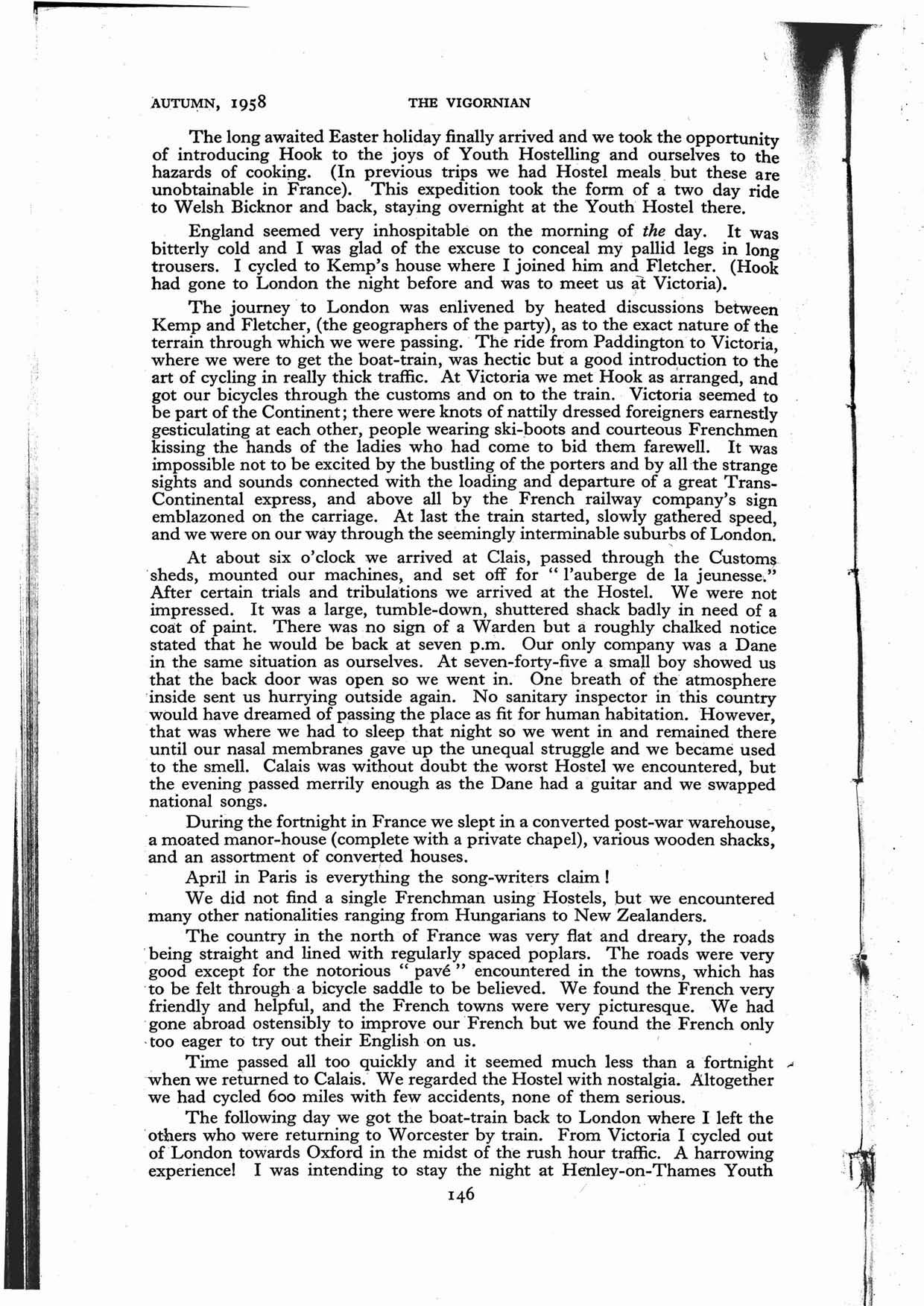
THE VIGORNIAN
The long awaited Easter holiday finally arrived and we took the opportunity of introducing Hook to the joys of Youth Hostelling and ourselves to the hazards of cooking. (In previous trips we had Hostel meals. but these are unobtainable in France). This expedition took the form of a two day ride to Welsh Bicknor and back, staying overnight at the Youth Hostel there.
England seemed very inhospitable on the morning of the day. It was bitterly cold and I was glad of the excuse to conceal my pallid legs in long trousers. I cycled to Kemp's house where I joined him and Fletcher. (Hook had gone to London the night before and was to meet us Victoria).
The journey' to London was enlivened by heated discussions between Kemp and Fletcher, (the geographers of the party), as to the exact nature of the terrain through which we were passing. The ride from Paddington to Victoria where we were to get the boat-train, was hectic but a good introduction to the art of cycling in really thick traffic. At Victoria we met' Hook as arranged, and got our bicycles through the customs and on to the train. Victoria seemed to be part of the Continent; there were knots of nattily dressed foreigners earnestly gesticulating at each other, people wearing ski-boots and courteous Frenchmen kissing the hands of the ladies who had come to bid them farewell. It was impossible not to be excited by the bustling of the porters and by all the strange sights and sounds connected with the loading and departure of a great TransContinental express, and above all by the French railway company's sign emblazoned on the carriage. At last the train started, slowly gathered speed, and we were on our way through the seemingly interminable of London.
At about six o'clock we arrived at Clais, passed through the sheds, mounted our machines, and set off for "l'auberge de la jeunesse,." Mter certain trials and tribulations we arrived at the Hostel. We were not impressed. It was a large, tumble-down, shuttered shack badly in need of a coat of paint. There was no sign of a Warden but a roughly chalked notice stated that he would be back at seven p.m. Out only company was a Dane in the same situation as ourselves. At seven-forty-five a small boy showed us that the back door was open so we went in. One breath of the atmosphere 'inside sent us hurrying outside again. No sanitary inspector in this country wbuld have dreamed of passing the place as fit for human habitation. However, that was where we had to sleep that night so we went in and remained there until our nasal membranes gave up the unequal struggle and we became used to the smell. Calais was without doubt the worst Hostel we encountered, but the evening passed merrily enough as the Dane had a guitar and we swapped national songs.
During the fortnight in France we slept in a converted post-war warehouse, a moated manor-house (complete with a private chapel), various wooden shacks, and an assortment of converted houses.
April in Paris is everything the song-writers claim!
We did not find a single Frenchman using Hostels, but we encountered many other nationalities ranging from Hungarians to New Zealanders.
The country in the north of France was very flat and dreary, the roads ·being straight and lined with regularly spaced poplars. The roads were very good except for the notorious" pave "encountered in the towns, which has ·to be felt through· a bicycle saddle to be believed. We found the French very friendly and helpful, and the French towns were very picturesque. We had gone abroad ostensibly to improve our French but we found the French only -too eager to try out their English on us. ;
Time passed all too quickly and it seemed much less than a fortnight ;I when we returned to Calais. We regarded the Hostel with nostalgia. Altogether we had cycled 600 miles with few accidents, none of them serious.
The following day we got the boat-train back to London where I left the 'others who were returning to Worcester by train. From Victoria I cycled out of London towards Oxford in the midst of the rush hour traffic. A harrowing experience! I was intending to stay the night at Henley-on- Thames Youth
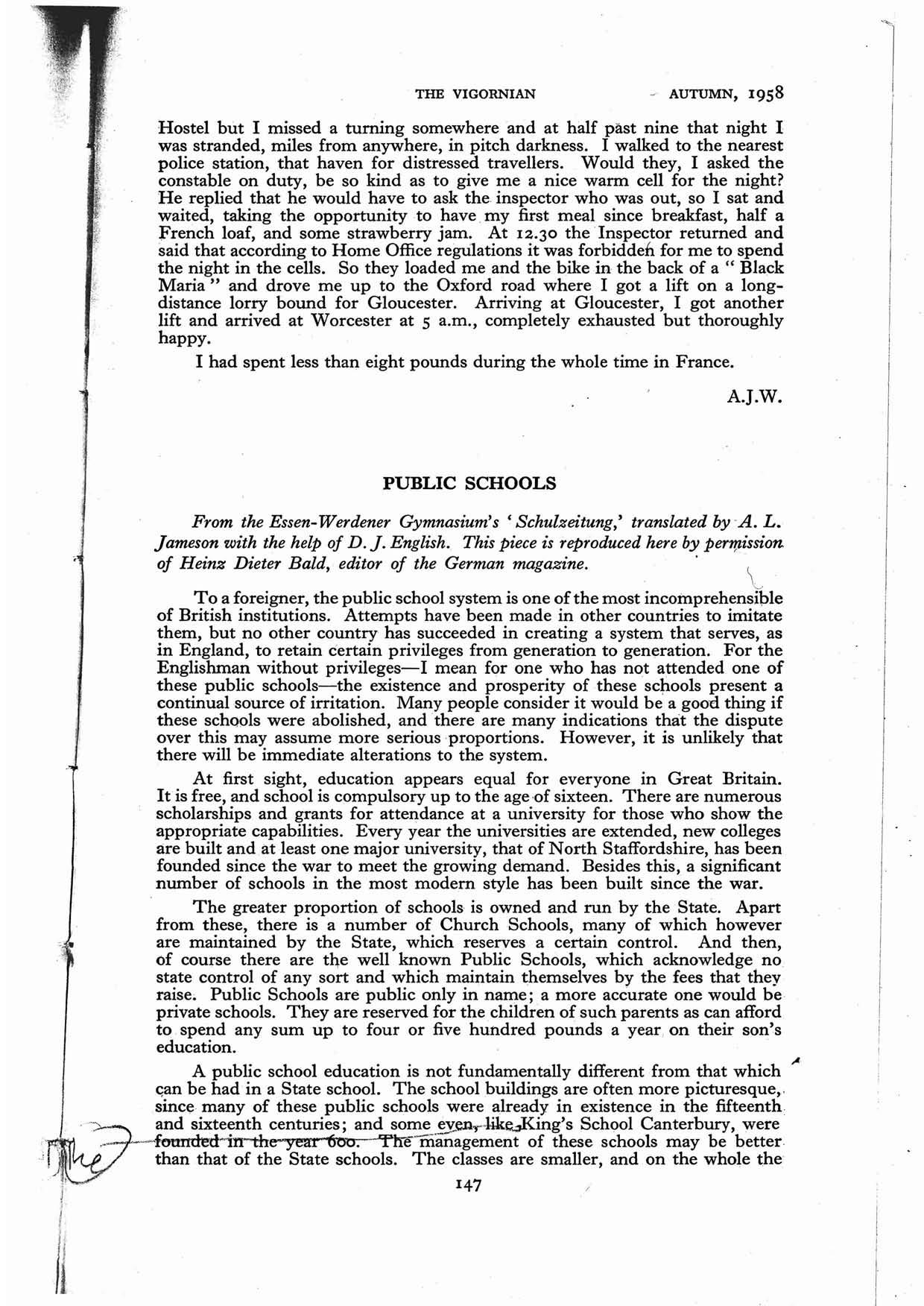
Hostel but I missed a turning somewhere and at half past nine that night I was stranded, miles from anywhere, in pitch darkness. I walked to the nearest police station, that haven for distressed travellers. Would they, I asked the constable on duty, be so kind as to give me a nice warm cell for the night? He replied that he would have to ask the inspector who was out, so I sat and waited, taking the opportunity to have, my first meal since breakfast, half a french loaf, and some strawberry jam. At 12.30 the Inspector returned and .' said that according to Home Office regUlations it was forbidden for me to spend the night in the cells. So they loaded me and the bike in the back of a " Black Maria" and drove me up to the Oxford road where I got a lift on a longdistance lorry bound for Gloucester. Arriving at Gloucester, I got another lift and arrived at Worcester at 5 a.m., completely exhausted but thoroughly happy.
I had spent less than eight pounds during the whole time in France.
PUBLIC SCHOOLS
From the Essen-Werdener Gymnasium's' Schulzeitung,' translated by'A. L. ]ameson with the help of D.]. English. This piece is reproduced here by perrrzission of Heinz Dieter Bald, editor of the German magazine.
To a foreigner, the public school system is one of the most incoinprehensiple of British institutions. Attempts have been made in other countries to imitate them, but no other country has succeeded in creating a system that serves, as in England, to retain certain privileges from generation to For the Englishman without privileges-I mean for one who has not attended one of these public schools-the existence and prosperity of these scpools present a continual source of irritation. Many people consider it would be a good thing if these schools were abolished, and there are many indications that the dispute over this may assume more serious proportions. However, it is unlikely that there will be immediate alterations to the system.
At first sight, education appears equal for everyone in Great Britain. It is free, and school is compulsory up to the age of sixteen. There are numerous scholarships and grants for attendance at a university for those who show the appropriate capabilities. Every year the universities are extended, new colleges are built and at least one major university, that of North Staffordshire, has been founded since the war to meet the growing demand. Besides this, a significant number of schools in the most modem style has been built since the war.
The greater proportion of schools is owned and run by the State. Apart from these, there is a number of Church Schools, many of which however are maintained by the State, which reserves a certain control. And then, of course there are the well known Public Schools, which acknowledge, no state control of any sort and which maintain themselves by the fees that they, Public Schools are public only in name; a more accurate one would be private schools. They are reserved for the children of such parents as can afford to spend any sum up to four or five hundred pounds a year, on their son's education.
A public school education is not fundamentally different from that which be had in a State school. The school buildings are often more picturesque" since m, any of these public schO,OI,S. were already in ,exist,ence in the fifteenth }. and sixteenth centuries; and some eVeJlr·.tike.;King's School Canterbury, were ;;. . .- ' year 600. --Ttr'e'mW;agement of these schools may be better .s, )', than that of the State schools. The classes are smaller, and on the whole the { ,
"A,
A.J.W.
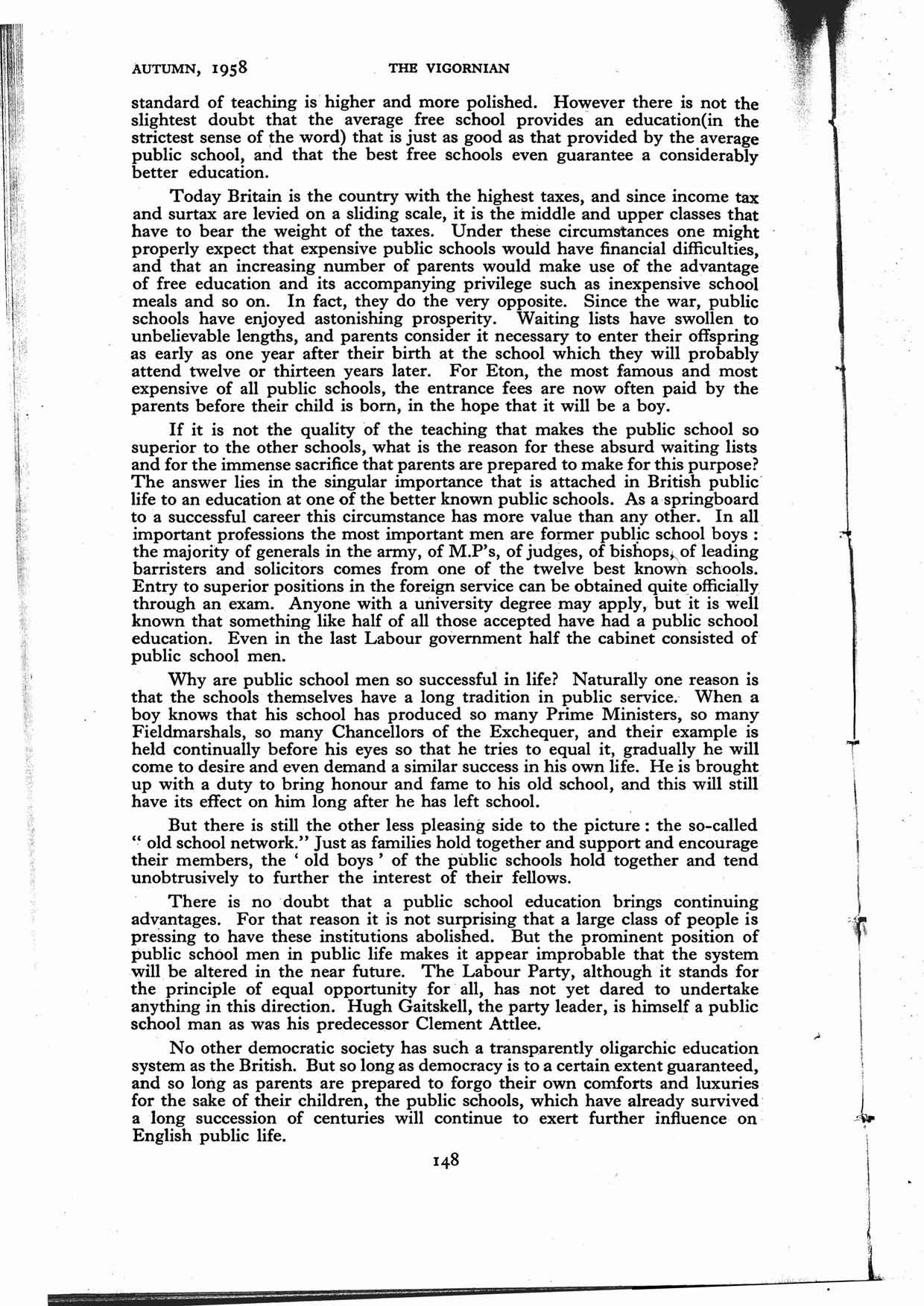
standard of teaching is higher and more polished. However there is not the slightest doubt that the average free school provides' an education(in the strictest sense of the word) that is just as good as that provided by the average public school, and that the best free schools even guarantee a considerably better education.
Today Britain is the country with the highest taxes, and since income tax and surtax are levied on a sliding scale, it is the middle and upper classes that have to bear the weight of the taxes. Under these circumstances one might properly expect that expensive public schools would have financial difficulties, and that an increasing number of parents would make use of the advantage of free education and its accompanying privilege such as inexpensive school meals and so on. In fact, they do the very opposite. Since the war, public schools have enjoyed astonishing prosperity. Waiting lists have swollen to unbelievable lengths, and parents consider it necessary to enter their offspring as early as one year after their birth at the school which they will probably attend twelve or thirteen years later. For Eton, the most famous and most expensive of all public schools, the entrance fees are now often paid by the parents before their child is born, in the hope that it will be a boy.
If it is not the quality of the teaching that makes the public school so superior to the other schools, what is the reason for these absurd waiting lists and for the immense sacrifice that parents are prepared to make for this purpose? The answer lies in the singular importance that is attached in British public' life to an education at one of the better known public schools. As a springboard to a successful career this circumstance has more value than any other. In all important professions the most important men are former school boys :' the majority of generals in the army, of M.P's, of judges, of of leading barristers and solicitors comes from one of the twelve best known schools. Entry to superior positions in the foreign service can be obtained quite_ officially through an exam. Anyone with a university degree may apply, but it is well known that something like half of all those accepted have had a public school education. Even in the last Labour government half the cabinet consisted of public school men.
I" , Why are public school men so successful in life? Naturally one reason is that the schools themselves have a long tradition in public service. When a boy knows that his school has produced so many Prime Ministers, so many Fieldmarshals, so many Chancellors of the Exchequer, and their example is held continually before his eyes so that he tries to equal it, gradually he will come to desire and even demand a similar success in his own life. He is brought up with a duty to bring honour and fame to his old school, and this will still
have its effect on him long after he has left school.
But there is still the other less pleasing side to the picture: the so-called " old school network." Just as families hold together and support and encourage their members, the ' old boys' of the public schools hold together and tend unobtrusively to further the interest of their fellows.
There is no doubt that a public school education brings continuing advantages. For that reason it is not surprising that a large class of people is
pressing to have these institutions abolished. But the prominent position of public school men in public life makes it appear improbable that the system will be altered in the near future. The Labour Party, although it stands for the principle of equal opportunity for' all, has not yet dared to undertake anything in this direction. Hugh Gaitskell, the party leader, is himself a public school man as was his predecessor Clement Attlee.
No other democratic society has such a transparently oligarchic education system as the British. But so long as democracy is to a certain extent guaranteed, and so long as parents are prepared to forgo their own comforts and luxuries , for the sake of their children, the public schools, which have already survived' a long succession of centuries will continue to exert further influence on, English public life.
THE COUNTRY SIDE IN FEBRUARY, OR SOMETHING TO LOOK FORWARD TO
The Cold west wind blew the freezing rain drops into my face as I ploughed my way across the thick mud of the orchard. After battling with the elements , for what seemed an eternity I reached a stile. Part of this structure was broken and I stumbled heavily into a muddy puddle. Picking myself up with a curse, • I ran across the comparative firmness of a meadow, my sodden shoes squelching noisily on the wet grass. A climb over another stile brought rile to a raised footpath on one side of which was a pond and 011 the other a deep ditch full of water and bicycle wheels. Here walking was necessary, not only because of the imminent danger of cold immersion but because of a jungle of assorted brambles and thorns strewn across the path. After thus progressing for thirty yards my progress was arrested by a wooden fence. On to this I climbed and surveyed the intervening gap between it and the next fence. ,Although only about fifteen feet across, it contained the most formidable quantity of water I had yet encountered. The combined efforts of the pond and ditch had produced a pool of at least one foot of dirty water with an infinite profundity of mud beneath. I braced myself for the plunge, then jumped. The cold water sent a chill through my legs while globules of rich, fertile mud spattered my off-white garments in a variety of places. Ploughing forward through the' mire. r grabbed the other fence and hauled my weary limbs over. 1 still had to pass through another orchard ere I could gain the road. This orchard, "unlike the previous one, contained grass, but what a hollow mockery 1t proved to be. Small pools of water anything up to six inches deep lay everywhere, while even the firmest ground was anything but firm. The full force wind retarded my progress to a steady walking pace and after trying vainly to increase my velocity, I caught my foot in a root and fell down heavily; The situation, although restful, was lacking sadly in temperature to allow myself to remain there for long. Somehow I regained my feet and, already reminded of the folly of attempting to run, I set out at a sensible pace and soon reached the" fence--and the other side of the ocean. Pausing for a moment to adjust OIle of my shoes which had become detached at the heel in the Pacific, I jumped down on to the road-good firm ,road. Crossing the railway bridge I gathered speed and suddenly realized that there were only two miles to go.
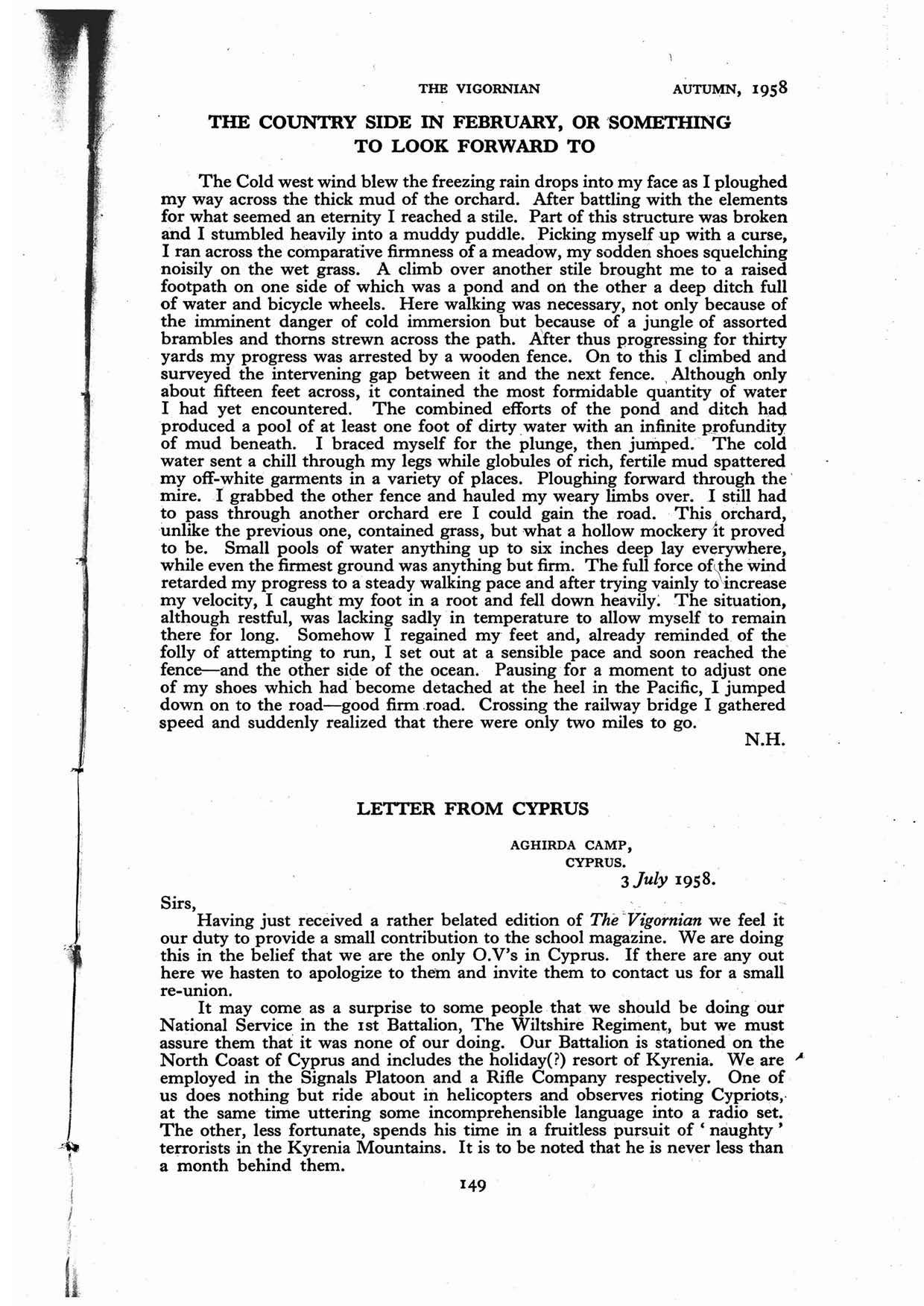
LETTER FROM CYPRUS
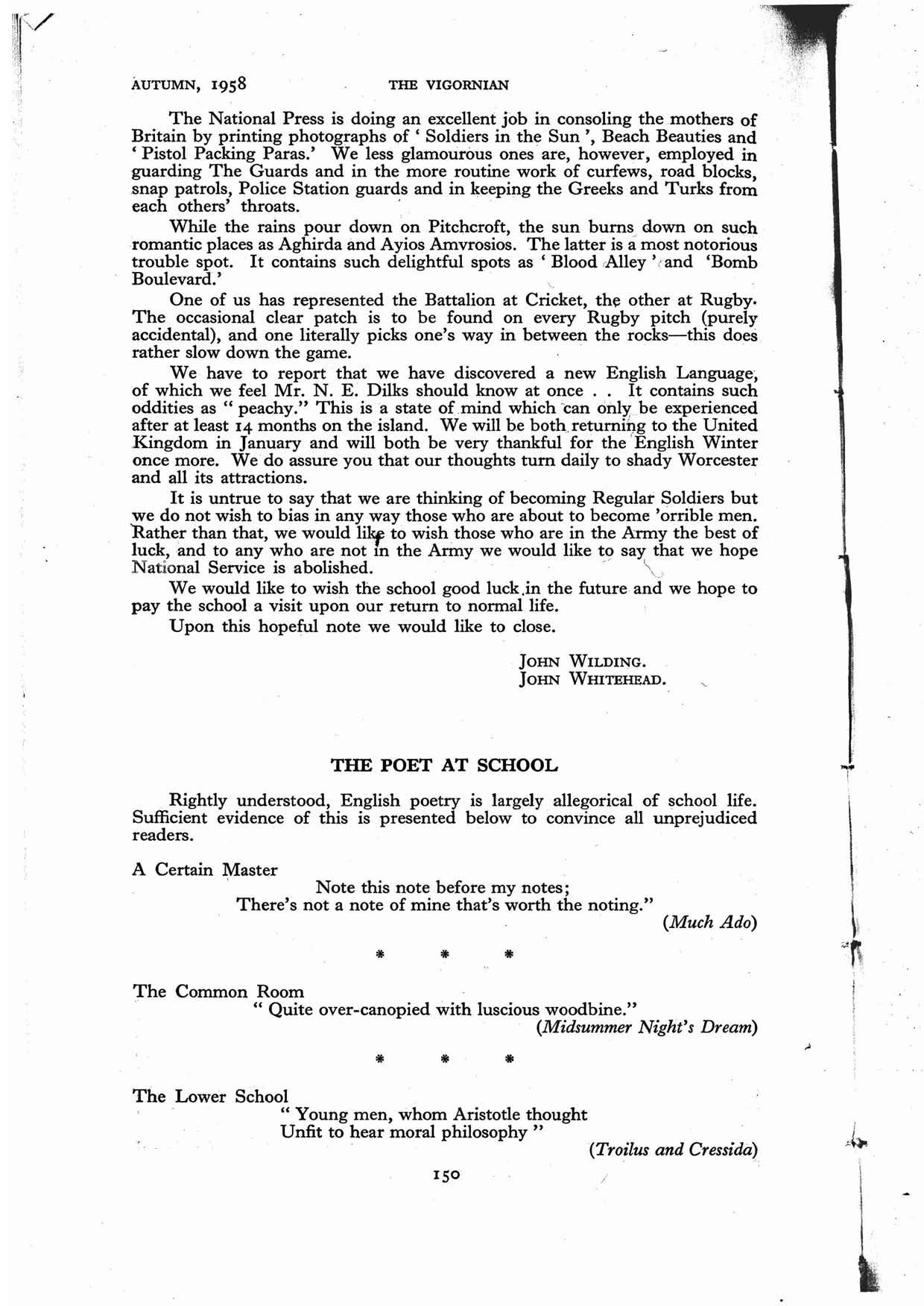
The National Press is doing an excellent job in consoling the mothers of Britain by printing photographs of ' Soldiers in the Sun " Beach Beauties and , Pistol Packing Paras.' We less glamourous ones are, however, employed in guarding The Guards and in the more routine work of curfews, road blocks, .snap patrols, Police Station guards and in keeping the Greeks and Turks from each others' throats.
While the rains pour down on Pitchcroft, the sun bums down on such romantic places as Aghirda and AyiosAmvrosios. The latter is amost notorious trouble spot. It contains such delightful spots as' Blood Alley 'tand 'Bomb Boulevard. '
One of us has represented the Battalion at Cricket, the other at Rugby. The occasional clear patch is to be found on every Rugby pitch (purely accidental), and one literally picks one's way in between the rocks-this does. rather slow down the game.
We have to report that we have discovered a new English Language, of which we feel Mr. N. E. Dilks should know at once.. It contains such oddities as " peachy." This is a state of mind which can only,be experienced after at least 14 months on the island. We will he bothretumil).g to the United Kingdom in January and will both be very thankful for the' English Winter once more. We· do assure you that our thoughts turn daily to shady Worcester and all its attractions.
It is untrue to say that we are thinking of becoming Regular Soldiers but we do not wish to bias in any way those who are about to become 'orrible men. Rather than that, we would likf to wish those who are in the Army the best of luck, ;and to any who are not In the Army we would like tg say that we hope National Service is abolished. . \;
We would like to wish the school good luck.in the future and we hope to pay the school a visit upon our return to normal life.
Upon this hopeful note we would like to close.
JOHN WILDING. JOHN WHITEHEAD.
THE POET AT SCHOOL
Rightly understood, English poetry is largely allegorical of school life. Sufficient evidence of this is presented below to convince all unprejudiced readers.
A Certain Master
Note this note before my notes; There's not a note of mine that's worth the noting." (Much Ado)
The Common Room " Quite over-canopied with luscious woodbine." . (Midsummer Night's Dream)
The Lower School " Young men, whom Aristotle thought Unfit to hear moral philosophy" (Troilus and Cressida)
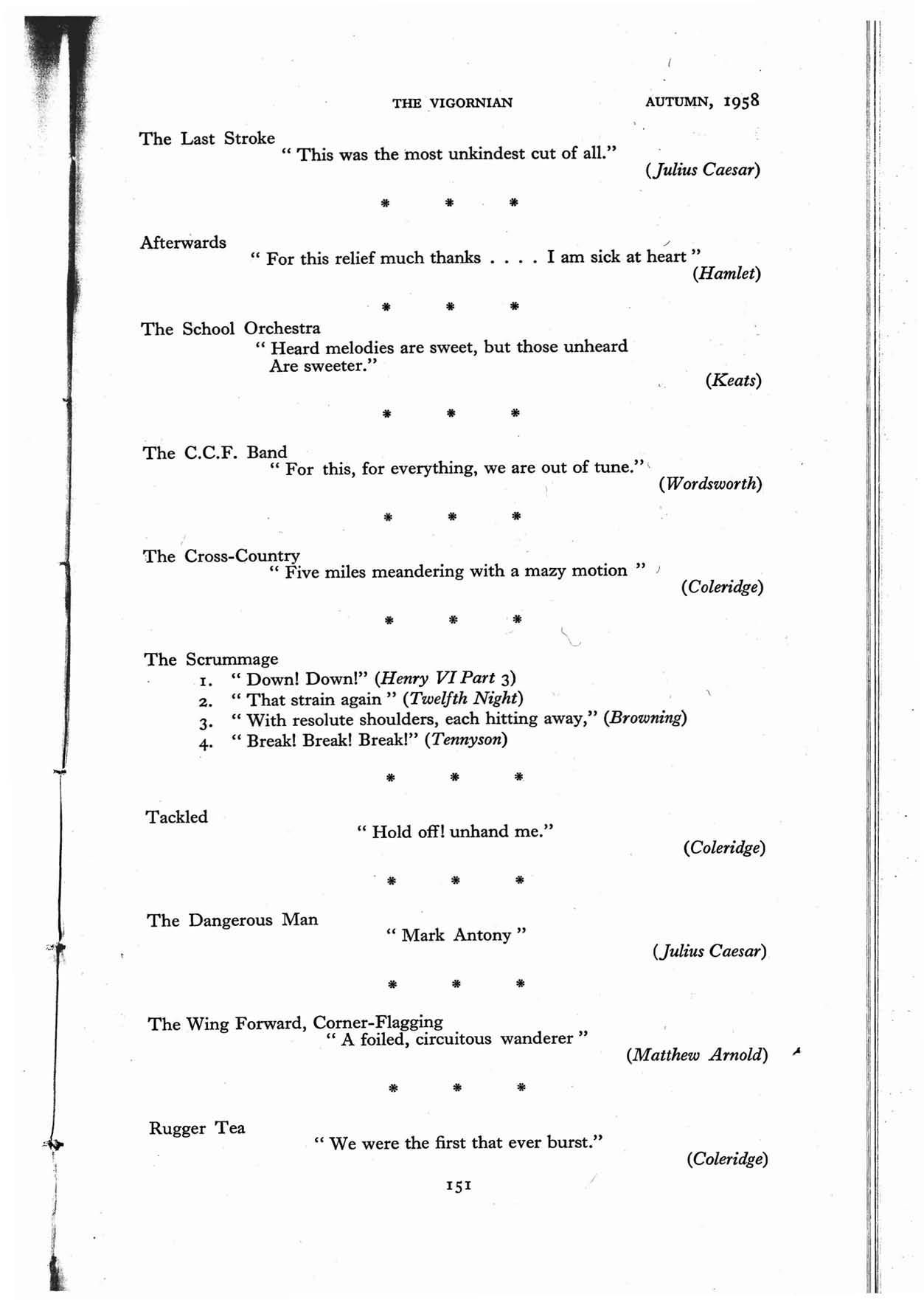
THE VIGORNIAN AUTUMN, 1958
The Last Stroke " This was the 'most unkindest cut of alL" (Julius Caesar)
MterWards ./ " For this relief much thanks I am sick at heart " (Hamlet)
The School Orchestra " Heard melodies are sweet, but those unheard Are sweeter." (Keats)
The C.C.F. Band " For this, for everything, we are out of tune." \ (Wordsworth)
The Cross-Country " Five miles meandering with a mazy motion " ) (Coleridge)
The Scrummage
I. "Down! Down!" (Henry VI Part 3)
2. "That strain again" (Twelfth Night)
3. "With resolute shoulders, each hitting away," (Browning)
4. "Break! Break! Break!" (Tennyson) -
I ! < Tackled " Hold off! unhand me." (Coleridge)
The Dangerous Man " Mark Antony " (Julius Caesar)
The Wing Forward, Corner-Flagging " A foiled, circuitous wanderer" (Matthew Arnold)
Rugger Tea " We were the first that ever burst." (Coleridge)
" I know a bank H (Midsummer Night's Dream) •
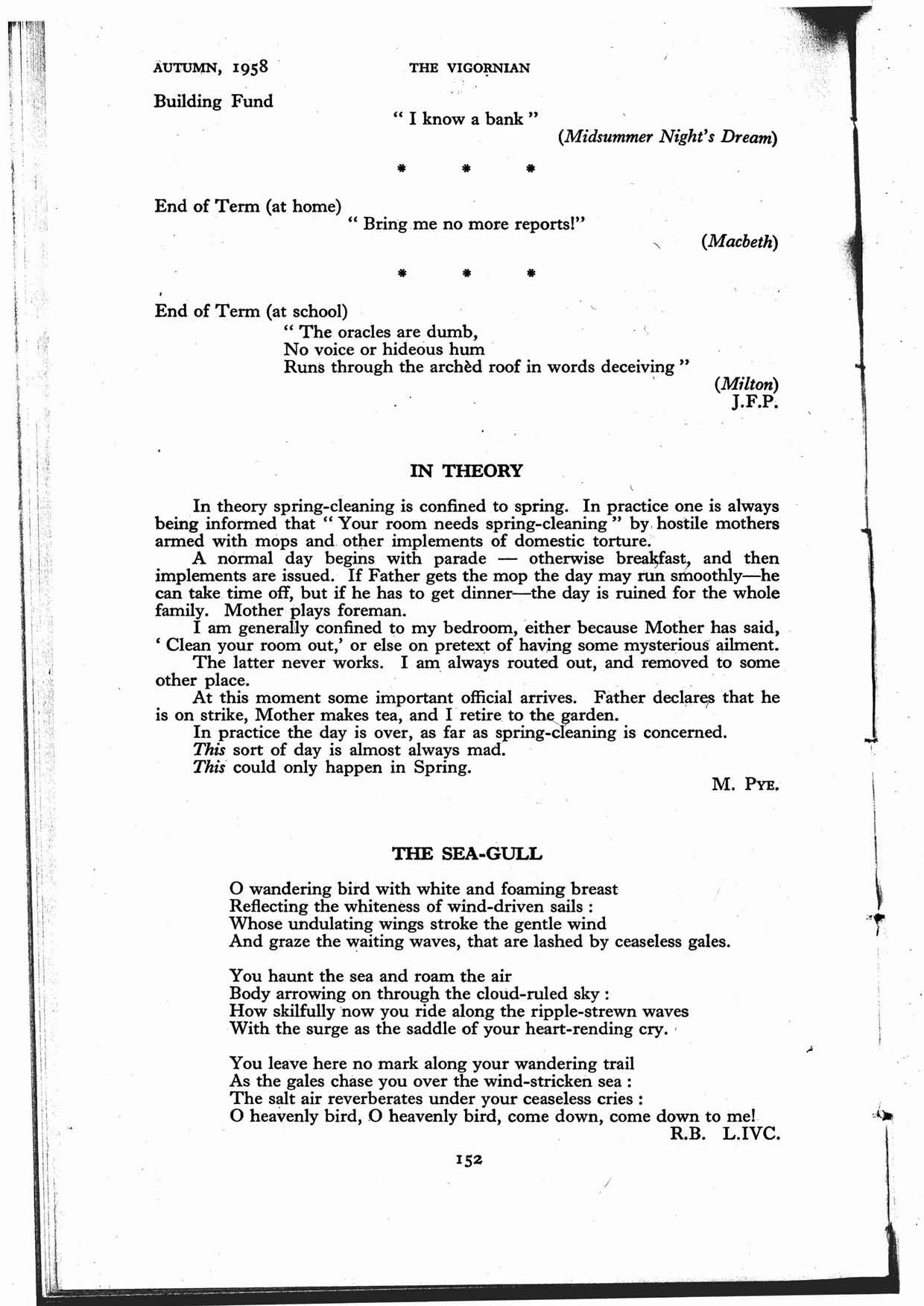
,
End of Term (at home)
" Bring me no more reports!" (Macbeth)
End of Term (at school)
" The oracles are dumb, • 1. No voice or hideous hum Runs through the arched roof in words H (Milton)
IN THEORY
In theory spring-cleaning is confined to spring. In practice one is always being informed that " Your room needs spring-cleaning" by, hostile mothers armed with mops and other implements of domestic . A normal .day begins with parade - otherwise and then Implements are Issued. If Father gets the mop the day may rtm smoothly-he can take time off, but if he has to get dinner-the day is ruined for the whole family. Mother· plays foreman.
I am generally confined to my bedroom, either because Mother has said, , Clean your room out,' or else on pretext of having some mysterious ailment. The latter never works. I am, always routed out, and removed to some other place. '
At this moment some important official arrives. Father dechmisthat he is on strike, Mother makes tea, and I retire to the"garden. In practice the day is over, as far as spring-cleaning is concerned. This sort of day is almost always mad. This could only happen in Spring. M. PYE.
THE SEA-GULL
o wandering bird with white and foaming breast Reflecting the whiteness of wind-driven sails: Whose undulating wings stroke the gentle wind And graze the waiting waves, that are lashed by ceaseless gales.
You haunt the sea and roam the air Body arrowing on through the cloud-ruled sky: How skilfully 'now you ride along ripple-strewn waves With the surge as the saddle of your heart-rending cry. '
You leave here no mark along your wandering trail As the gales chase you over the wind-stricken sea : The salt air reverberates under your ceaseless cries : o heavenly bird, 0 heavenly bird, come down, come down to me!
R.B. L.IVC.
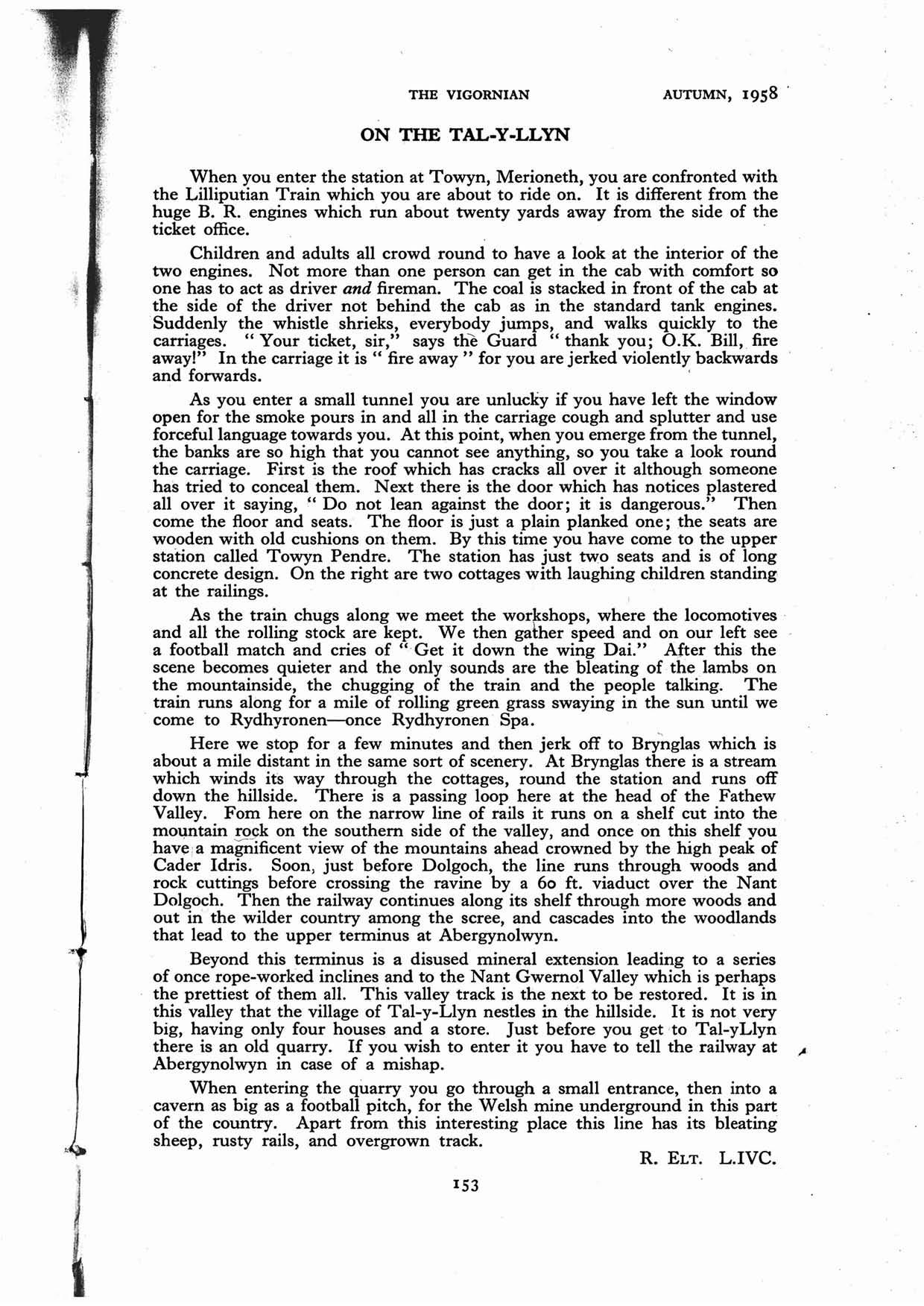
ON THE TAL-Y-LLYN
When you enter the station at Towyn, Merioneth, you are confronted with the Lilliputian Train which you are about to ride on. It is different from the huge B. R. engines which run about twenty yards away from the side of the ticket office.
Children and adults all crowd round to have a look at the interior of the two engines. Not more than one person can get in the cab with comfort so one has to act as driver and fireman. The coal is stacked in front of the cab at the side of the driver not behind the cab as in the standard tank engines. Suddenly the whistle shrieks, everybody jumps, and walks quickly to the .- carriages. "Your ticket, sir," says the Guard "thank you; O.K. Bill, fire away!" In the carriage it is " fire away" for you are jerked violently backwards and forwards.
As you enter a small tunnel you are unlucky if you have left the window open for the smoke pours in and all in the carriage cough and splutter and use forceful language towards you. At this point, when you emerge from the tunnel, the banks are so high that you cannot see anything, so you take a look round the carriage. First is the roof which has cracks all over it although someone has tried to conceal them. Next there is the door which has notices plastered all over it saying, " Do not lean against the door; it is dangerous." Then come the floor and seats. The floor is just a plain planked one; the seats are wooden with old cushions on them. By this time you have come to the upper station called Towyn Pendre. The station has just two seats and is of long concrete design. On the right are two cottages with laughing children standing· at the railings.
As the train chugs along we meet the workshops, where the locomotives ' and all the rolling stock are kept. We then gather speed and on our left see a football match and cries of "Get it down the wing Dai." AJter this the scene becomes quieter and the only sounds are the bleating of the ,lambs on the mountainside, the chugging of the train and the people talking. The train runs along for a mile of rolling green grass swaying in the sun until we come to Rydhyronen-once Rydhyronen Spa.
Here we stop for a few minutes and then jerk off to Brynglas which is about a mile distant in the same sort of scenery. At Brynglas there is a stream which winds it's way through the cottages, round the station and runs off down the hillside. There is a passing loop here at the head of the Fathew Valley. Fom here on the narrow line of rails it runs on a shelf cut into the on the southern side of the valley, and once on this shelf you have; a magnificent view of the mountains ahead crowned by the high peak of Cad er Idris. Soon, just before Dolgoch, the line runs through woods and rock cuttings before crossing the ravine by a 60 ft. viaduct over the Nant Dolgoch. Then the railway continues along its shelf through more woods and out in: the wilder country among the scree, and cascades into the woodlands that lead to the upper terminus at Abergynolwyn.
Beyond this terminus is a disused mineral extension leading to a series of once rope-worked inclines and to the Nant Gwernol Valley which is perhaps the prettiest of them all. This valley track is the next to be restored. It is in this valley that the village of Tal-y-Llyn nestles in the hillside. It is not very big, having only four houses and a store. Just before you get ,to Tal-yLlyn there is an old quarry. If you wish to enter it you have to tell the railway at ,AAbergynolwyn in case of a mishap.
When entering the quarry you go through a small entrance, then into a cavern as big as a football pitch, for the Welsh mine underground in this part of the country. Apart from this interesting place this line has its bleating sheep, rusty rails, and overgrown track.
R. ELT. L.IVC.
THE VIGORNIAN DEATH AND LIFE
Falling, falling, falling fast ThrQugh a hybrid, crazy doom; Under the earth, Over the sky, Up, up, up falling 'Twixt the many-starred colours Of Death. The three Good Devils whose place the three Bad Angels overtake, Driving them and me o'er fair, Fair Death, Death whither none may return, Death all must go unto Dreaded Life.
CONVOY ATTACK·
And thus burning, twisting and turning The roaring bomber sweeps over the ships Their chattering guns avidly yearning Belch out a lead hail that quickly rips Into its belly.
Up to the skies that are stained with the dyes Of its weaving, wavering, smoking path The bellowing bird on the wind briefly lies Before trailing straight as a staff A Down to the sea. ') r
The guns slowly cease, bringing a peace Rejected by the rage of the plane's last flight Cut off at last by the seething fleece Of shuddering water choking the might Of an animal fury.
The others turn tail, thrashed by the flail Of vengeful bullets and shattering shell Clears from the convoy the thick, reeking veil Caused by the bombs as they noisily fell Wide of their mark.
IN MEMORIAM
o Death! The thief of life and happiness That claims from all an everlasting tribute, Why bring such sadness to our homes? We suffer often from the fatal blows Which freely fall upon our ordered lives. o Death! By those that live Thy curse is feared above all else. But those who into peaceful pastures pass May find relief from agonies of life, And welcome longingly its calm abode. o Death! Each soul you claim I tself breaks many hearts with hopeless longing. Why do we mourn thus for our absent friends? Their lot inevitable is indeed their prize. We pity not THEIR state, SELF-pity reigns supreme.
J. PETERSSEN
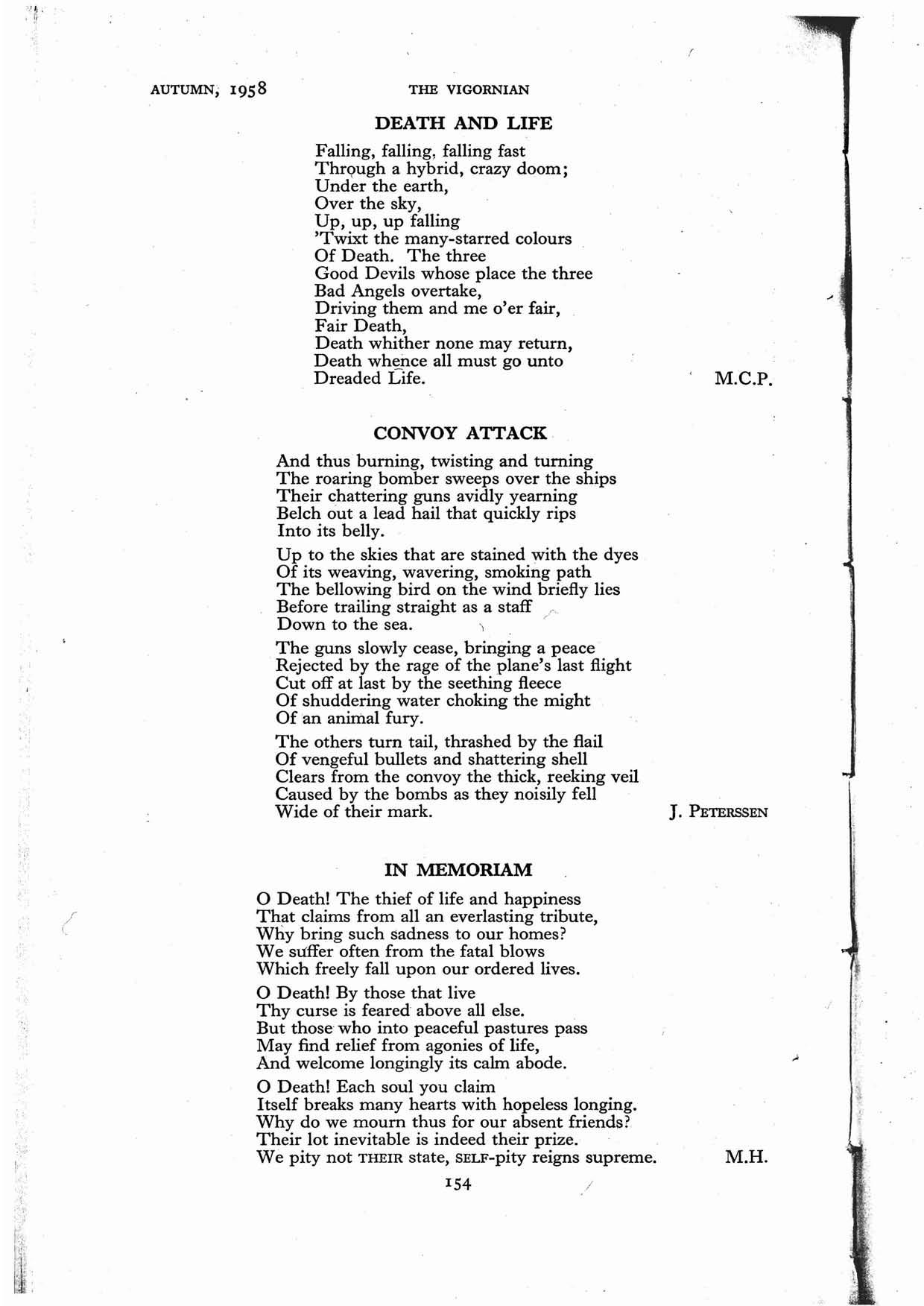
M.H.
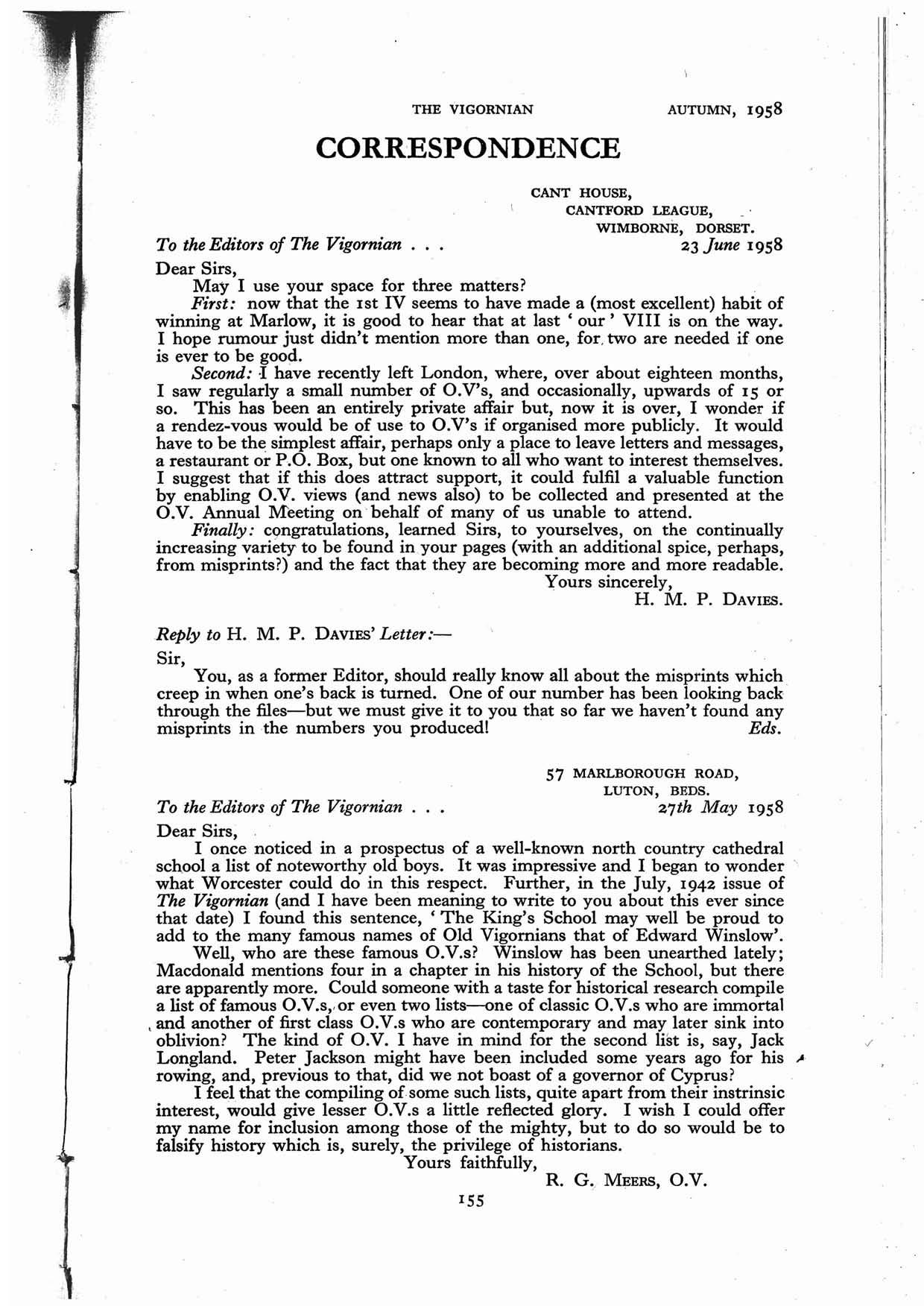
CORR,ESPONDENCE
CANT HOUSE, CANTFORD LEAGUE, WIMBORNE, DORSET.
To the Editors of The Vigornian .. • 23 June 1958
Dear Sirs,
May I use your space for three matters?
First: now that the 1st IV seems to have made a (most excellent) habit of winning at Marlow, it is good to hear that at last' our' VIII is on the way. I hope rumour just didn't mention more than one, for, two are needed if one is ever to be good.
Second: I have recently left London, where, over about eighteen months, I saw regularly a small number of O.V's, and occasionally, upwards of 15 or so. This has been an entirely private affair but, now it is over, I wonder if a rendez-vous would be of use to O.V's if organised more publicly. It would have to be the simplest affair, perhaps only a place to leave letters and messages, a restaurant or P.O. Box, but one known to all who want to interest themselves. I suggest that if this does attract support, it could fulfil a valuable function by enabling O.V. views (and news also) to be collected and presented at the O.V. Annual Meeting on behalf of many of us unable to attend.
Finally: cgngratulations, learned Sirs, to yourselves, on the continually increasing variety to be found in your pages (with an additional spice, perhaps, from misprints?) and the fact that they are becoming more and more readable. Yours sincerely, H. M. P. DAVIES.
Reply to H. M. P. DAVIES'Letter:
Sir,
You, as a former Editor, should really know all about the misprints which creep in when one's back is turned. One of our number has been looking back through the files-but we must give it to you that so far we haven't found any misprints in the numbers you produced! Eds.
57 MARLBOROUGH ROAD, LUTON, BEDS.
To the Editors of The Vigornian ... 27th May 1958
Dear Sirs,
I once noticed in a prospectus of a well-known north country cathedral school a list of noteworthy old boys. It was impressive and I began to wonder what Worcester could do in this respect. Further, in the July, 1942 issue of The Vigornian (and I have been meaning to write to you about this ever since that date) I found this sentence, 'The King's School may well be proud to add to the many famous names of Old Vigornians that of Edward Winslow'. Well, who are these famous O.V.s? Winslow has been unearthed lately; Macdonald mentions four in a chapter in his history of the School, but there are apparently more. Could someone with a taste for historical research compile a list of famous O.V.s"or even two lists-one of classic O.V.s who are immortal l and another of first class O.V.s who are contemporary and may later sink into oblivion? The kind of O.V. I have in mind for the second list is, say, Jack ./ Longland. Peter Jackson might have beel) included some years ago for his "A, rowing, and, previous to that, did we not boast of a governor of Cyprus?
I feel that the compiling of some such lists, quite apart from their instrinsic interest, would give lesser O.V.s a little reflected glory. I wish I could offer my name for inclusion among those of the mighty, but to do so would be to falsify history which is, surely, the privilege of historians.
Yours faithfully,
R. G., MEERS, O.V.
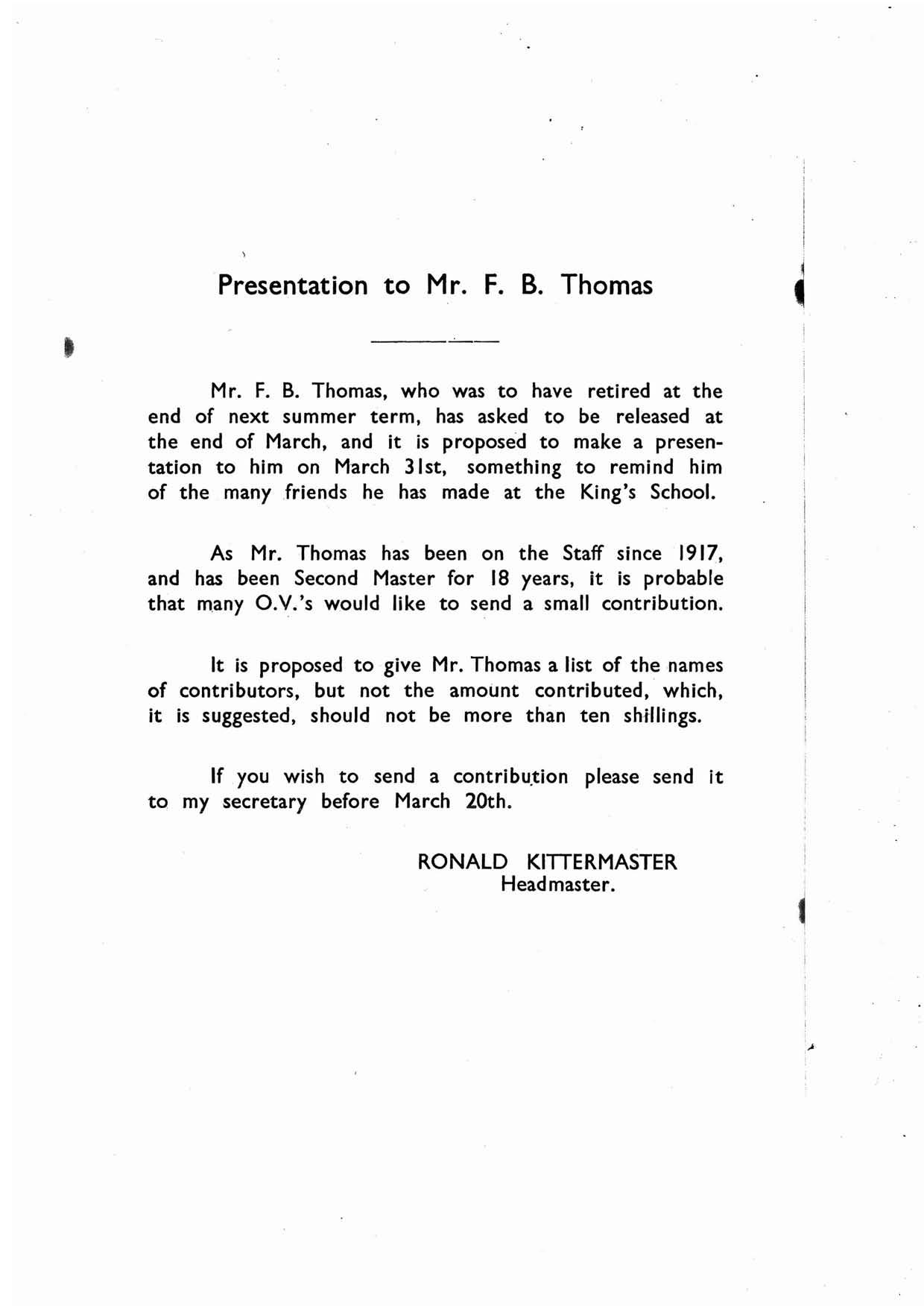
Presentation to Mr. F. B. Thomas
Mr. F. B. Thomas, who was to have reti red at the end of next summer term, has asked to be released at the end of March, and it is proposed to make a presentation to him on March 31st, something to remind him of the many .friends he has made at the King's School.
As Mr. Thomas has been on the Staff since 1917, and has been Second Master for 18 years, it is probable that m.any O.V.'s would like to send a small contribution.
It is proposed to give Mr. Thomas a list of the names of contributors, but not the amount contributed, which, it is suggested, should not be more than ten shflli ngs.
If you wish to send a contribu.tion please send it to my secretary before March 20th.
RONALD KITTERMASTER Headmaster.
